
























































































or 888-777-0216
• We uphold a Fiduciary Standard and work with clients on a fee-only basis.
• We do not receive commissions, kick-backs, or soft dollars from product sales, eliminating inherent conflicts of interest.
• Our team of professionals holds designations and degrees such as CFP®, CFA, CPA, MBA, and PhD.
• Charles received his MBA from the Kellogg School of Management - Northwestern University, his MA in Economics from WMU, and Executive Education from Harvard Business School and Columbia University.
• Ranked #1 on Barron’s list of America’s TOP Independent Advisors and is the highest ranked NAPFA-Registered Fee-Only Advisor on the list.*
• Ranked #4 in the nation on Forbes’ list of TOP Wealth Advisors and is the ONLY Independent Advisor in the top 10.**
Minimum investment: $1,000,000 in Michigan/$2,000,000 outside of Michigan. Assets under custody of LPL Financial, TD Ameritrade, and Charles Schwab.
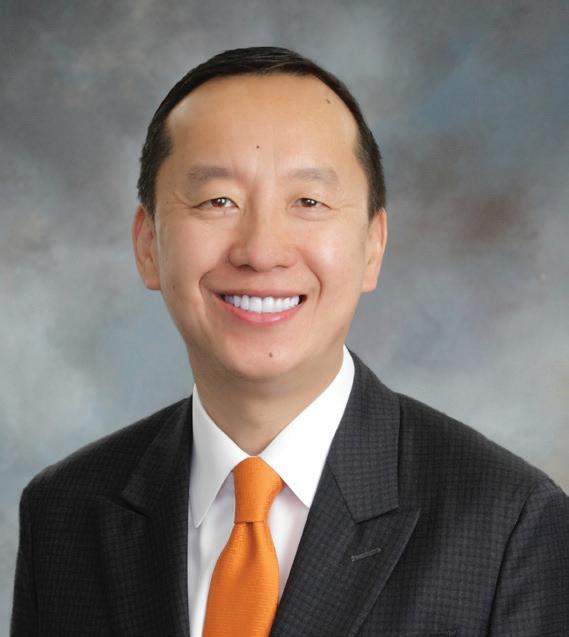

Garret and Dakota Porter of ActionGlow in Traverse City were recently featured in an article in Inc. highlighting SCORE’s 60th Anniversary Pitch Competition. The brothers and Traverse City natives are SCORE Traverse City alums. They founded the company, which manufactures LED lighting systems for sporting equipment, in 2012 when they were 13 and 16 years old. The duo also appeared on business reality television series “Shark Tank” in 2023. Find the article, “Life’s a Pitch. Score Wants To Give You $20,000 If You Get It Right,” at inc.com.
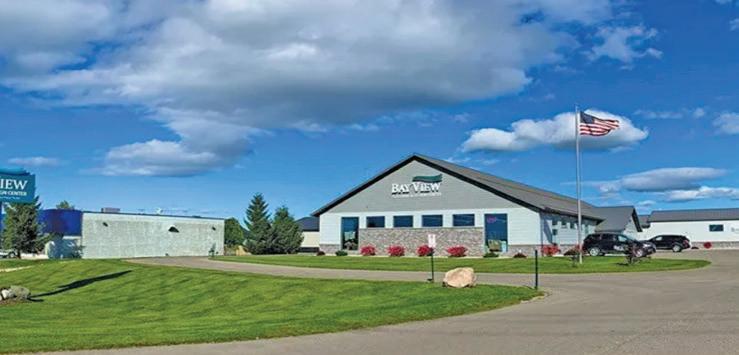
Bay View Flooring & Design Center in Traverse City is under new ownership. Jonathan and Margaret Woolfolk purchased the business from Tim and Kathy Hyland. They bring a mix of leadership and design expertise to the business, with plans to expand design services and add product lines along with providing an enhanced customer experience.

Ellibee Irrigation, Inc. has joined Old Mission Associates (OMA), LLC in Traverse City as its irrigation and lighting division. This allows OMA to oversee and execute an entire landscape project with most services available within the OMA company. These two family-owned local companies have been working together for more than a decade to provide outdoor services.
Matt Geib and Steve Scheppe, with nearly 30 years of combined real estate experience, have teamed up to launch Viewpoint Realty at 2308 US 31 North in Traverse City. Formerly with Century 21 Northland, the owners bring extensive background and experience to their new brokerage.
Detroit Mayor Mike Duggan will keynote the Economic Club of Traverse City (ECTC) Annual Dinner Sept. 20 at the Hagerty Center in Traverse City. Duggan’s address, “Detroit is Roaring Back,” will focus on progress made since Michigan’s largest city declared bankruptcy in 2013. First elected in 2014, Duggan is currently serving his third, four-year term, which will expire at the end of 2025. In recent years, the mayor’s success in landing major employers, such as Stellantis’ new Jeep assembly plant, GM’s Factory Zero, Ford’s Michigan Central campus and a new four million-square-foot Amazon fulfillment center, helped drive down Detroit’s unemployment rate to its lowest level in recorded history. The dinner and program is open to members and non-members of the ECTC. Visit tceconclub.com.
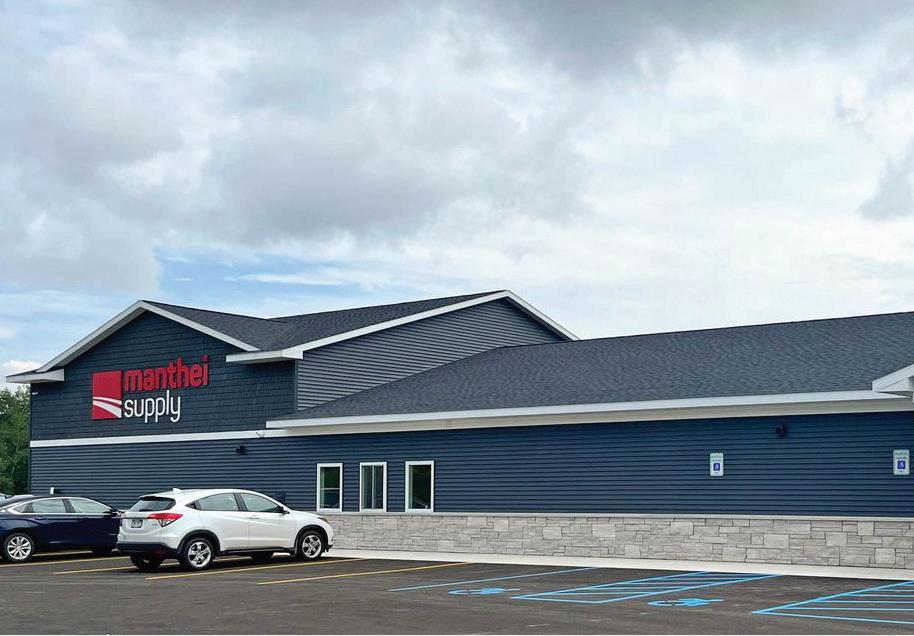
New businesses in Traverse City held ribbon-cutting ceremonies last month.
M&M Garage Doors, a garage and entry door service company in business since 2011 serving southern Michigan, now has a northern location at 201 E. 17th St., Ste. D, in Traverse City. Charlevoix-headquartered Manthei Supply, a landscaping supply company, recently expanded with a Traverse City location. The store can be found at 1423 Sawyer Rd. (west of Chums Corner). Finally, Brittany VanderBeek has launched Illuminate Opportunity, LLC, an organization that offers a range of services designed to transform ideas into solutions, including innovation and design thinking, growth strategy, community investment and partnerships, and more.
Traverse City-based 20Fathoms is offering a new program for indigenous






Whatever your field, count on us to help you reach your goals. Our Demand Response Program rewards businesses just for shifting when they use energy. In 2023, participants earned over $7.3 million in incentives to reinvest in their operations. They also avoided 284 MW of electric demand. That’s enough to light up 54 football fields or offset the entire annual output of a small power plant – a huge environmental impact for Michigan.
Make a play toward something bigger — for your business and Michigan. Scan the QR code or go to ConsumersEnergy.com/Seasons to learn how you can be part of something bigger.

entrepreneurs Sept. 27-29. The three-day Business & Marketing Essentials bootcamp is designed and hosted in partnership with New Mexico Community Capital. The free program addresses some of the resource gaps, including access to capital, technology, and mentorship and training, with programming that is inclusive of culture and traditions. All participants will receive a grant that can be used for technology and other basic needs that will help them complete the course. After graduating from the program, entrepreneurs will be eligible for additional grant funding to put toward their business. To receive registration information for this September cohort, visit https://bit.ly/3SQAYob.

OCT. 24-25
The annual Northwest Michigan Housing Summit hosted by Housing North is set for Oct. 24-25 at the Hagerty Center in Traverse City. The event will feature community leaders, housing agencies, financiers and other partners all focused on expanding housing options across the region. “The theme for this year’s summit, ‘Innovation and Collaboration,’ underscores the need to explore cutting-edge solutions and foster partnerships that can transform the housing landscape,” said Housing North Executive Director Yarrow Brown. “As we gather for this tenth housing summit, we aim to spark meaningful dialogue and inspire actionable strategies that address the evolving needs of our communities.” Visit housingnorth.org for more info.
Grand Traverse Resort and Spa in Acme recently announced a partnership with the Detroit Lions organization. Elements of the partnership include prominent in-game signage for Grand Traverse Resort and Spa, special vacation offers exclusively for Loyal Lions members, and co-branded marketing opportunities throughout the 2024-2025 season.

TBA Credit Union in Traverse City has partnered with Michigan Saves, the nation’s first nonprofit green bank. Michigan Saves offers borrowers low-interest financing options for energy efficiency and renewable energy upgrades. “TBA Credit Union is proud to partner with Michigan Saves to support their important work in promoting energy efficiency,” said Karen Browne, president and CEO of TBA Credit Union. “Through this partnership, we can create a more sustainable and prosperous Michigan for all.”
Traverse City has become the first city in Michigan to qualify as a Certified Autism Destination. The International Board of Credentialing and Continuing Education Standards certified the region after multiple organizations trained a majority of their staff on the needs of autistic people. The training took place with a variety of travel and leisure-related organizations including Traverse City Tourism, lodging partners and attractions. A list of certified businesses can be found at traversecity.com.
Two new hotels are in the works in downtown Traverse City, according to The Ticker. Jeff Schmitz of J.S. Capitol Group, the developer who built the Hotel Indigo, broke ground Friday on “The Syndicate,” a new 110-room Marriott Tribute hotel he’s been planning for years.
Across the river, on the long-vacant “hole in the ground” lot next to the Traverse City Record-Eagle building, developer Jeff Smoke of Great Lakes Capital is pursuing plans to build a “premium, boutique hotel.” Smoke had previously tried to develop a mixed-use development at the site that would have included both market rate and affordable/workforce housing units. Difficulty securing local and state incentives for the project led Smoke to change course and plan a luxury hotel instead. Details for the project, including number of rooms and hotel branding, are still in the works.








For years, we have heard about the coming use of uncrewed drones in everyday life for activities like parcel delivery, cargo transportation and other business applications. While it may still be some time before Amazon drops your latest purchase on your front porch, for Munson facilities across northern Michigan, this reality is fast approaching.
Thanks to the support from the Michigan Economic Development Corporation Office of Future Mobility and the Michigan Department of Transportation, two groundbreaking pilot projects will position the Grand Traverse Region at the forefront of healthcare transformation and water conservation through advanced aerial mobility.
In the fall of 2023, the MDOT’s Office of Aeronautics and the Michigan Aeronautics Commission released a forward-looking report that outlined significant opportunities for the state in advanced aerial mobility and Uncrewed Aircraft Systems (UAS). The report emphasized that the commercialization and safe adoption of drones could align with Michigan’s strategic transportation and mobility goals, serving local community needs while integrating drones into the national airspace. For Michigan to play a leading role in integrating UAS into its robust transportation network, the report recognized that limits to communications infrastructure, geographic challenges and cost constraints necessitate a regional approach to successful adoption of these technologies.
The study highlighted that the Traverse City area, with our diverse use cases across
varied terrain and unique assets such as Northwestern Michigan College’s UAS program, the only Federal Aviation Authority collegiate training program in the state, represents an ideal location to initiate regional drone deployment and development programs. Our region’s opportunities in land and maritime public safety, rural package delivery, and infrastructure management make it a prime candidate for testing and expanding UAS technologies. Additionally, the report highlighted that Traverse Connect’s efforts to develop and
Michigan University’s Rural Health Equity Institute was awarded a sizable grant to test and scale UAS applications in two project areas: enhancing rural healthcare and developing marine research opportunities.
The first project, led by Munson Healthcare, is focused on the delivery of medical supplies and critical healthcare services. With eight community hospitals serving more than 540,000 residents across 29 counties in northern Michigan, supply chain efficiency is critical to Munson’s efforts to improve access to care. The introduction
The introduction of UAS to transport medical supplies, lab samples, and equipment represents a significant leap forward in healthcare delivery.
attract innovative businesses provides a “test bed for innovation” and support for these pilot projects.
In response to the MDOT report, the MEDC’s Office of Future Mobility and Electrification introduced the Advanced Aerial Mobility Activation Fund, intended to advance the technology and infrastructure needed for drone industry development. Our team then worked with MDOT to identify aerial mobility opportunities in our region that could serve as use cases for the new activation fund. This summer our regional consortium, led by Traverse Connect and including Munson Healthcare, Northwestern Michigan College and Central
EDITORIAL
PUBLISHER
Luke W. Haase
lhaase@tcbusinessnews.com
CONTRIBUTING EDITOR
Gayle Neu gneu@tcbusinessnews.com
HEAD WRITER
Craig Manning
COPY EDITOR
Becky Kalajian
CREATIVE DIRECTOR
Kyra Cross Poehlman
CONTRIBUTING WRITERS
Ross Boissoneau
Art Bukowski
Kierstin Gunsberg
Rick Haglund
WEB PRODUCTION: Byte Productions
MAILING/FULFILLMENT Village Press
DISTRIBUTION
Gerald Morris
SERVING: Grand Traverse, Kalkaska, Leelanau and Benzie counties
of UAS to transport medical supplies, lab samples, and equipment represents a significant leap forward in healthcare delivery. Drones can minimize human touchpoints, speed up test results and provide quicker access to essential supplies. This improved efficiency not only enhances patient care but also reduces emissions associated with road transportation. Though this pilot project may start on a small scale, it is a crucial step toward gathering data and expanding advanced aerial mobility solutions for healthcare both locally and nationally.
The existing Discovery Pier and the new Freshwater Center for Research & Innovation campus under development on West
Grand Traverse Bay will host the second project involving the deployment of drones for marine research and an aerial mobility command station. This initiative aimed at advancing freshwater and marine technology will facilitate the use of drones for critical tasks such as bathymetric mapping and environmental monitoring. Serving as a command center for UAS operations, overwater drones will be deployed for marine surveying, water sampling, and emergency response efforts, enhancing the region’s preparedness for maritime emergencies in the Great Lakes. By leveraging the capabilities of UAS, the Freshwater Center will strengthen its role in water research and innovation while furthering our region’s technological advancement.
These applications highlight northern Michigan’s potential as a leader in the field of advanced aerial mobility and provide opportunities to help our region through improved healthcare delivery and freshwater conservation. The pilot projects also represent the next significant step forward in the Grand Traverse regional economic development strategy that will lead to new career opportunities in advanced fields. Our diverse geography, agricultural lands, aerospace and defense companies, and existing aviation infrastructure also offer significant opportunities for expanding UAS applications beyond these initial project areas. The future of drone deployment is here!
Warren Call is the president and CEO of Traverse Connect.
AD SALES
Caroline Bloemer
cbloemer@tcbusinessnews.com
Lisa Gillespie
lisa@northernexpress.com
Abby Walton Porter
aporter@northernexpress.com
Kaitlyn Nance
knance@northernexpress.com
Todd Norris
tnorris@tcbusinessnews.com
Michele Young myoung@tcbusinessnews.com
Periodical
POSTMASTER: Send address changes to The Traverse City Business News, PO Box 1810, Traverse City, MI 49685-1810.
The Traverse City Business News is not responsible for unsolicited contributions.
Content ©2024 Eyes Only Media, LLC. All rights reserved.


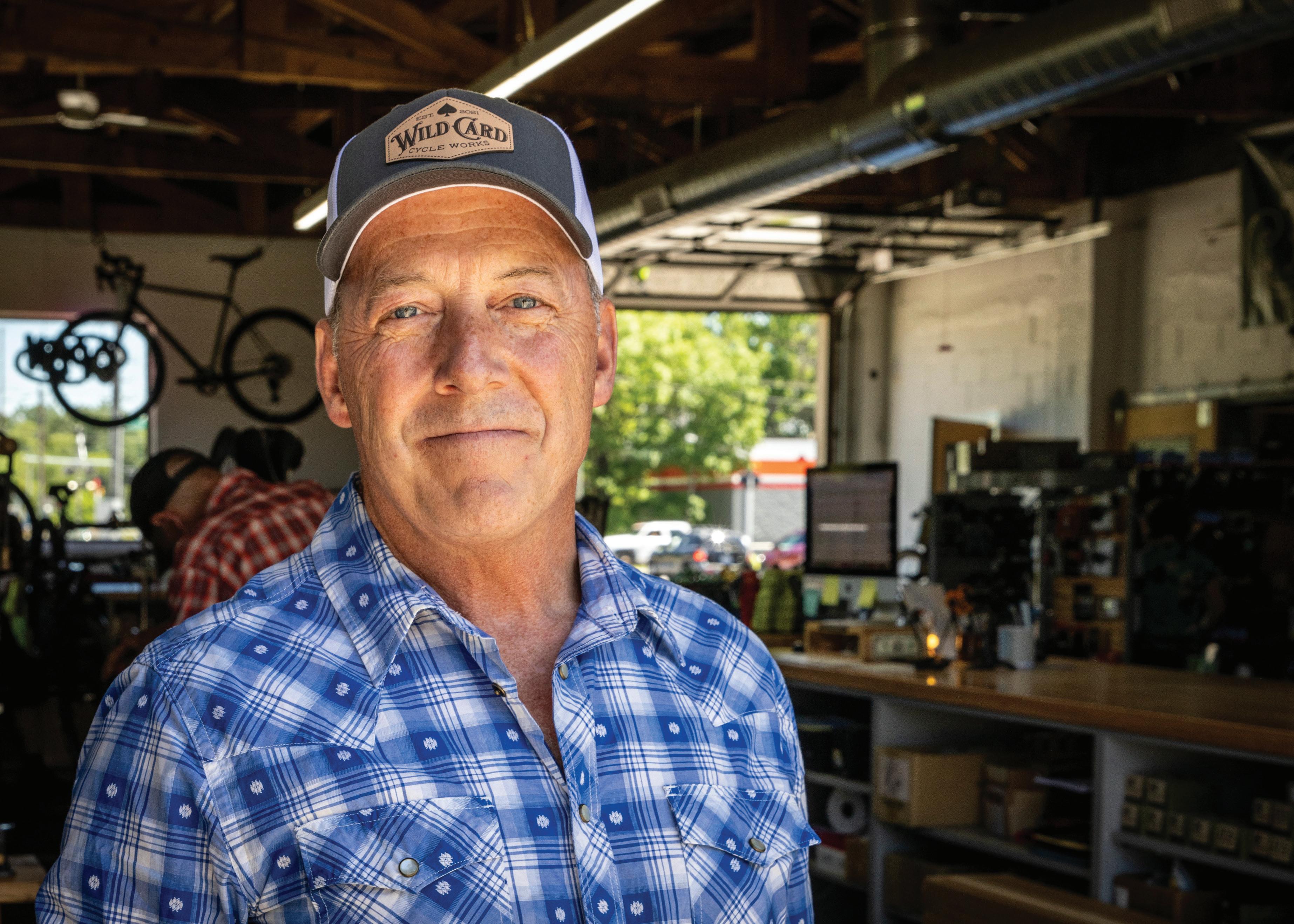










Whether you’re planning for a small group of eight or a larger gathering of up to 200, Delamar Traverse City has a variety of unique spaces and personalized options to make your holiday party unforgettable. We’d love to help you plan your perfect celebration.

By Art Bukowski
Perennial 40Under40 winner Lindsay Raymond is a partner at DAR Law (formerly Danbrook, Adams and Raymond) in Traverse City. Her firm specializes in employment and labor law, estate planning and administration, liquor licensing and family asset preservation. We’re grateful to Lindsay for showing us around her space. If you have an idea for a From The Desk Of feature, please email abukowski@tcbusinessnews.com.


1. I dual majored in undergrad in musical theater and criminal justice, so I am obsessesed with mysteries and thrillers and things like that. These are two books by Megan Miranda, an author in that genre. I always have so much work to do, and when I have time, I like to escape into fun reading like this.
2. The previous owner of our home was a master gardener. And so the entire lot is filled with flowers every season. The girls call it our “yarden,” and I spend a lot of time out there trying to keep it up.
3. I’m the president of Impact100 Traverse City right now. It’s such a great organization. We started in 2017, and we’ve given away $2.4 million directly to our community.
4. I’m on the board for Old Town Playhouse because of my theater love. And it’s just such a wonderful place to gather for kids, to teach them skills and confidence and all that sort of thing. I just love it there.
5. That’s Klondike, the mascot of my alma mater, Ohio Northern University. It’s in Ada, Ohio. Ada’s claim to fame is that the Wilson football factory is there, so
that’s where all the NFL footballs come from. It’s just a one-stoplight town, but it was a fabulous university.
6. As a working mom and owner of a business, I have to seriously multitask and do things on the fly. So I have to keep lists everywhere. I love being able to write on this and keep things top-of-mind.
7. I ride with the kids to school every day. We have a whole bike brigade that goes to Eastern Elementary. And on one of those days I hit a pothole at the Civic Center, and was thrown from my bike and slammed my head onto the concrete. I was wearing a helmet at the time, and the doctor said if I wasn’t wearing a helmet, I could have either broke my neck, had severe brain damage, or worse. My memory was resetting every 30 seconds for like 24 hours. It was a really scary time for my family. Luckily I was wearing my helmet. And so I always say now that it’s the best investment in my life.
8. My dad always had this print of the Edmund Fitzgerald hanging in his office. And he always told me that as a leader, you don’t have to try to be unsinkable. It’s good to ask for help.



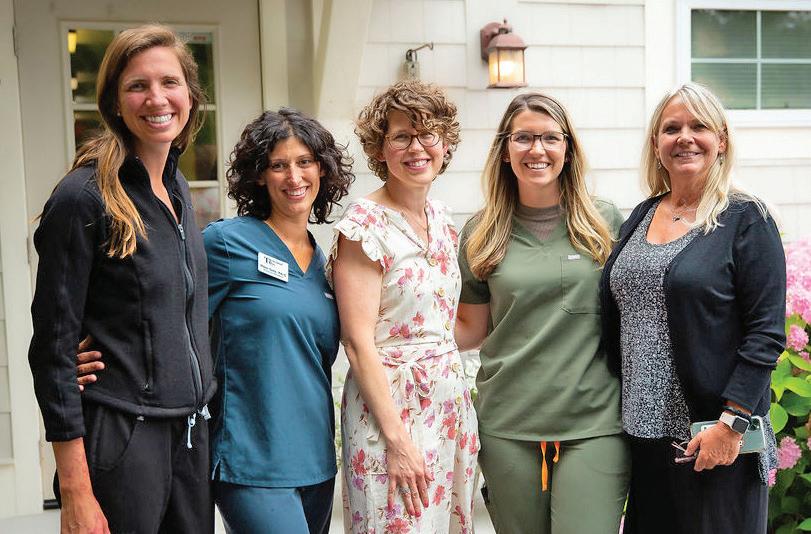
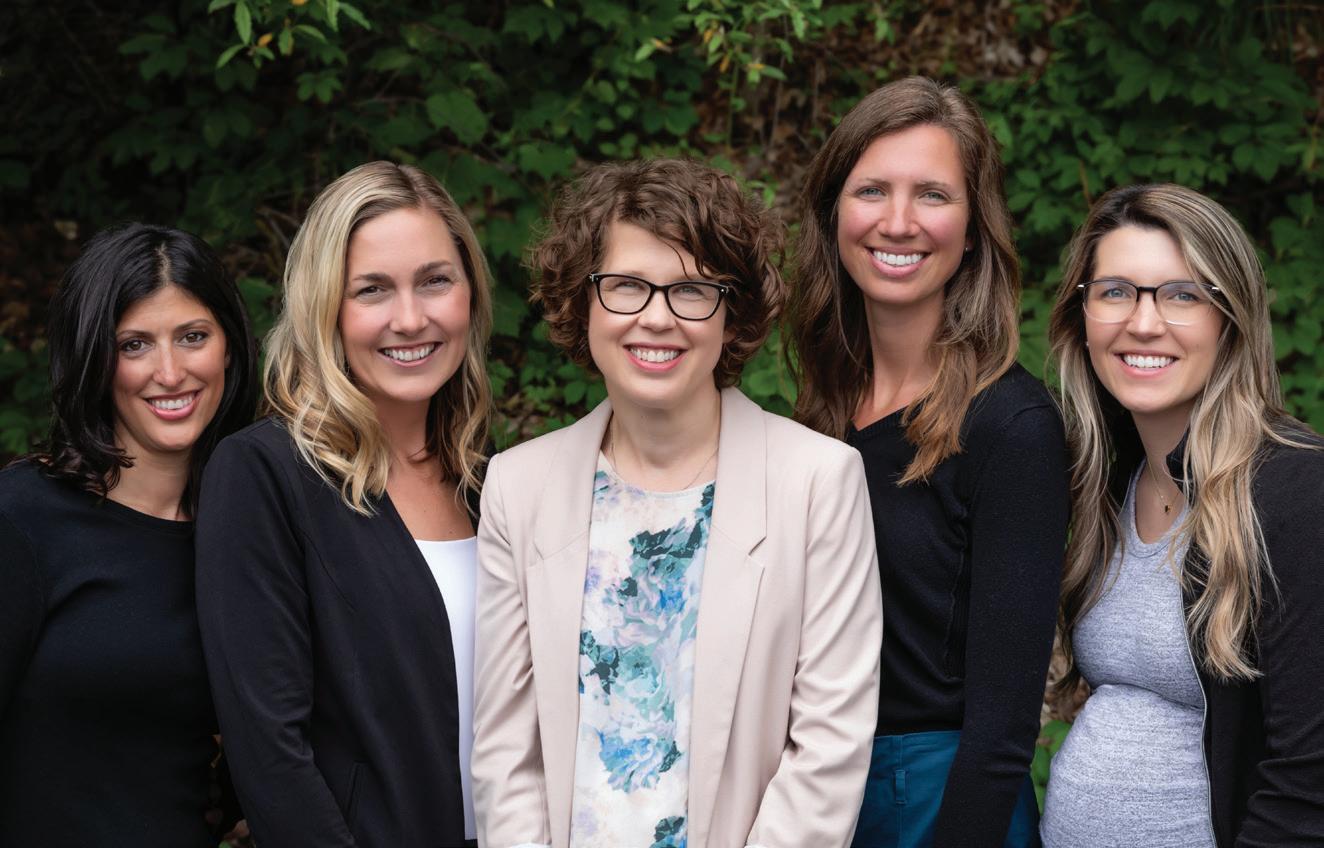
Compiled by Craig Manning and Ross Boissoneau

Following is TCBN’s 18th annual list of the 40 most influential regional leaders under age 40.
This list recognizes individuals in Grand Traverse, Leelanau, Benzie and Kalkaska counties under the age of 40 whose professional and community efforts this past year had the most impact on their community, the region and the economy.
The 2024 class is comprised of 26 women and 14 men; more than half are new to the list. On the following pages they describe their regional economic impact, local inspiration, biggest fan, and next big thing.
A panel of six judges reviewed the submissions and chose the 40 influencers out of 100-plus nominations from the community. The panel includes Karin Chung, senior recruiter at Hagerty; Mandy Sentieri, chief financial officer of Traverse Connect; Allison Beers, owner of Events North and past 40Under40 recipient; Luke Haase, publisher of the TCBN, Northern Express and The Ticker; Jillian Manning, executive editor of Northern Express; and Gayle Neu, contributing editor of the TCBN
First and foremost, judges considered the leadership the nominee shows in his or her job or industry and the economic impact that work has on our region. Judges looked at each nominee’s level of community involvement and actionable forward momentum (i.e., what have they done recently?) Consideration was given to account for relative accomplishments versus relative age.
Many thanks to Hagerty, again this year’s signature sponsor. Watch for 2025 nomination information in the TCBN and The Ticker starting next spring.
Volunteerism/leadership: Emerging Practitioners in Philanthropy Michigan, steering committee co-chair; Migrant Resource Council; Council of Michigan Foundation, 2024 conference planning committee; previously served five years on the Up North Pride board.

Highlight: I served on the board for Northern Blooms Montessori for three years as we worked to get that child care facility started. While I stepped back from the board earlier this year, I’m so proud that the facility is open and fully enrolled for the summer, that equity is ingrained in the model, and that there are additional high-quality child care spots for families in the community.
Regional economic impact: Working at GTRCF has given me a regional perspective on how interconnected we all are. I often have the privilege of being a thought partner and helping connect people to resources like funding opportunities, business resources, or other people and organizations that will help them get the support they need for their project, program or small business.
Next big thing: In 2021, GTCRF started a Diversity, Equity, and Inclusion Fund that, to date, has granted more than $150,000 to 56 unique nonprofits that are diversely led or engaging in efforts focused on DEI. Thanks to a generous donor, this spring we created a permanent version of this fund: the Endowment for Diversity, Equity, and Inclusion. We are working to fundraise for that endowment this summer.
Who knew: I recently started playing pinball at The Coin Slot with Belles & Chimes, a local chapter of an international inclusive pinball league for women, femmes and thems.
Biggest fan: “Pam is a top influencer in the Grand Traverse region because she is a shining, rising star in the philanthropic field. She has deeply embedded herself in the region since moving from Florida back in 2018, and has taken on a number of leadership roles at local organizations to better support the people and places here. Her heart is big and her capacity for continuous community care, connection and advocacy is remarkable.” – Kristina Pepelko, Grand Traverse Regional Community Foundation
Max Anderson, 38
Vice President/Commercial Lender, Honor Bank
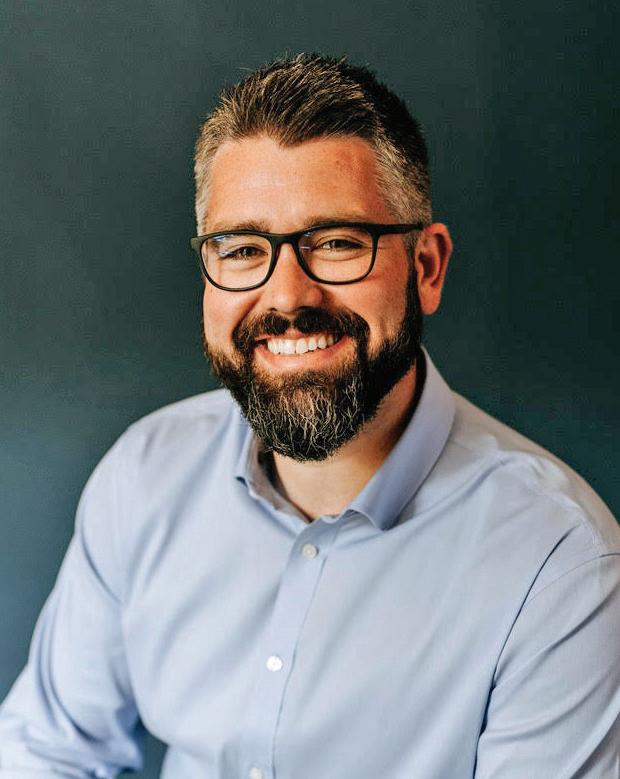
Volunteerism/leadership: Rotary Club of Traverse City; The Festival Foundation; Kingsley Area Schools, board of education; Village of Kingsley, DDA, Brownfield Redevelopment Authority, and zoning board of appeals; Paradise Township, planning commission; East Bay Masonic Lodge # 264; Traverse Connect, government relations committee.
Highlight: Being promoted to a vice president of Honor Bank!
Local inspiration: Paul LaPorte is the living example of the phrase, ‘It’s amazing what you can accomplish when you don’t care who gets the credit.’ You never see Paul receiving awards or touting his accomplishments. He does all the heavy lifting behind the scenes with a smile on his face and is simply happy that he’s made our community a better place. I consider myself lucky to know him and call him my friend.
Regional economic impact: I find that I am increasingly drawn to working with organizations that need support or are working through a challenging issue. I am proud to have worked with several local organizations over the years to hire new executive directors or superintendents, or to navigate challenging political issues that are central to their missions. My greatest hope is that I can look back one day and feel like I’ve made a positive difference in our community.
Next big thing: I have gone back to school and plan to graduate next June from Central Michigan University with my MBA. Fire up Chips!
Who knew: As much as I love electronic gadgets and technology, I can’t stand social media and refuse to use almost all of the current generationally accepted apps for my age group.







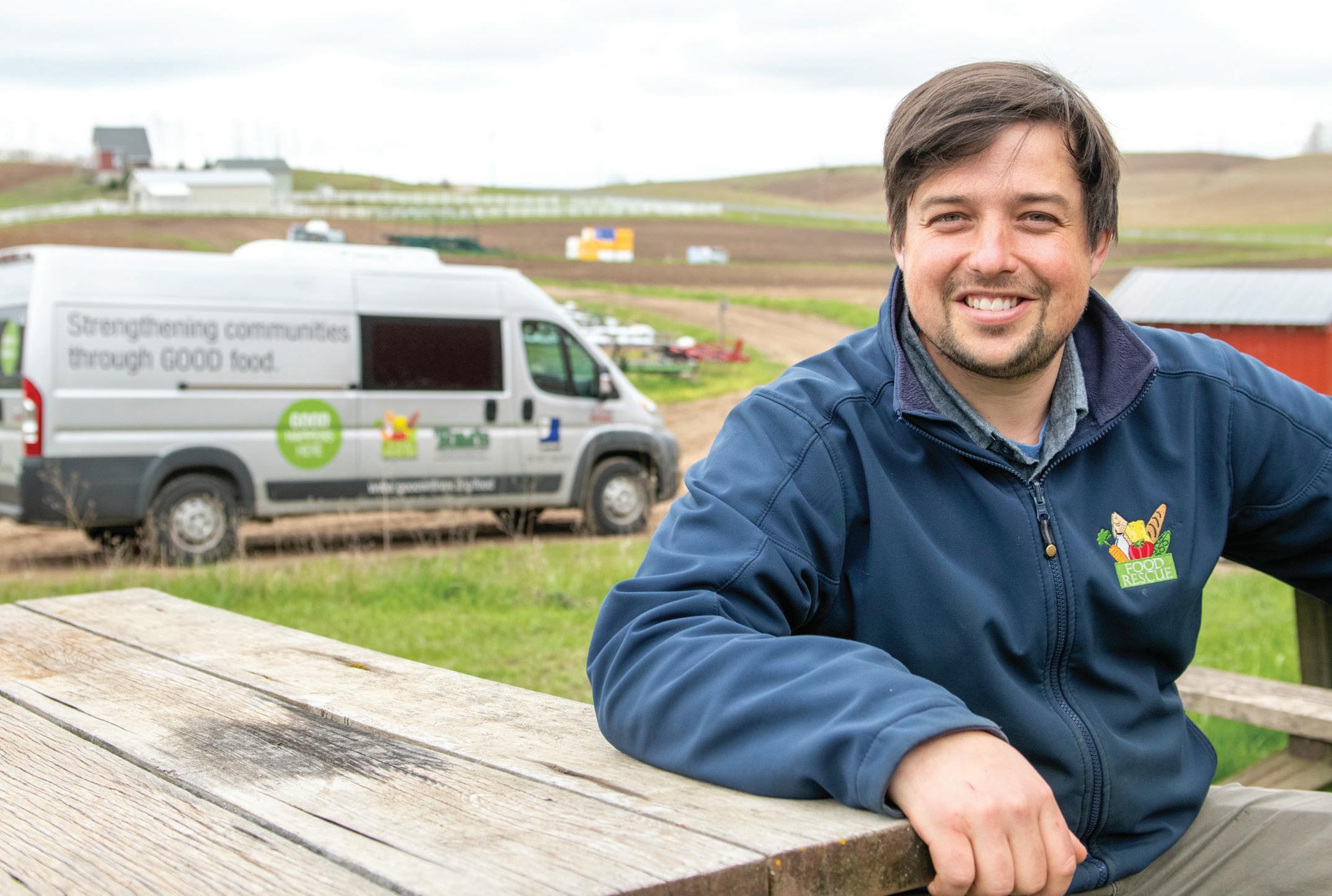






Food Equity Specialist, Groundwork Center for Resilient Communities
Volunteerism/leadership: Big Brothers Big Sisters, volunteer; Goodwill Northern Michigan, Food Rescue volunteer; Northwest Food Coalition, operating committee member.
Highlight: I help coordinate the Farm 2 Neighbor program, a local food purchasing initiative, in collaboration with the Northwest Food Coalition and Goodwill Northern Michigan’s Food Rescue. We purchase food from local farms to distribute to area food pantries and meal sites. Earlier this year, a farmer told me that because of our purchases, she was able to lease more land, grow her business, and increase her capacity to provide healthy food for the community.
Local inspiration: Robert Isble, aka Izzy, who is the warehouse manager at Food Rescue. Izzy is a calm, kind presence who manages the endless amount of details, logistics, and moving parts required to get healthy food to people in need. Whether I’m there to volunteer or calling to talk about a work issue, Izzy always has time to say hi, and makes everyone’s day better.
Regional economic impact: Thanks to the Grand Traverse Band of Ottawa and Chippewa Indians’ proposal to the Local Food Purchase Assistance Cooperative Agreement Program – a USDA program that provides funds to purchase food from local farmers and distribute it to food-insecure families in our region – we’ll be investing over $550,000 in local food from farmers in our region over the next two years. That’s a lot of high-quality, local, and healthy food for those who need it, and a significant investment in our local food economy!
Who knew: I love composting and building healthy soil. I’ve completed a master composting course and currently have three compost piles going in my home garden, along with a worm bin in the basement.
Abigail Baudry, 29

Communications & Special Projects Manager, Traverse Connect
Volunteerism/leadership: Michigan’s Creative Coast; Northern Michigan Chamber Alliance; Michigan Office of Rural Prosperity, Young Rural Champions insight group; Grand Traverse Social Sports.
Highlight: I was selected to serve on Gov. Gretchen Whitmer’s ‘Grow Michigan Together Council’ work group, to represent northern Michigan and to offer insights on talent attraction in rural communities.
Local inspiration: I met Brittany Vanderbeek through the Traverse City Young Professionals when I first moved here, and she has been a professional inspiration to me ever since. She is a connector of people and ideas, a visionary entrepreneur, a brilliant creative thinker, and an eternal Energizer Bunny.
Regional economic impact: As a transplant to the area from Atlanta, Ga., I know firsthand the challenges and opportunities that young people face when they move here – from making friends to finding a place to live. When I moved here, I was fortunate to connect with great people who helped me navigate my move. Now, I am pleased to return the favor and support newcomers to the area through my work with Michigan’s Creative Coast.
Next big thing: I am currently participating in the 2024-2025 Leadership Grand Traverse program. I look forward to learning more about organizations across the region, developing leadership skills, and eventually joining a distinguished group of LGT alumni.
Biggest fan: “As a lifelong visitor to the Grand Traverse region, Abby set her sights on relocating here to pursue her career and enjoy all aspects and seasons of life here. Michigan’s Creative Coast was developed to attract working-age talent to our region, and shortly after its launch, Traverse Connect was fortunate to bring Abby onto our team. She embodies the program’s goals, and it continues to thrive and grow under her management. Abby champions the needs of those already living and working here while helping make connections and supporting those who dream of fulfilling their life and career goals in and around Traverse City.” – Katherine DeGood, Traverse Connect
Bailor Bell, 36
Attorney, The Fierberg National Law Group
Volunteerism/leadership: Third Level Child and Family Services, Free Legal Aid Clinic; More Than Four Foundation.


Highlight: Obtaining a ruling and subsequent settlement in a lawsuit against the federal government in the United States Court of Federal Claims, which allowed a long-standing local business – a business with a history spanning 100 years – to continue its operations.
Local inspiration: Dan O’Neil, the founding partner of the law firm Thompson & O’Neil. Although he supports the Packers, Dan is an unwavering champion and one of the friendliest individuals I’ve encountered. He dedicates hours and hours to vital community causes.
Regional economic impact: I became part of The Fierberg National Law Group in January 2023. I now advocate for survivors, victims and their loved ones in cases of sexual assault, school violence and major personal injuries. Although no financial compensation can truly make up for the immense suffering and trauma my clients have endured, I’ve been privileged to assist individuals and families in the Grand Traverse area obtain over $3 million in the last year.
Next big thing: I am looking forward to riding in my first Iceman Cometh Challenge this November!
Biggest fan: “Bailor Bell is a trial attorney unlike most others who practice in northern Michigan: A young professional born and raised here who has extensive experience representing students, women and others injured or killed in high-profile cases around the country. Mr. Bell has achieved unprecedented results – locally and nationwide – in civil cases involving the sexual abuse of minors by clergy and health-care providers, wrongful death, survivors of domestic abuse, mass shootings and auto negligence. Traverse City needs young professionals of this caliber to protect the rights of its citizens.” – Doug Fierberg, The Fierberg National Law Group

Co-founder, Honest Hospitality
Volunteerism/leadership: When not working, I spend most of my time involved in our kids’ school (Grand Traverse Area Catholic Schools), and spending quality time with my husband and kids. Work life balance is big for us and we know personal values are something to treasure.
Highlight: Accomplishing my goal of owning three restaurants before the age of 40, and I accomplished that with Mama Lu’s, The Flying Noodle and The Burrow. In the past year, we also implemented paid time off for all of our employees, under the belief that everyone should be entitled to good work-life balance without having to making a monetary sacrifice. Finally, we hit over $1 million in payroll in 2023.
Local inspiration: Soon Hagerty. I love her tenacity to do good in the community and share her passion for her culture. She makes it look effortless and I love that.
Regional economic impact: When John Larson and I founded Honest Hospitality, we did so with the goal of creating a company that would allow for sustainable careers in hospitality, regardless of the position or education level, and that we could do that through our brand’s culture. We have since had the ability to foster a work environment where people are proud of their job and the work they do, are properly compensated for their time, and feel empowered every day.
Next big thing: More restaurants! We have so many concepts and ideas we want to bring to the area, and so many people on our team that want to make it happen for us and for themselves. We also know that timing is everything, so while there is absolutely more on the horizon, we’re just trying to make sure the timing is right.
Tomorrow is loving more of the moments we love today.
Tomorrow is on.SM What we do today impacts tomorrow. Like how a silly moment with loved ones can create memories that last a lifetime. Or how Enbridge is investing in enough renewable energy projects to power more than one million homes. It’s part of how we’re fueling quality of life, so you can turn more moments into memories for years to come
Learn more at tomorrowison.com


Owner/Community Development Director, RE/MAX Bayshore Team Brick & Corbett
Volunteerism/leadership: Groundwork Center for Resilient Communities, board of directors; Community Cares Coalition, founding member; Moms Demand Action Traverse City; Brickways.
Highlight: We established one of the initiatives I’m most proud of, which is our RE/MAX Bayshore Mental Wellness Series. We partnered with the amazing Head and Heart Therapy Solutions to create a series of quarterly in-person sessions with health and wellness experts. It includes topics such as the body’s stress response system, sleep and technology hygiene, intuitive eating and joyful movement, and somatic stress release and self-soothing practices.

Local inspiration: Hans Voss, the outgoing executive director of Groundwork. Hans loves this community and focuses on the mission and the real work, not the politics or who gets the credit.
Regional economic impact: Besides regularly feeding a family of five at the incredible local restaurants, my biggest impact on the local economy is seen through RE/MAX Bayshore agents’ work and everyday contributions to the community. My job is to create an environment for the leading real estate agents in our area to thrive and serve their clients, and I believe our agents are some of the most respected and generous ambassadors in the area.
Next big thing: We just kicked off an exclusive partnership with Knightwing Media to ensure our agents have access to the best marketing, photography and videographer services for RE/MAX Bayshore property listings.
Who knew: I’ve spent 11 summers exploring the Canadian wilderness, collectively canoeing over a thousand miles and spending weeks in the wild. Attending this camp was one of the most formative experiences of my life. Now, years later, my daughter gets to experience the same magic of unplugging, doing hard things and connecting with others and nature.
Co-Founder/CEO, Stocked; Owner, Happy Camper Coffee Co.
Highlight: Our team was recently able to scale up our business by adding a second grocery delivery territory in Florida.
Local inspiration: Tiffany McQueer, from J&S Hamburg South Airport and Project Feed the Kids, is a true professional inspiration. Watching Tiffany and her husband’s journey transform a local diner into a beacon of hope and support has been incredibly inspiring.

Regional economic impact: Our platform serves as a vital bridge connecting local companies with visitors and residents alike. Over the past three years, we’ve successfully processed over 4,000 grocery orders. We partner with local stores and enable customers to have their orders conveniently delivered and set up in their short-term rentals, enhancing their overall experience in the region.
Who knew: I climbed Angels Landing, a 1,488-foot-tall rock formation in Utah, back in 2011.
Troy Daily, 37
Serial Entrepreneur, Paddle for Pints; Brew Bus; TC Cycle Pub; Kayak, Bike & Brew; Elevated Homes & Hospitality; Seven Hills/ Old Mission Distilling
Highlight: Finally opening Seven Hills and Old Mission Distilling out on Old Mission Peninsula!

Local inspiration: Matt Bulloch at TentCraft is always such a great inspiration with how he has been able to pivot his busi ness over the years, add and remove products, design a totally new tent and manufacture it, innovate with the times and product needs, manage hundreds of employees, and move locations on top of it all.
Regional economic impact: Tourism is a large part of Traverse City. Whether you like it or not it’s here to stay. I want to create the fun, safe and sustainable things that I would want to do and be proud of in my town. If I don’t do them, someone else will and who knows what kind of product we will get!

Next big thing: Hopefully, resolving the challenge to renew my contract with the city for





Biggest fan: “Broc Crandall is a true northern Michigan entrepreneur. As the founder of both Stocked and Happy Camper Coffee, Broc sees opportunities and goes after them. But he doesn’t only support his own businesses. If you step inside Happy Camper or visit the Stocked website, you will see products and offerings from many other northern Michigan companies. That’s what makes Broc so special: He isn’t focused on just himself, but spends time and effort ensuring other entrepreneurs are also succeeding. This is also evident in his work with the startup community, where he has helped champion the Founders First Friday meetup where new companies have been formed, companies have raised investment, and entrepreneurs have found community.” – Chase Bonhag, FirstIgnite


Biggest fan: “Emily is a top influencer in the Grand Traverse region due to her remarkable entrepreneurial success, innovative leadership and dedication to empowering others. Emily’s active involvement in the OOPS community, her leadership in running an entrepreneurial women’s group, and her passionate advocacy for women’s rights showcase her commitment to creating positive change. Known as a hyper-connector,

Co-Founder/CEO, Stocked; Owner, Happy Camper Coffee Co.
Highlight: Our team was recently able to scale up our business by adding a second grocery delivery territory in Florida.
Local inspiration: Tiffany McQueer, from J&S Hamburg South Airport and Project Feed the Kids, is a true professional inspiration. Watching Tiffany and her husband’s journey transform a local diner into a beacon of hope and support has been incredibly inspiring.
Regional economic impact: Our platform serves as a vital bridge connecting local companies with visitors and residents alike. Over the past three years, we’ve successfully processed over 4,000 grocery orders. We partner with local stores and enable customers to have their orders conveniently delivered and set up in their short-term rentals, enhancing their overall experience in the region.
Who knew: I climbed Angels Landing, a 1,488-foot-tall rock formation in Utah, back in 2011.
Biggest fan: “Broc Crandall is a true northern Michigan entrepreneur. As the founder of both Stocked and Happy Camper Coffee, Broc sees opportunities and goes after them. But he doesn’t only support his own businesses. If you step inside Happy Camper or visit the Stocked website, you will see products and offerings from many other northern Michigan companies. That’s what makes Broc so special: He isn’t focused on just himself, but spends time and effort ensuring other entrepreneurs are also succeeding. This is also evident in his work with the startup community, where he has helped champion the Founders First Friday meetup where new companies have been formed, companies have raised investment, and entrepreneurs have found community.” – Chase Bonhag, FirstIgnite
Troy Daily, 37
Serial Entrepreneur, Paddle for Pints; Brew Bus; TC Cycle Pub; Kayak, Bike & Brew; Elevated Homes & Hospitality; Seven Hills/ Old Mission Distilling
Highlight: Finally opening Seven Hills and Old Mission Distilling out on Old Mission Peninsula!
Local inspiration: Matt Bulloch at TentCraft is always such a great inspiration with how he has been able to pivot his business over the years, add and remove products, design a totally new tent and manufacture it, innovate with the times and product needs, manage hundreds of employees, and move locations on top of it all.

Regional economic impact: Tourism is a large part of Traverse City. Whether you like it or not it’s here to stay. I want to create the fun, safe and sustainable things that I would want to do and be proud of in my town. If I don’t do them, someone else will and who knows what kind of product we will get!
Next big thing: Hopefully, resolving the challenge to renew my contract with the city for Kayak, Bike & Brew and Paddle For Pints! Our five-year contract expires after this season and the city has informed me they would not be renewing. I am hoping to change their mind and start the good fight with a lot of positive people and businesses at my side.
Who knew: I have my real estate license and, as of recently, my builders license. Along with managing over 60 short term rentals in the area, I am also working with two other guys to build four or more single-family homes a year, to help with the housing shortage in the area.
Founder/Owner, Immaculate Home & NESTWELL
Volunteerism/leadership: NMC’s Office of Possibilities (OOPs); Michigan Founders Fund; Ann Arbor Spark.
Highlight: Transitioning from a career in health and wellness, including senior management and nursing roles, I embarked on full-time entrepreneurship to grow Immaculate Home – which provides luxury home management and concierge services and residential and commercial cleaning – beyond its original ‘side-gig’ roots. Achieving personal sustainability through self-employment feels like a huge win.

Local inspiration: Alaina Leech, owner of Lake District Wine Co. and Think Fresh Consulting. Aimee is one of the most knowledgeable wine experts in our region.
Regional economic impact: I’ve cultivated Immaculate Home and NESTWELL into businesses that significantly enrich our local economy. Immaculate Home relieves families of burdensome tasks, while NESTWELL aids corporations in optimizing employee time management and customizing benefits, boosting productivity and satisfaction.
Next big thing: NESTWELL’s upcoming official launch marks a significant milestone. I’ve also had the privilege of promoting team members at Immaculate Home into management roles, which has allowed me to focus on growth strategies and the launch of a new business. In early 2024, I launched EmpowHer, a women-only version of the Office of Possibilities, which fosters invaluable connections and opportunities for my team and my peers.
Biggest fan: “Emily is a top influencer in the Grand Traverse region due to her remarkable entrepreneurial success, innovative leadership and dedication to empowering others. Emily’s active involvement in the OOPS community, her leadership in running an entrepreneurial women’s group, and her passionate advocacy for women’s rights showcase her commitment to creating positive change. Known as a hyper-connector, Emily excels at bringing people together and fostering meaningful partnerships.” – Erin Eatough, Fractional Insights
JOE SHORT - Founder
When Short’s Brewing Company was looking to expand, MEDC was ready to help. We can help your business too. Get access to growth opportunities, find the best talent, and connect with the right partners. We’re your personal concierge for everything you need to succeed. Seize your opportunity at MICHIGANBUSINESS.ORG
















































Founder/Owner, Archie’s Dog Co; Digital Marketing Manager, Cherry Republic







Highlight: In the past year, my proudest professional moment was being invited to TikTok Headquarters in New York City. This milestone happened after Archie’s Dog Co was recognized as the top live streamer based on gross sales in the United States in the ‘Pets and Animals’ category. During the visit, we discussed strategies and tactics to enhance Archie’s Dog Co’s presence and sales for the 2024 holiday season. Since then, we have become a TikTok Shop featured seller to help other small businesses across the country find success within the application.
Local inspiration: Soon Hagerty. This past year, I was honored to become an EmpowHer Grantee, selected from among 800 applicants through Soon’s nonprofit, the Boundless Futures Foundation. She has provided me with both financial and leadership resources, enabling me to continue growing Archie’s Dog Co so that I can have a boundless impact in society.
Regional economic impact: When I started Archie’s Dog Co, my goal was to focus on three main areas: quality dog treats, e-commerce and making a direct impact on our region’s economy. Over the past eight months, Archie’s Dog Co has donated over $3,000 to the Cherryland Humane Society by committing 1% of all sales to support their cause.
Next big thing: My next big goals are to delve deeper into affiliate marketing, launch Archie’s Dog Co on Amazon, and improve our packaging and inventory management with the help of my business partner and husband, Jack.
Who knew: Before finding success with Archie’s Dog Co, I ran a photography business and a food blog.
Volunteerism/leadership: TC Philharmonic, president of the board of directors; Downtown Traverse City Association, board member; TC Tritons, founding board member.
Highlight: My proudest moment from the past year is actually a collection of smaller moments that make my life better every day. This year, I have gotten to a much better place of balance in regards to work, health, hobbies, community and family.
Local inspiration: Susan Cogswell, the past president of the Traverse Symphony Orchestra – now TC Philharmonic. Susan is one of the most caring, hard-working, and passionate people I have had the pleasure of knowing. This fall, TC Philharmonic will celebrate the opening of our new Music School, a school that will make sure that no child – or adult! – is left behind in the pursuit of their passion for music. This project would not be possible without Susan’s hard work and dedication.
Regional economic impact: I have always thought that anything worthwhile for one’s self should be worthwhile for others. In this way, I try very hard to make the things I do a win-win for others around me. I have had the fortune to see others around me start other businesses, including former employees and good friends. In this way, there is a real butterfly effect to even the small things we each do.
Next big thing: This year, Blue Goat will celebrate its 50th anniversary – and it will have been 10 years since we first set off to re-imagine it in a fun new way. Formative Fitness, which I founded and still am involved in, will celebrate its 15th anniversary and TC Philharmonic will open our new Music School.
Biggest fan: “Sebastian is not only a successful entrepreneur and active volunteer; he is also a true advocate for other small business owners and the Traverse City community in general. He uses his connections and relationships he’s built over the last 20 years to lift others up, and always treats his clients and employees with the utmost respect.” – Coty Mendenhall, The Blue Goat


Janna Goethel, 34
Annual Gifts & Special Events Coordinator, TART Trails
Volunteerism/leadership: Mt. Holiday board of directors.
Highlight: Leading TART Trails through 50-plus events across the region was a huge lift and major accomplishment during the past year. Our team has the opportunity to engage with thousands of community members at these gatherings, which helps us raise awareness for the importance of non-motorized trails and the critical role they play in creating connections and helping solve major issues such as climate change and our mental health crisis.
Local inspiration: I am often inspired by the dynamic duo of Julie Hay and Kelli Kaberle-Mengebier of HKM & Associates. Their steadfast support of Mt. Holiday’s mission and belief in the importance of preserving and providing healthy outdoor recreation opportunities for communities is encouraging and truly inspiring.
Regional economic impact: Thanks to many local and national studies, we know that the non-motorized trail network in our region makes Traverse City a desirable place to live and work, and an attractive place to visit. I take great pride in playing a role in the incredible economic impact that TART Trails has on the community. Our events promote healthy lifestyles and attract visitors from across the state and even country, and proceeds are then invested in the development of future trails and maintenance of existing trails, which provides direct economic value to local businesses.
My next big thing: Personally, I look forward to growing my family and being the best parent I can be. And I’ll do my best to help Mt. Holiday embark on ambitious infrastructure investments that will help keep the magic of winter alive while we adjust to changing winter conditions.
Who knew: Pre-pandemic, my husband and I created a fundraising event for Mt. Holiday called Hoof n’ Sloshin, a Bavarian-themed two-mile race. The event ran for two years and we look forward to bringing it back to the community once our lives settle down a bit!
Director, Northwest Michigan Coalition to End Homelessness
Volunteerism/leadership: Housing North board of directors; Michigan Homeless Policy Council, Community Development Coalition member.
Highlight: My proudest professional moments highlight the collaborative spirit of my work. For instance, the purchase of East Bay Flats by Goodwill Northern Michigan was a collective effort deserving of pride. Transforming East Bay Flats into Permanent Supportive Housing for our community’s most vulnerable members required exceptional courage and dedication from Goodwill leadership. I played a small role in this significant project, bringing us closer to our goal of ending chronic homelessness.


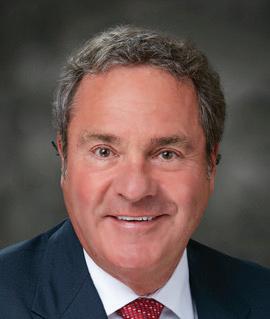




Local inspiration: Nora Dunlop, the director of housing development at Goodwill Northern Michigan, is brilliant, kind, and deeply committed to ending homelessness. She was instrumental in securing the tax credit award from MSHDA for East Bay Flats and has gone above and beyond to ensure the transition runs smoothly.
Regional economic impact: Investing in deeply affordable housing and the Housing First model reduces public costs associated with homelessness by up to 50%. Permanent supportive housing is more cost-effective than maintaining people in homelessness. This investment reduces expenses related to emergency healthcare, law enforcement, and social services.
Next big thing: Our coalition will continue to work toward our goal of ending chronic homelessness by 2028. We are seeing commitment and collaboration around our efforts like never before.
Who knew: I didn’t have time to update my three-year-old headshot, so I used AI. Pretty close and maybe even a little better than real life, don’t you think?

PRESENTED BY KEEN POWERED

OVERVIEW
KEEN keeps it cool and keeps it green at Centre Ice Arena, with new LED Lighting and Refrigeration system. YEARLY KILOWATT HOURS SAVED: 160,944 kWh annual savings
SAVINGS EQUIVALENT TO:
12,652 gallons of gasoline consumed 131 acres of U.S. Forests preserved












Lauren Harris, 39
Senior
Director of Solutions Consulting, Priority Health
Volunteerism/leadership: Venture North, board member and marketing committee chair; Traverse Connect, government relations team; Traverse Area Human Resources Association

Highlight: For the past several years, I’ve had the privilege of partnering with many of our region’s key employers for their employee benefits. With this unique perspective and experience, in April 2024, I rejoined Priority Health to lead the development of a new function within the employer solutions division, called solutions consulting. This team will support in the development and execution of innovative solutions focused in self-insuring and designed to achieve our new vision of addressing whole-person care, quality, experience, and affordability for employers.
Local inspiration: Not local to TC, but a significant reason I rejoined Priority Health was the addition of Rick Abbott as the new senior vice president of employer solutions. Rick’s unique perspective is (positively) disrupting the insurance carrier’s role in healthcare and has empowered our entire division to deliver a new level of transparency, innovation, and accountability to employers.
Regional economic impact: Employers continue to seek new, affordable ways to care for their employee’s physical, mental, financial, and personal well-being. My career is focused on this precise need, and I work to provide employers the tools they need to achieve it.
Next big thing: Two things, actually! First, launching Priority Health’s 2025 solutions into the market. Second, continuing to see Venture North grow its small business client base and impact on our region.
Who knew: I’m looking forward to turning 40 and beginning a new chapter.
Justin Hostetler, 35
Owner, Grand Traverse Social Sports (GTSS)
Highlight: Continued upward participation trends and growth of the Grand Traverse sports community through our current leagues and events. GTSS also took part in its first major collaboration, with Equality Michigan and Up North Pride, to launch their first Kickoff to Pride charity/fundraising event.

Local inspiration: Nick Olson of ELEV8 Climbing Gym, for his unbridled optimism to lean in regardless of challenge. It’s never ‘No’ with Nick; it’s always, ‘How can we?’
Regional economic impact: Our biggest impact at GTSS, outside of filling an under-served need in northern Michigan, is acting as a launching point to connect people. We’ve facilitated at least two marriages, along with countless friendships and social circles. The language of playing sports is one that is understood by many people, so it makes for a great tool to create and reinforce the person-to-person bonds that help make our community feel like home – especially as more people move into our area.
Next big thing: One is relaunching our indoor leagues. The second is looking into creating a few high-impact tournaments going into 2025.
Biggest fan: “Justin has been an active member with GTSS since day one. After one year of ownership under the former owners, he stepped up to take over, as he saw an opportunity to bring like-minded people together. He saw that GTSS was also a great avenue for team building, finding new friends, helping our community, and keeping adults active, and he has grown the business from a small league to a league that people want to join and enjoy.” – Krysha Hostetler, Alward Fisher Rice Rowe & Graf
Jacqueline Holm, 35
General Manager, Traverse City Pit Spitters
Highlight: I was named executive of the year in 2023, my first season with the Northwoods League. It was my first time receiving the honor after 12 seasons in the sports industry.
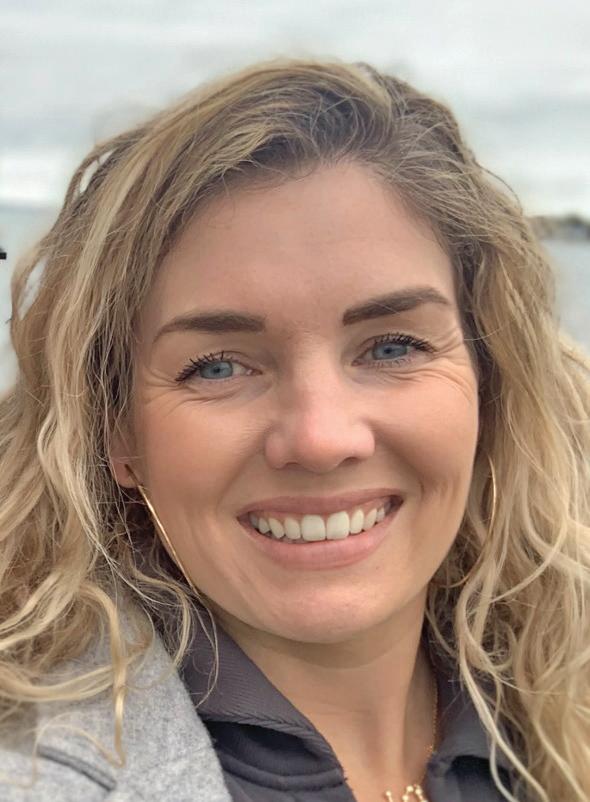
Local inspiration: There are so many incredible female leaders in this community, I can’t choose just one. First, Whitney Waara, COO of Traverse City Tourism: I admire her levity, positive attitude, and sense of humor. Whitney is a strong community presence and is consistently advocating for the best for Traverse City. Second, Amanda Blanck. She is a business owner, activist, ally, and empowers people daily to be the best version of themselves – both personally and professionally.
Regional economic impact: Through our successful Pit Spitters baseball seasons and special events, we have not only brought joy and excitement to the fans but have also significantly contributed to the local economy. By attracting visitors in our backyard, across the state, and beyond, we have bolstered tourism, and increased business for local hotels, restaurants, and shops. Our partnerships with local vendors and businesses have created a ripple effect, stimulating economic growth and providing job opportunities within the community. On our own, we employ nearly 150 part-time and full-time staff in the summer. And with the introduction of our Pit Spitters Community Foundation, our philanthropic initiatives and youth programs have fostered an environment that encourages local spending and investment in our long-term goal of building equity into the community we serve.
Next big thing: I am planning a climb of Mount Kilimanjaro in March!
Who knew: I sing and play guitar! I have previously performed as lead female vocalist for a ‘90s duo group called Tomcat and a seven-piece country band called Lucky Cochran and the Persuaders.
Alex Jensen, 28
Senior Minister, Unitarian Universalist Congregation of Grand Traverse
Volunteerism/leadership: Traverse City Philharmonic Sinfonia Civic String Orchestra, second violin; BSA Troop 34 of Traverse City, religious emblems coordinator.
Highlight: Holding a Sunday Service in celebration of Pride Month with a drag queen was one of my best professional moments ever.

Regional economic impact: Not sure how to answer this, but I think I would approach it by saying that what the world needs more of now are messages of justice, love, compassion, and connection. I’m proud to be a part of a faith community that lifts these values up in our wider community. Our ministry in these areas is contagious: We’ve seen great growth in the three years I’ve served as senior minister, with about 40 new people joining us.
Next big thing: I am just getting married later this month to my partner, but if this is coming out in September, I will have already been married! Another milestone is earning ‘Full Fellowship’ as a Unitarian Universalist Minister this coming November. This milestone means I will no longer be in ‘Preliminary Fellowship’ but will be a fully credentialed religious professional and minister with my tradition.
Who knew: Music, especially playing music with others, is one of my deepest spiritual practices. One of my favorite things to do is to pick up our instruments with friends and just play our hearts out.
Biggest fan: “After a nearly 12-month process in April 2021, all of us on the ministerial search team unanimously selected Alex, a soon-to-be graduate of Harvard Divinity School. And he selected us! Since then, congregation members and others in the community have been stirred by Alex’s compassion, caring and clear-eyed thinking for such a ‘young’ person. He excels in the areas of pastoral care, strong sermons that are often interspersed with humor, his own singing voice or his violin, and stories of his own family that make the point clear.” – Christine Walter, Unitarian Universalist Congregation of Grand Traverse




Employee Experience Manager, Cherry Republic
Volunteerism/leadership: Friends of Sleeping Bear Dunes, board member and communications committee; The Triathlon Club of Northern Michigan (MiTri), board member; Traverse Area Human Resources Association.

Volunteerism/leadership: Meetings Michigan; Meeting Professionals International, Michigan Chapter; Michigan Society of Association Executives (MSAE).
Highlight: I was honored to be a general session panelist at the MSAE annual conference last August in front of some 300 attendees. Being a guest speaker for a Central Michigan University sales class was also pretty special; the students were so fun and engaging!

Highlight: I made meaningful changes for employees at Cherry Republic through new data-based decision-making tools, such as stay and exit interviews and engagement surveys. I also increased our benefit offerings for staff, most notably including paid maternity and paternity leave. And I implemented a learning management system to better assign, track, and expand our professional development and on-thejob training curriculum.


Local inspiration: Roni Hazelton, VP of distribution and fulfillment at Cherry Republic. When I first started my career here, I looked up to Roni. It was inspiring to see all she has done with her career in this small town while raising a family and being an active part of her community. I also really appreciate how she brings a female voice into a male-dominated industry.
Regional economic impact: For me, it is all about our staff. My job is to create the best place to work, which in turn leads to the best environment for costumers to come visit and spend their time. A more engaged staff leads to more sales, more jobs, and more people moving to and living in northern Michigan.
Next big thing: I am excited to tighten up our internal professional development and customer service curriculum, so that we can promote it to other companies around the area who service all of our seasonal visitors. We’ll use this training to continue to make northern Michigan the best place to visit, live, and work.
Who knew: I love triathlons, swimming, biking, and running, and I truly believe anyone can be a triathlete! As for my secret talent? I am a classically trained singer.
Local inspiration: Scott Chouinard, our vice president of finance and assistant general manager here at Grand Traverse Resort and Spa. Scott’s knowledge and dedication to the growth and betterment of both our property and our team is something I very much admire and look up to. He’s a calm and constant leader that motivates and challenges us professionally while also always reminding us about the importance of integrity and character.
Regional economic impact: The Sales team is responsible for between 60,000 and 65,000 room nights annually, and those visitors greatly impact not only us but also northern Michigan’s local businesses, our airport, and our region’s economy.
Who knew: I once spent two years as a stewardess on a 170-foot mega yacht traveling the Caribbean.
Biggest fan: “Katie is a strong leader, a team player, and an outstanding communicator. She has all the attributes that lead to success in her sales job, but her passion does not end at the doors of Grand Traverse Resort and Spa. She has an eye that keeps a vigilant look at the travel market throughout the region, and her success in sales becomes our success in the travel industry in our region.” – Caroline Rizzo, Grand Traverse Resort and Spa

Associate Director, Inland Seas Education Association
Volunteerism/leadership: The Friendship Community Center/LIFT; Rotary Club of Suttons Bay-Leelanau County; Leelanau Community Choir; Leelanau Curling Club; Boardman/Ottaway River Network.
Highlight: ISEA is in a period of exciting expansion as the demand for our programming grows both locally and throughout the Great Lakes region. We have added a second schooner, increased our staff, grown our internship program, and developed new programs over the past year.
Local inspiration: Rebekah TenBrink,
Courtney Lorenz, 33
Founder & Idealist, Cultured Kombucha Co.
executive director of LIFT and the Friendship Community Center, because her leadership and decision-making is deeply rooted in her values. She is a heart-driven and grounded leader, who cares for her community and shows up every day to do the work and build the relationships necessary to make it stronger.
Regional economic impact: As an organization, we support a full-time staff of 11, seasonal staff of four, and five interns who, alongside our robust volunteer community, make our work possible. In addition, thousands of people visit ISEA’s campus and ships every year. They not only participate in our programs, but they also stay in the region, purchase food, shop, and recreate.
Next big thing: Building a regional network of educators, environmental organizations, advocacy groups, and governmental agencies that work in tandem to support Great Lakes stewardship and literacy for K-12 students by connecting them with their local watershed in meaningful and engaging ways.
Who knew: I farmed for a season at the northernmost certified organic farm in the United States, growing vegetables near Fairbanks, Alaska. We had to chase moose out of the fields with a tractor.
Volunteerism/leadership: Big Brothers Big Sisters; American Culinary Federation; MAP Michigan Abolitionist Project; Kombucha Brewers International; International Center for Reiki Training.
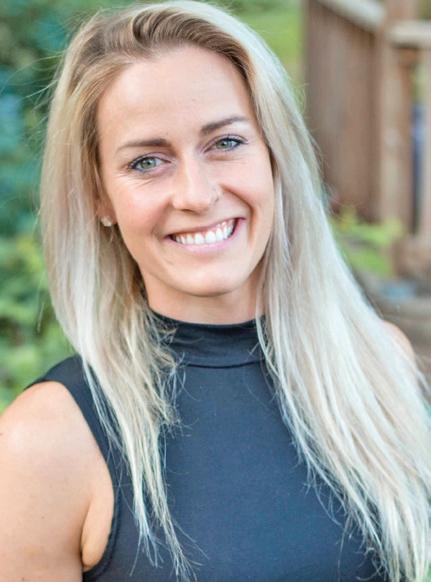
Highlight: This year, Cultured expanded its distribution to Ohio, Indiana, Illinois and Wisconsin. We refreshed our branding, updated our facility infrastructure, and ventured into a new division of co-packing for other organic product lines. Additionally, I launched Mandy & Marlee Mobile Bars with a friend, introducing a fleet of mobile bars designed to make your next event unforgettable!
Local inspiration: Tanya Berg, a dedicated marketing mentor with SCORE, has consistently volunteered her time, efforts and talents to nurture the growth of startups in the Grand Traverse area. Tanya has fundamentally transformed the way I view marketing as we scale outside the Michigan market.
Regional economic impact: Cultured has significantly expanded its network, enhancing our brand’s potential for greater impact. This year, with our brand refresh, we launched a philanthropic arm, dedicating 1% of our profits to efforts aimed at ending human trafficking. It has been immensely rewarding and fulfilling to bring awareness to such a pressing issue within our regional community.
Next big thing: If I tell you, it takes away the plot twist! This fall, I have a new product line launching that focuses on holistic healing. It will focus on natural ways to work through auto-immune conditions.
Who knew: I’ve been practicing jiu-jitsu and (mixed martial arts) for the last year. It started as self-defense training, but I’ve grown to love the challenge. It’s the art of folding clothes, while you’re still in them!

WEDNESDAY SEPT 4 • 5PM-7PM
From the “Bank of the Boardman” a breezy Recess at West Shore Bank
NET PROCEEDS TO BENEFIT THE supplying students in need with anything from school supplies to personal hygiene products.

• 2-night stay at Pine Tree House: 1 bedroom/1 bath with river views and balcony. Value up to $850. (July/August excluded)
• Gift basket featuring goodies from the Blue Goat and a Blue Goat gift card. Value $100.
• Private educational tasting experience at the Blue Goat for up to 6 guests. Value $150.
Food from NOBO Market; beer and wine from Blue Goat. $10 entry.
Recess is brought to you by













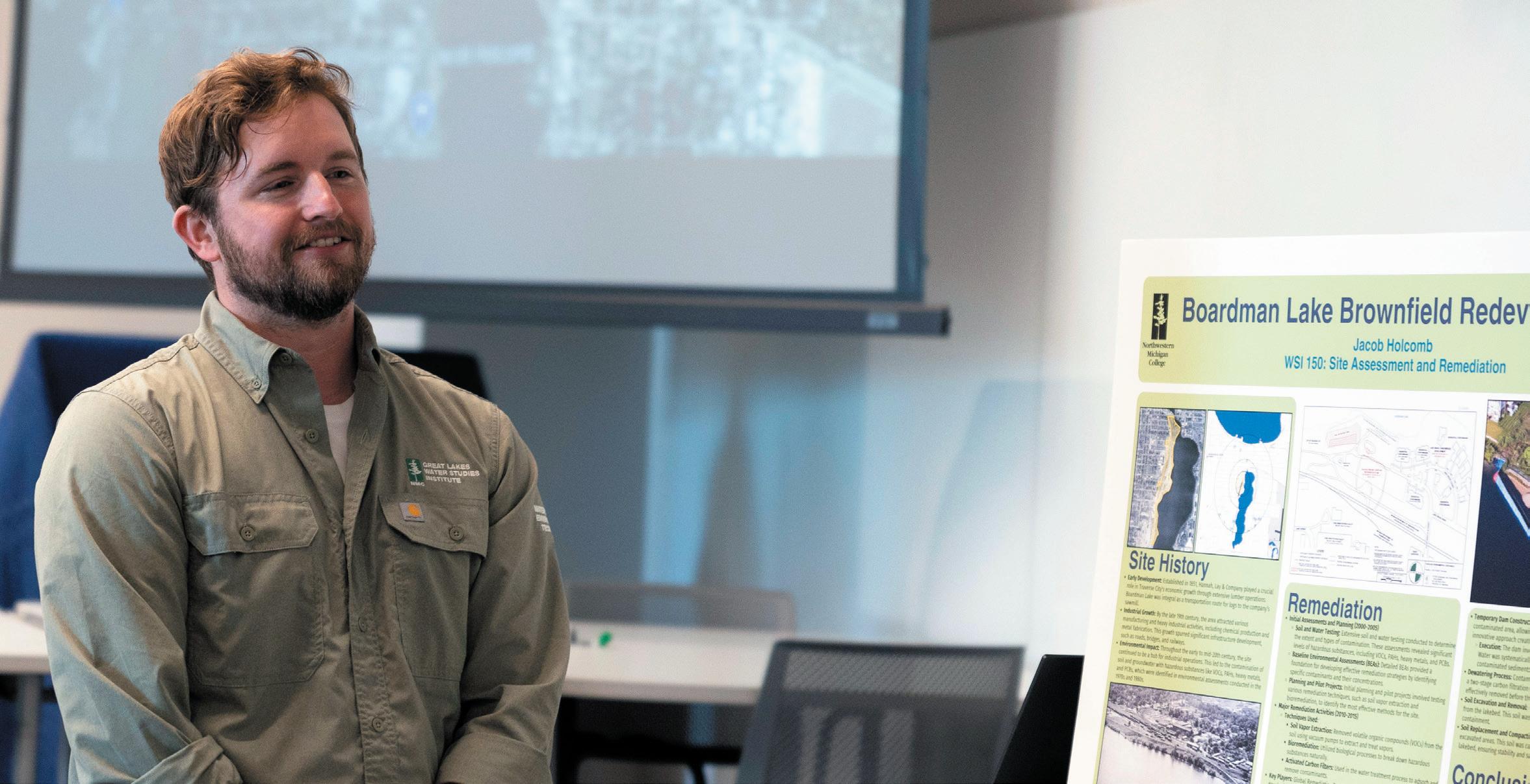

Amanda Maly, 37
Assistant General Counsel, Munson Healthcare
Volunteerism/leadership: Munson Healthcare and the Northwest Food Coalition. I’ve also volunteered for Traverse City Track Club’s races when I’m not running their races myself!
Highlight: The need for primary care providers across northern Michigan (and the country) has grown over the last few years. I’m proud to provide legal support for Munson’s primary care service line, including provider contracts and day-to-day legal issues, and for initiatives that increase access to care, such as Munson’s Virtual Urgent Care.
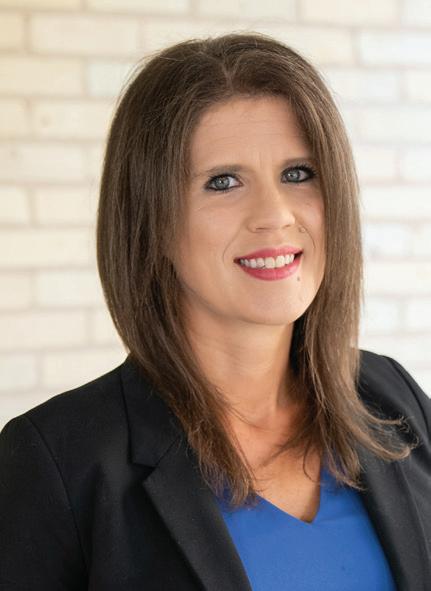
Local inspiration: Laura Glenn, chief operating officer at Munson Healthcare. Professionally, Laura is hard-working, intelligent, and a strong leader. Personally, she’s a dedicated mom and wife, and not to mention a marathon runner. Her ability to balance her career, family, and running is truly inspirational.
Regional economic impact: Health care is an important part of the economy, both by keeping community members healthy so that they can support local businesses and by providing a place of employment. Being a part of Munson’s legal team allows me to support Munson Healthcare in its commitment to supporting the health of northern Michigan.
Next big thing: Getting married in a few weeks! My fiancé Doug and I are looking forward to having our wedding and celebrating with our family and friends in Traverse City.
Who knew: I’m an avid football fan who grew up a Lions fan and grew into a Browns fan while attending law school in Cleveland. On football Sundays, I’m running on the TART Trail or by the bay wearing one of my team’s colors in the morning and watching one game on the TV and another on the tablet in the afternoon.
Marc S. McKellar II, 38
Partner Attorney, Kuhn Rogers, PLC
Volunteerism/leadership: Kingsley Downtown Development Authority; Kingsley Brownfield Redevelopment Authority; Adams Chapter of Trout Unlimited.
Highlight: Working with Cherry Republic and Village of Empire in acquiring approval for Cherry Republic’s significant expansion of its essential non-retail operations. Such expansion will centralize Cherry Republic’s non-retail operations in Leelanau County.
Meghan McDermott, 33
Deputy
Director,
Groundwork Center for Resilient Communities
Volunteerism/leadership: Groundwork Center, Food Rescue, Commongrounds Cooperative.
Highlight: In March we were able to take all 24 Groundwork staff members to an organizational retreat in Detroit and speak to folks working toward solutions in food, transportation and energy systems. It was incredibly rewarding to see how our work resonates outside of Northwest Lower Michigan and to learn from other communities about how we might approach our work.

Local inspiration: Kate Redman, co-CEO of Commongrounds Cooperative. Kate is an absolutely brilliant, kind, thoughtful professional who brings her immense skillset to building community in a way that few have even attempted, let alone succeeded in.
Regional economic impact: It continues to be an incredible honor to work with and build community alongside so many passionate people in this region. Food pantries from our six-county region now purchase more locally grown fruits and vegetables than the largest food bank in Arizona!
Next big thing: I’m getting married next August!
Who knew: If you’ve been on a Zoom meeting with me in the last two years you likely know this, but for a (thankfully) brief period of time we housed a stray mama cat and her four kittens, which occasionally meant I had seven (!!) cats running around in my home office.

Local inspiration: I have had the great fortune to work with people that are fascinating and bring value to a conversation. But the common traits I aspire to have are pragmatism, humble confidence, humanity and passion for the work and people. The people that I think of most often who have these traits are Bob Sutherland, Connie Deneweth, Eddie Ascione and Joe Quandt. It’s these people and others that I draw on to learn from their best qualities.
Regional economic impact: I’m only as good as the client’s proposal is strong. The engineers, planners and developer client have just as much, if not more, of a role in the economic success. I am grateful to have contributed to our region’s economy through my legal work in real estate development and land use. While it is a team effort, I know the projects have helped spur growth, create jobs, and improve community infrastructure.
Next big thing: In the last year the Kingsley DDA worked with the County Land Bank to acquire a significant set of properties on M-113 in downtown Kingsley for redevelopment. I am excited to work on the project as a member of the DDA. It will be truly transformative for the Kingsley community.
Who knew: I have a terrible weakness for great scotch and fine cigars.

Taylor Moore (he/him), 33 Director, Food Rescue

Volunteerism/leadership: Northwest Food Coalition; Big Brothers Big Sisters; Leelanau Conservancy; Michigan Local Food Council Network; Food Rescue Alliance; National Right to Food Community of Practice; MSU Extension; Cleveland Township Planning Commission
Highlight: As of this summer, Food Rescue has completed a three-year, $1.25 million warehouse and fleet upgrade. These improvements have increased our capacity to rescue, repack, store and distribute more food than ever before. Because of these upgrades, in 2023 we doubled the amount of farm pickups and local produce distributed. With the addition of a new freezer this spring, we are set to triple the amount of frozen vegetables we distribute.
Local inspiration: Deb Lake, chief philanthropy officer at Goodwill Northern Michigan, for her ability to handle large-scale projects, her constant desire to learn more, her commitment to recognize the work of our staff and employees, and her high standards for services we provide. She has played a vital role in the expansion of Food Rescue and has shown how to set and accomplish ambitious goals.

Regional economic impact: Because of our transportation and logistical infrastructure, Food Rescue has been able to help secure over $700,000 in funding to purchase produce and proteins directly from local farms. In collaboration with the Grand Traverse Band of Ottawa and Chippewa Indians, Groundwork Center, Feeding America West Michigan, and the Northwest Food Coalition, we will purchase over $250,000 in local produce this year and distribute it to pantries and meal sites throughout the region. Studies estimate multiplier effects for spending on locally produced foods to be between $1.32 and $1.90, which means that for every dollar spent on local products, there is between $.32 and $.90 worth of additional local economic activity. This economic multiplier is two to three times greater than purchasing produce from non-local businesses.
Next big thing: I am a current graduate student at the University of Edinburgh, studying social justice and community action. I remain committed to organizing social service providers to leverage community resources and enact the change needed to address the structural inequities that maintain and produce poverty, food insecurity, homelessness, and harm.







fan while attending law school in Cleveland. On football Sundays, I’m running on the TART Trail or by the bay wearing one of my team’s colors in the morning and watching one game on the TV and another on the tablet in the afternoon.
Partner Attorney, Kuhn Rogers, PLC
Volunteerism/leadership: Kingsley Downtown Development Authority; Kingsley Brownfield Redevelopment Authority; Adams Chapter of Trout Unlimited.

Highlight: Working with Cherry Republic and Village of Empire in acquiring approval for Cherry Republic’s significant expansion of its essential non-retail operations. Such expansion will centralize Cherry Republic’s non-retail operations in Leelanau County.
Local inspiration: I have had the great fortune to work with people that are fascinating and bring value to a conversation. But the common traits I aspire to have are pragmatism, humble confidence, humanity and passion for the work and people. The people that I think of most often who have these traits are Bob Sutherland, Connie Deneweth, Eddie Ascione and Joe Quandt. It’s these people and others that I draw on to learn from their best qualities.
Regional economic impact: I’m only as good as the client’s proposal is strong. The engineers, planners and developer client have just as much, if
Moore (he/him), 33
Volunteerism/leadership: Northwest Food Coalition; Big Brothers Big Sisters; Leelanau Conservancy; Michigan Local Food Council Network; Food Rescue Alliance; National Right to Food Community of Practice; MSU Extension; Cleveland Township Planning Commission
Highlight: As of this summer, Food Rescue has completed a three-year, $1.25 million warehouse and fleet upgrade. These improvements have increased our capacity to rescue, repack, store and distribute more food than ever before. Because of these upgrades, in 2023 we doubled the amount of farm pickups and local produce distributed. With the addition of a new freezer this spring, we are set to triple the amount of frozen vegetables we distribute.

Local inspiration: Deb Lake, chief philanthropy officer at Goodwill Northern Michigan, for her ability to handle large-scale projects, her constant desire to learn more, her commitment to recognize the work of our staff and employees, and her high standards for services we provide. She has played a vital role in the expansion of Food Rescue and has shown how to set and accomplish ambitious goals.
Regional economic impact: Because of our transportation and logistical infrastructure, Food Rescue has been able to help secure over $700,000 in funding to purchase produce and proteins directly from local farms. In collaboration with the Grand Traverse Band of Ottawa and Chippewa Indians, Groundwork Center, Feeding America West Michigan, and the Northwest Food Coalition, we will purchase over $250,000 in local produce this year and distribute it to pantries and meal sites


VISION
With tight time constraints, build a new 15,000-square-foot plant to house first-of-its-kind veneer manufacturing equipment.
Burdco is the kind of contracting partner we love to work with.They’re responsive, trustworthy, and overall the experience was virtually seamless. We’d work with them again in a heartbeat.
Jim Izzard
Manufacturing Director, Manthei Wood Products
Jeremy Manthei
President, Manthei Wood Products
Mike Brown Owner, Burdco
Dan Pater
Project Manager, Burdco







As our Manager of Strategic Communications, thank you for your commitment to creating communities that are adaptive and thriving for everyone and for collaborating with grantees and changemakers to tell compelling stories that inspire action and lead to lasting community change.

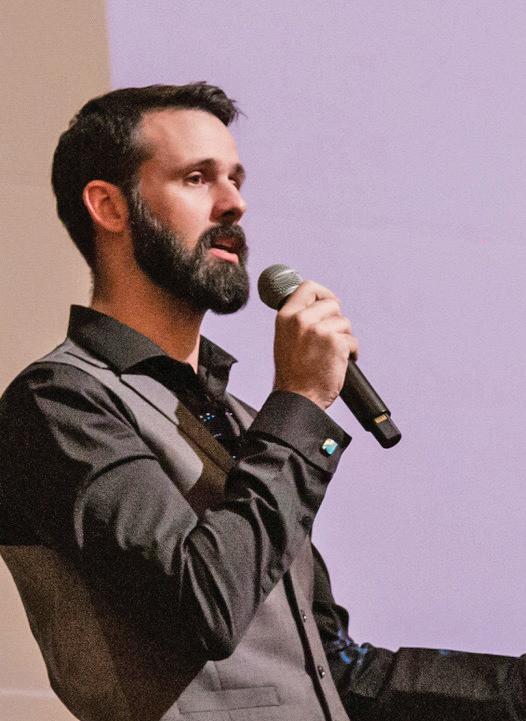
Owner/Co-Founder, Ace Virtual Agency
Organizations actively involved in: Foreword Reviews INDIES Book of the Year award director; Friends of Home of Dreams Orphanage Small Business Consulting Community; TCNewTech event director (2022-2023); 3D Printing PLC Initiative (since been absorbed).
Highlight: The greatest highlight of this year is witnessing the growth, evolution, and success of programs and individuals whom I’ve guided, counseled, or provided strategic support. Seeing the transformative power of time, perseverance, and guidance in both company and individual success is incredibly rewarding.
Local inspiration: Jennifer Szunko at Discovery Cruises is an entrepreneurial powerhouse with unparalleled style. Her constant engagement with the community, effortless referrals, and pursuit of opportunities on her own terms make her an inspiring mentor since my ‘boomerang’ return to Traverse City in 2022.
Regional economic impact: Working with TCNewTech for nearly two years was a career highlight. During my tenure, I not only attracted talent to the TC area but also connected them with crucial resources for entrepreneurial success. This contributed significantly to economic development and regional investment. Additionally, the 3D Printing PLC Initiative injected resources into Grand Traverse school systems, supporting STEM curriculum and bolstering the future manufacturing workforce.
Next big thing: One of my most influential mentors taught me the power of working in silence. So I will not be sharing specifics. Currently, I’m deeply immersed in several ambitious projects, and I anticipate significant personal breakthrough within the next 12 months.
Who knew: I once hiked Angels Landing at Zion National Park – five miles round trip with over 3,000 feet elevation gain – in dress shoes, enduring scorching 110-degree heat.
Chelsie Niemi, 32
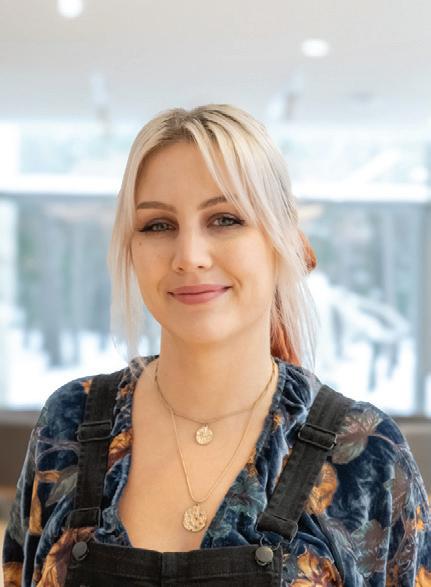
Audience Engagement & Communication manager, Dennos Museum Center at Northwestern Michigan College Volunteerism/leadership: Vice chair, Traverse City Arts Commission; events team volunteer, Michigan Museums Association conference.
Highlight: I presented for the first time at the Michigan Museums Association conference in October on my experience in the Michigan Rising Leaders Program through the Michigan Arts and Culture Council. My other proudest moment would be the success of the museum’s seasonal program we launched this past year. With the help of museum staff, we transitioned from multiple exhibition, concert, and other event mailings to the program, which was a risk, but we’ve received a lot of positive feedback on it.
Local inspiration: I’m inspired by so many people, especially by local small business owners and non-profit leaders, but if I had to choose one person I would say Brittany DeFilippo. She’s been the graphic designer for some of my favorite businesses around town, including Common Good Bakery, Slip Vintage and Second Hand Social Club, and she’s even designed several merch products for the museum. Traverse City is lucky to have so many creative and innovative folks around town, and I think they don’t get enough recognition for their contributions to our community.
Regional economic impact: Based on data from the last U.S. Bureau of Economic Analysis report, the arts and culture sector makes up 2.7% of Michigan’s economy and added over $15 billion in value and over 100,000 jobs in the state. While all those things are great, and we know that investment in the arts is good for the regional economy, the impact that I personally have isn’t measurable in that way. I like to think that my work adds to the richness of experiences that locals and tourists alike can have in our region, that having a world-class art museum is special in a city of our size, and that we add to the vibrancy of northern Michigan.
Next big thing: By the time this is published in September, I’ll be a first-time mom and learning how to create a new healthy work-life balance.


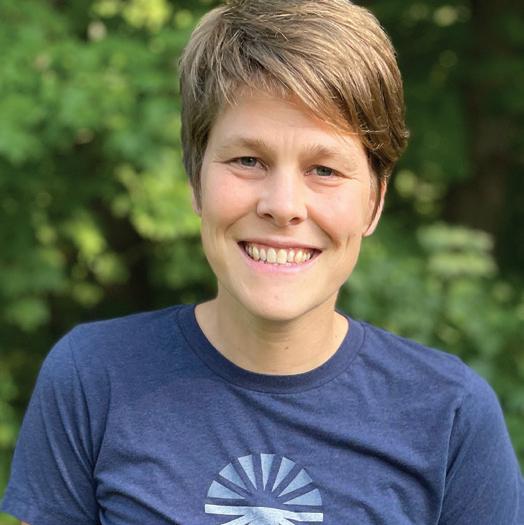

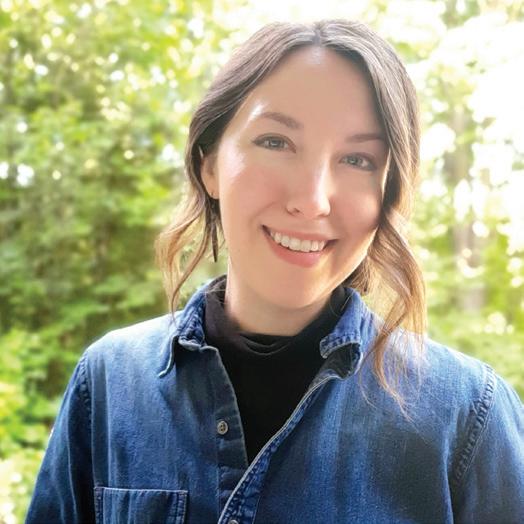






with TCNewTech for nearly two years was a career highlight. During my tenure, I not only attracted talent to the TC area but also connected them with

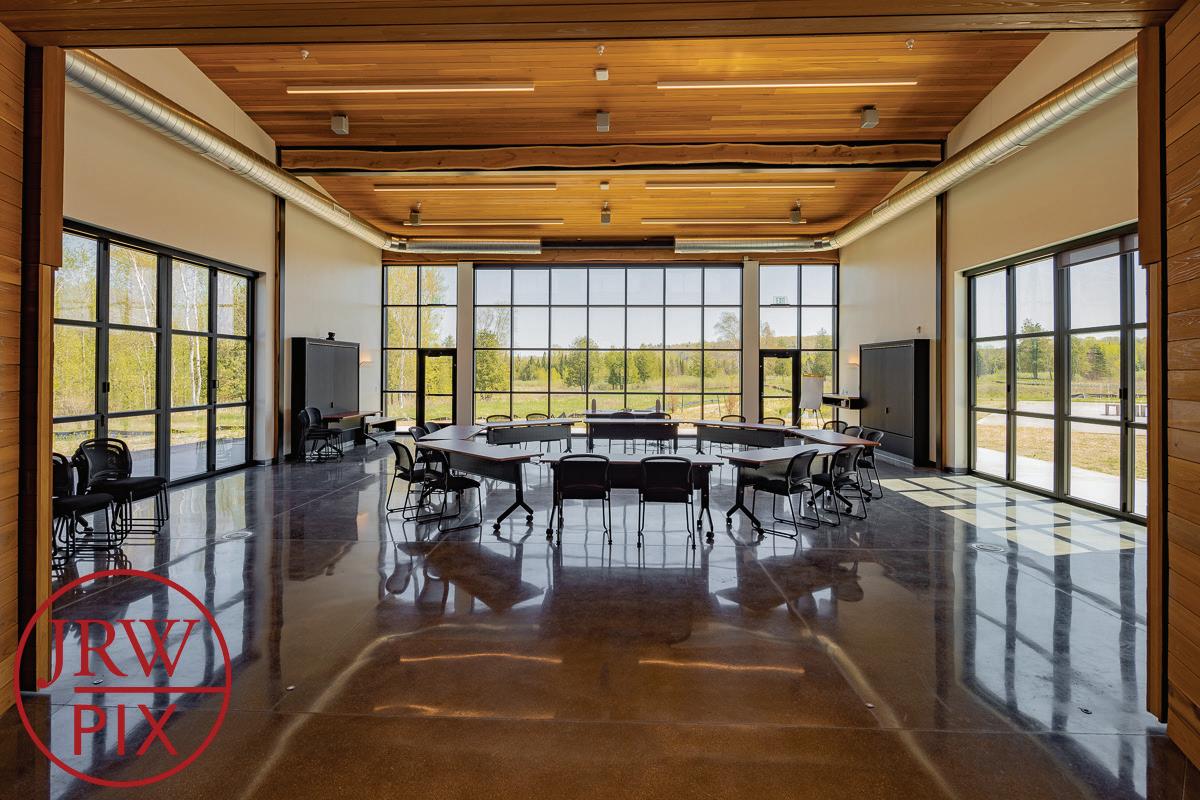
Enrollment Services Assistant, Northwestern Michigan College
Volunteerism/leadership: Traverse City Planning Commission; Traverse Together; Dennos Museum Center; Sara Hardy Farmers Market Advisory Board;Traverse Heights Community Garden; Brownfield Redevelopment Authority
Highlight: As a member of the Brownfield Redevelopment Authority, on April 25 we passed the first affordable housing project. The state legislature allowing developers to tap into brownfield TIFs for affordable housing was a positive move forward. This particular project was important because it was one of the first in our region and everyone learned a lot: the board, the developer and county staff. I’m excited to see more affordable housing projects using brownfield funds to help address our region’s housing needs.

Local inspiration: Gary Howe has been a tireless advocate for a better Traverse City for years and a great mentor. I don’t know if we’d have as strong a bike, walk and roll culture without him. He’s taught me that advocacy isn’t always loud or sensational, that it’s often asking questions of the appropriate authorities and getting them to think differently, and always understanding that there will be compromises. He also taught me that success for an advocate is being offered a seat at the table to make decisions.
Regional economic impact: I helped to establish the city’s first Social District. I’m friends with the business owners and, at the end of the day, it was about helping my friends be more successful. Even though we got a significantly reduced outline, I’m still looking forward to having a space where I can sit outside and socialize with my friends and family. We need to prove there is a better use for flat, paved surfaces, that we can spread the wealth that is pedestrian traffic throughout the city, and that our streets can be for more than moving cars.
Next big thing: When we make things better for the next generation, we inherently make things better for ourselves. That’s why I’m working with the group Traverse Together to educate people on the importance of TIFs in our area.
Real Estate Professional, Re/Max Bayshore; O’Grady Development Co.
Volunteerism/leadership: Grand Traverse Conservation District; Home Builders Association of Northwest Michigan.



Highlight: Besides the Lions going to the NFC Championship, I would have to say that one of my proudest professional moments has been creating and building a team of real estate professionals. I proudly started the Live Traverse City Real Estate Team under the Re/Max Bayshore umbrella. I have always aspired to be in a leadership position that allows me the opportunity to share my experience and expertise with other driven entrepreneurs.
Local inspiration: Bob Brick has inspired me since the moment I met him, both professionally and personally. His wisdom has provided me with the most sincere insight on business and life.
Regional economic impact: When I reflect, I feel an immense amount of gratitude. I enjoy being a part of the conversation surrounding the real estate industry and I hope to continue to be in a position to positively contribute to the region’s community and economy.
Next big thing: Since I started reading the TCBN, it has been a big goal of mine to be honored among my fellow peers in the 40Under40. So for now, I will appreciate this opportunity! Moving forward, I plan to continue serving my clients and teammates, while doing my best to involve myself in meaningful discussions surrounding local politics and economy. I want to continue to grow our region in a meaningful way.
Who knew: I love making and listening to music, shooting and editing videos, creating on social media, etc. Interacting with people online is one of my favorite pastimes.



Strategic Communications Manager, Rotary Charities of Traverse City
Volunteerism/leadership: Rotary Club of Traverse City.
Highlight: This past year has been incredibly fulfilling, marked by significant milestones both personally and professionally. The most profound highlight was becoming a mom. This life-changing experience has brought immense joy and a new perspective on balancing personal and professional commitments. Professionally, my involvement in the Rotary Club’s Vision and Rotary Charities’ Strategic Plan has been a major highlight.
Local inspiration: As a new mom I find inspiration in the resilience, hard work, and ability to balance so much at once that I see in other working mothers. From societal expectations to the daily logistical hurdles, we face many obstacles, and juggling it all requires an extraordinary level of organization, time management, and emotional strength.
Regional economic impact: I am proud of the work I have done throughout my career in the nonprofit and philanthropic sector, collaborating with changemakers to tell compelling stories of impact and orchestrating opportunities for the exchange of ideas and resources.
Who knew: Before beginning my career in nonprofit work, I had a deliciously different professional path. During high school and college, I worked at Grocer’s Daughter Chocolate, where I was immersed in the art of chocolate making.
Biggest fan: “We work side-by-side and bounce ideas off each other, look for ways to improve together. Rotarianism is in Miriam’s blood – she’s a fourth-generation Rotarian and takes it seriously. She’s 31 and takes service over self to heart.” – Kendra Luta, Grants and Learning Manager, Rotary Charities
Tyler Palsrok, 35

General Manager, Image360
Volunteerism/leadership: Big Brothers Big Sisters; Harvest Bible Chapel Worship Team (bass player)
Highlight: I started as a Big for BBBS, which has been a wonderful experience. We won the Alliance Franchise Brands award for Project of the Year, as well as a pair of Silver Addy awards from the American Advertising Federation. We have added new equipment/capabilities and new product lines, but we are most proud of our employee ownership program, which we launched earlier this year and already have team members invested.
Local inspiration: Troy DeShano, associate director, Northwest Michigan Arts & Culture Network. I think the mission of the

Volunteerism/leadership: Traverse Area Human Resources Association; Michigan Career Educator & Employer Alliance.
Highlight: Earning my SHRM-CP certification. My background is in accounting, but I’ve found my passion is in talent management and employee development, so earning a credential aligned with my career path was so rewarding.
Local inspiration: Jason Homa, vice president of sales at Cherry Republic. The way he engages with his people and works to develop them in the ways they want to grow is admirable. He is genuine in his leadership and committed to making a positive and lasting impact on the communities he is a part of. I am thankful to learn from him and work alongside him.

Labor & Employment Attorney and Co-Founder of DAR Law
Volunteerism/leadership: President of Impact100 Traverse City; Trustee of the Board of Trustees for the Old Town Playhouse; Traverse Area Human Resources Association; Michigan and Virginia State Bar associations.
Highlight: With my business partner Cortney Danbrook, we have completed our seventh year of business ownership and self-employment, experiencing an unprecedented pandemic and many personal and professional milestones together. I am lucky and grateful to be on this ride with her. We both are extremely grateful for our community’s support and trust over the years!
Local inspiration: Leslie and Russ Knopp. They are business own-
Northwest Michigan Arts & Culture Network is extremely important, pushing the arts to the forefront of our collective thinking as a community and functionally supporting working local artists and arts-based organizations.
Regional economic impact: We take great pride in helping local businesses develop their branding and address their visual communication needs. However, our top priority will always be providing an incredible work environment and sustainable, well-paying jobs for our team members. Ultimately, I believe our biggest impact on the local economy will be guiding more of our team members toward ownership stakes so they can reap the rewards of their efforts. By doing so, we hope to create a model for employee-owned cooperatives that positively impacts the succession plans of other local businesses in a way that benefits their employees.
Next big thing: Looking forward to finding more ways to serve our community in the coming year and expanding our employee ownership program.
Who knew: I used to be a journeyman blacksmith.
Regional economic impact: As a recruitment manager overseeing staffing for 10 locations around the state of Michigan, I’ve been able to creatively partner with many wonderful organizations in our community and others around the state to bring people to northern Michigan and/or stay working within our region. I have enjoyed engaging in conversations with others in our community regarding staffing strategies in different industries at a time when staffing, especially seasonally, can be challenging. I’m excited to continue to grow these talent pipelines and work alongside others in our community to recruit and retain strong northern Michigan talent.
Next big thing: I am serving as the co-chair for the 2025 Michigan Career Educator and Employer Alliance (MCEEA) Conference and as the Northern Michigan Region Representative for MCEEA. MCEEA works to connect higher education institutions with employers in the state to foster talent pipelines for entry-level positions. Our beautiful corner of the state has so much potential to bring more and more young talent to the area and I’m happy to be aiding in those conversations.
Who knew: I played collegiate volleyball for Albion College as a setter.
ers and community builders who relentlessly give back and lift others. They are genuine and authentic leaders, and I am lucky to know them!
Regional economic impact: At DAR Law, I am able to directly impact, counsel and assist numerous businesses and employers in our region. At Impact100 Traverse City, by the end of 2024, we will have directly awarded over $2.4 million to our community nonprofits in just over eight years. Our grants enable these nonprofits to deepen and expand their services and address important community needs that may otherwise go unfunded.
Next big thing: I turn 40 in early October and cannot believe how fast time is flying. While that may be the end of my consideration for this honor, it really is just the beginning of a life well-lived!
Who knew: For the past few years, I have worked with other brave parents to help put on (and even emcee at one point) the Eastern Elementary Talent Shows. The kids (from 1st through 5th grades) rehearse many hours. From magic tricks and jokes to dancing and singing, it is so much fun to watch them build confidence and shine in front of their whole school.

Funeral Director and Co-Owner, Reynolds Jonkhoff Funeral Home
Volunteerism/leadership: TC Philharmonic, board secretary; Michigan Board of Examiners for Mortuary Science, member (appointed by Gov. Gretchen Whitmer)
Highlight: This past May, I was especially proud to help host our first annual Hope for the Grieving Heart event. We partnered with Michael’s Place, Heartland Hospice, Hospice of Michigan, and Monarch Home Health, and we offered a safe place for folks to gather, hear helpful tips for grieving, and do special crafts to remember their loved one. Our next event on November 14 will focus on tips for grieving during the holidays.

Local inspiration: Susan Cogswell. She is a passionate advocate for many organizations, but especially for the TC Philharmonic. Her energy and joie de vivre are inspiring, and she is always kind, professional, and gracious. I am so honored to serve alongside her on the board, and look forward to the opening of the Community Music School in the TC Philharmonic Center, located in the former Cherryland Mall.
Next big thing: As a company, we are always looking for new and creative ways to help care for the families we serve. I am passionate about removing the stigma surrounding death and fostering transparency in conversations about it. I believe it’s crucial to share with people how profoundly helpful a service can be in processing death and grief. My goal is to convey the genuine support and comfort such services can provide, regardless of the type or size.
Who knew: I am honored to be a sixth-generation funeral director, and to carry on my parents’ legacy of meaningful funeral service alongside my sister. We are two of only a handful of sixth-generation funeral directors in the world, and feel very lucky to be on this journey together.
Ashley Rudzinski, 37
Climate & Environment Program Director, Groundwork Center for Resilient Communities
Volunteerism/leadership: Oil & Water Don’t Mix Steering Committee; Michigan Climate Action Network Advisory Committee; MI Sierra Club Political Committee.
Highlight: In spring of 2024, I coordinated Groundwork’s widely attended ‘Tunnel Vision’ event, focused on shutting down Pipeline 5 and rejecting Enbridge’s oil tunnel proposal. Esteemed speakers highlighted climate concerns, threats to tribal sovereignty, legal status, and engineering issues with the proposal.

Local inspiration: There are many local folks who inspire me professionally, but I’d be remiss not to mention Hans Voss. Hans will be leaving Groundwork this year after an impressive 30 years at the helm. He brings so much energy, passion, conviction, and heart to our work. We can’t wait to see what his next chapter brings!
Regional economic impact: I am proud to be working to advance the clean energy economy of our region through my leadership with the Great Lakes Business Network, Groundwork’s Access MI Solar program, and through our regional solar on schools work. Together, we are helping to reduce our reliance on polluting fossil fuels and pave the way for equitable and affordable clean energy.
Next big thing: I am excited to be tying the knot to the love of my life!
Who knew: In what feels like another lifetime, I lived in a tent and studied leatherback and green sea turtles on the beaches of Equatorial Guinea for eight months. Following that, I worked on research teams studying frogs in Australia, sea turtles in Georgia, and the Gunnison sage grouse in Colorado.
Ashley Sloat, Ph.D., 38
President and Director of Patent Strategy, Aurora Patents
Volunteerism/leadership: 20Fathoms’ board member, sponsor, and coworking space member; NMC Oops instructor; Wareologie Inc. board; sponsor of the AquaAction AquaHacking event
Highlight: My proudest moment in the past 12 months is finally finding pathways in the ecosystem through which I can positively impact inventors, companies and entrepreneurship in the region more generally. I love being a part of a community, and I am excited and proud to have found ways to embrace the Grand Traverse region community.
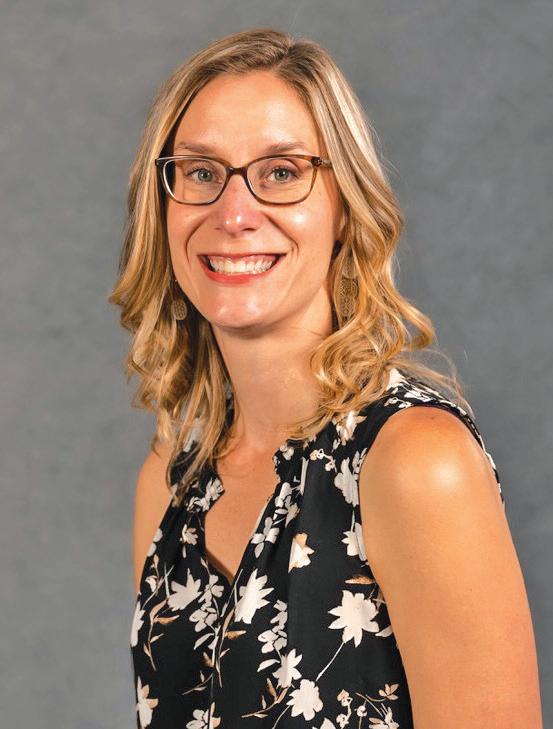
Local inspiration: My husband Josh Sloat inspires me daily. Honestly, there is not much we don’t do together. Whatever ways we are acting in the community, we are rarely acting alone. If you get one of us, you get the other. I have learned so much from his years in tech and we’ve pushed and pulled each other over the past ten years to raise beautiful kids, build our successful company, Aurora Patents, and to become beacons in the community.
Regional economic impact: My goal (and hopefully impact) has been to encourage and support inventors on their journey – particularly in intellectual property matters – but generally by providing resources, a listening ear, or an encouraging word. This has led me to donate my greatest asset – my time – participating on boards, sponsoring events, and providing educational content.
Next big thing: I don’t have as much a next big thing as I have a desire to maintain all the good things – family time, business growth, and community support. If I can keep all those plates spinning, I will consider that a great achievement.
Who knew: I lived in Fargo during my undergraduate studies but never came across a wood chipper.
Transportation Program Manager, Groundwork Center for Resilient Communities
Volunteerism/leadership: Michigan Association of Railroad Passengers.
Highlight: My proudest moment over the past year was receiving notification that the Michigan North+South Passenger Rail Project had secured federal and state grant funds so that we, along with our project partners, could begin working on the next phase of planning for the train.
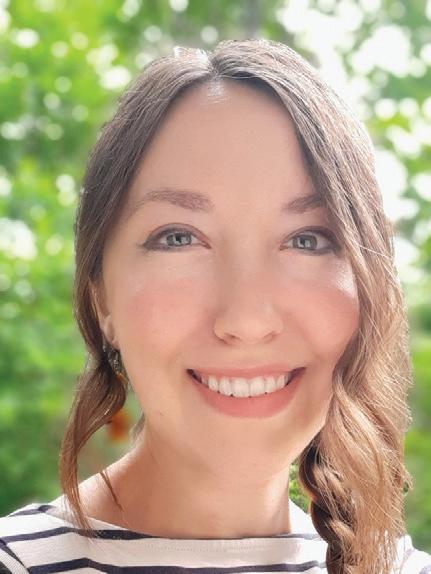
Local inspiration: Russ Soyring spent over 30 years working as Traverse City’s planner. So much of what we see around the city today is because of his devotion to creating great places and spaces for people.
Regional economic impact: If we can bring a new passenger train to Michigan, the station communities could see big economic boosts. Towns with rail services tend to attract new businesses and are desirable places to live, which could entice young professionals back to Michigan and expand transportation options for aging adults.
Next big thing: I became a mother this past year! With our son changing so much each day, week, and month, it feels like a new challenge and adventure is always on the horizon.
Who knew: I went to Peru after graduation to study non-timber forest products (plants of great value that are renewable and aren’t lumber). Seeing the forest perpetually providing food made me want a ‘food forest.’ We currently have 13 perennial edible plants on our property and have plans for more.

Henry Wolf, 32
Director of Policy and Grant Programs, Michigan Office of Rural Prosperity
Volunteerism/leadership: Boyne City 4th of July Festival; past consistent volunteer efforts for Habitat for Humanity of Saginaw and Shiawassee County; Student Statesmanship Institute; Michigan State University 4-H Capitol Experience.

Highlight: Securing $15 million for the Freshwater Research and Innovation Center. I’m very thankful for the support from Gov. Gretchen Whitmer, Lt. Gov. Garlin Gilchrist, Sen. John Damoose and our Grand Traverse regional legislators for getting that across the finish line. I’m thrilled that I have the chance to maintain the momentum on this project in my new role with the Office of Rural Prosperity.
Local inspiration: Dave Mengebier and the rest of the Traverse Connect Government Relations Committee. These people are truly committed to their community, and have a keen understanding of how to get tangible results from Lansing and Washington, D.C.
Regional economic impact: It is exciting to think about the new jobs and economic activity the Freshwater Research and Innovation Center will bring to the Grand Traverse Region. I’m also thrilled about the positive impact the Rural Readiness Grant Program will have on small, rural communities throughout the state – northern Michigan, in particular.
Next big thing: I am focused on building out Michigan’s new Rural Readiness Network, which will solidify Michigan as a national leader in rural development. The network will provide critical support to communities, including grant writing assistance, and opportunities for funding through the Rural Readiness Grant Program.
Who knew: When I was 10 years old, I was involved in a sledding accident that left me with a lightning bolt-type scar on my forehead. This was in 2002, when Harry Potter was popular. As you can imagine, the ‘Henry Potter’ jokes never stopped.
Samantha Wolfe, 33
Agricultural and Occupational Health Educator, Michigan State University Extension
Volunteerism/leadership: MSU Extension; Sleeping Bear Wildlife Fund co-founder and executive director; Mills Community House vice president; Benzie County Materials Management advisory committee secretary; Benzie County 100+ Women Who Care; Cherry Capital Toastmasters.

Highlight: I was honored to deliver the 2024 commencement speech at Benzie Central High School, where I graduated 15 years ago. Back then, my biggest dream was to leave the area, but now that I’ve done that, I am delighted to be back. I’ve gained rich experiences from work, life, travel, and education in different cities and countries. It feels incredible to bring all that experience home and contribute to our community here in northwest lower Michigan as a relatively young person.
Local inspiration: Small business owners. It takes a certain grit to start from scratch, especially when you’re up against so many ubiquitous brands. Yet small businesses make a place unique, and when we spend locally, it benefits the local economy, our communities, and even the environment.
Regional economic impact: Michigan boasts the second-largest agricultural economy in the U.S. The program I work with, AgrAbility, supports farmers with disabilities or injuries by providing adaptive equipment to help them continue farming.
Who knew: In 2022, I co-founded a nonprofit wildlife conservation organization. Our mission includes rehabilitation, restoration, and education about native wildlife. Last year, we worked with nearly 150 animal patients, and this year, we have fielded over 300 calls and taken in 75 animals so far.



By Craig Manning
What do bulletproof vests, premium bike storage systems, Olympic-level archery equipment, and drive couplings for construction and agricultural equipment have in common?
If you answered, “They’re all made by manufacturers based right here in Traverse City,” then you win. While northern Michigan’s manufacturing sector is easy to overlook if you’re not already in the know, it’s also a quietly mighty industry with reverberations that reach far beyond county lines.
Rob Dickinson and Chris Bosio are two of the go-to experts when it comes to exporting – whether the goal is to reach other parts of the state, expand outside of Michigan, or even embrace an international market. Dickinson is regional director of business services for Networks Northwest’s Northwest Michigan Works program, as well as that organization’s regional export program manager. Bosio is international trade manager with the Michigan Economic Development Corporation.
The two are also the points of contact for the Global Trade Alliance of Northern Michigan, a Networks Northwest program that connects businesses “to service providers and peers to assist the launch and enhancement of global trade operations.”
Described as a “one-stop resource for trade strategy development, access to resources and information, and peer networking, the Global Trade Alliance helps businesses navigate the process of launching their products far beyond the Traverse City marketplace.
In other words, if there’s a company in Traverse City or the broader northern Michigan region that is doing exporting
Alliance services to take its adventure golf expertise worldwide – most recently with a slew of cruise ship installations.
Another is The Bohning Company, a Lake City business that makes archery equipment.
“If you watched archery at the Summer Olympics this year, most of those archers were using their products,” Bosio says.
“There’s been a big increase in the outdoor kitchen marketplace, and we’re really pushing that market and trying to take it. We just went to a trade show in Atlanta and got really positive feedback, which told us that we’re headed in the right direction.”
– Michael DeBruyn, president, Great Lakes Stainless
business, Dickinson and Bosio probably know about it.
Some of their favorite local success stories?
One is Adventure Golf & Sports, a TCbased miniature golf design and construction company that utilized Global Trade
And the list goes on. Take Promethient, which uses a revolutionary technology to deliver conductive heating and cooling capability to seats in vehicles, stadiums, and beyond. Or take Cadillac Casting and CRM, Inc., a pair of local manufacturers that both do work on the kettlebells from
leading weightlifting company Rogue Fitness. Per Bosio, the iron weights are cast in Cadillac and then sent to Traverse City for powder-coating by CRM. Bosio is especially impressed by Cone Drive, one of Traverse City’s longest-running exporters, which he says is now supplying gearboxes for every satellite that Elon Musk’s SpaceX subsidiary Starlink puts in the sky. Starlink works to provide satellite-based internet service to underserved parts of the world, with a long-term goal of delivering high-speed internet access to the entire planet.
One of the truest proofs-of-concept for the Global Trade Alliance program is Hayes Manufacturing, a third-generation manufacturer based in Fife Lake.
“We sell power transmission products for the off-highway market,” says Hayes CEO Penny Challender. “Some applications might include skid steer loaders, mini excavators, mobile concrete pumps and cranes – stuff like that. Any construction site that you pass by inevitably includes one of our drive couplings on the equipment.”
Over the years, Hayes has diversified its reach beyond just construction and into other industries like agriculture and “some marine applications,” per Challender. Beyond just reaching into new sectors,
though, the company committed itself a few years ago to expanding into international markets as well. The Global Trade Alliance were core partners in that process.
“We were really amateurs; we had no idea what to do in terms of like exporting,” said Challender. “We decided to learn as much as we could from the resources that are available to us, which involved linking up with Chris Bosio and the MEDC, and they were amazing. They got us some good, detailed market data in Australia, so that when our sales people actually made the trip, the money and time that we spent there was for a good purpose. We made a lot of long, lasting connections.”
Working with the MEDC and several other local or state resources – as an example, Challender points to the U.S. Commercial Service office out of Grand Rapids, a part of the International Trade Administration, as another key partner –Hayes Manufacturing was able to embrace the pros of exporting while mostly dodging the cons.
“They have really helped us with thinking about legal considerations and regulations and compliance,” Challender said of the U.S. Commercial Service office in particular. “Because they’ve seen it all: They’ve heard all the horror stories, and they seem to be there to help you try to sidestep those terrible circumstances, which really made us feel better as a small
With a strong foothold in Australia, Challender said the “next thing on the list” for Hayes Manufacturing is meeting with potential distributors in Europe and striking up partnerships there.

business when we started exporting. We were nervous about sending our parts around the world, and they helped us think about things like getting a lawyer who’s experienced in international patents and trademarks.”
Now, Hayes Manufacturing is a welloiled machine when it comes to exporting. According to Challender, the busi-
ness has grown its international sales by 71% in the past five years alone. Exports now account for 6% of the company’s total sales. The growth has allowed Hayes Manufacturing to blossom from a team of under 50 employees five years ago to around 65 now. And more growth is coming: With a strong foothold in Australia, Challender said the “next thing on the list” for Hayes Manufacturing is meeting
with potential distributors in Europe and striking up partnerships there.
A similar growth mindset is driving the team at Great Lakes Stainless, the Traverse City-based custom metal fabrication company best known for its stainless steel cabinetry. For years, Great Lakes Stainless



has been shipping its metal cabinetry to customers nationwide, with much of that success fueled by an embrace of the product in the healthcare sector.
“We had some huge growth in that, because previously, a lot of the operating room or procedure room casework in hospitals was all plastic laminate or wood,” explained Great Lakes Stainless President Michael DeBruyn. “Then, as nationwide requirements around infection control started to change, healthcare organizations kept moving to stainless.
We benefitted from that shift, because we got into the market at the right time.”
Healthcare’s embrace of stainless cabinetry led to a broader uptick in popularity for metal cabinetry in all commercial operations, which also boosted Great Lakes Stainless’s fortunes. More recently, DeBruyn said there’s been a trend toward stainless steel cabinets in the residential sector, which has triggered even more growth for the company – most of it outside of Michigan.
“There’s been a big increase in the out-

door kitchen marketplace, and we’re really pushing that market and trying to take it,”
DeBruyn said. “We just went to a trade show in Atlanta and got really positive feedback, which told us that we’re headed in the right direction. We even came back with a handful of quote requests already, so that was a good sign. Overall, more than half of our products are already destined for locations outside of Michigan, and as we push over the next couple years to expand our residential market, we’re planning on most of our growth to come
from outside of the state.”
An X-factor in that growth could be Up.bike, a relatively new subsidiary of Great Lakes Stainless that moves the company beyond its comfort zone of cabinetry into the world of bicycling. Up.bike focuses primarily on building mounting systems for the easy storage, organization, and display of bicycles and cycling gear – though the company also sells cyclo-cross training barriers, trail building tools, snow grooming equipment, and more.
“My partner here, Dan Ellis, he and I




are both into biking, and we just decided to start designing and making the stuff we wanted in our garages [for storing our cycling gear],” DeBruyn explained of Up.bike. “We figured we’d just make some stuff and then see if anybody else wanted it, too. And now, Up.bike has been growing at a 20-40% pace year over year for probably 4-5 years now.”
DeBruyn likes the recreation market as an avenue for growth, because it affords opportunities around word-of-mouth buzz and influencer marketing that aren’t always there in the B2B space. In the case of Up.bike, he says a single post on social media “from a fairly famous cyclo-cross rider who found our products and loved them” was enough to give the company “a huge boost” in the market.
Another up-and-coming Traverse City manufacturer could be looking to get a similar boost from strong word-of-mouth in the recreation and sporting goods sector. The business, WarBird Protection, just launched this past spring, but is already generating buzz and sales among shooting enthusiasts, selling body armor, ear protection, and eye protection.
While WarBird isn’t doing a ton of exporting just yet, founder and owner Matt Davis has ambitious goals for where he’d like to see the company go in the future.
“We launched with a direct-to-consumer model to start, but we’re working on establishing sales rep organizations throughout the United States that are going to represent our products in all 50 states and abroad,” Davis said. “We’re actually working in Canada already, and even have a customer in South Africa.”
Much of the momentum so far, Davis said, is thanks to WarBird’s digital marketing strategy, which includes online advertising with Google and Facebook, working with an ad agency “with a lot
of experience in the outdoor space” that has generated considerable earned media placements for the brand, and an affiliate marketing program that has put WarBird products in the hands of social media influencers.
“We’ve got about 100 affiliates out there right now, and they’re all using our products and talking about them,” Davis noted.
Davis is hopeful that combining WarBird’s strong online buzz with the company’s in-progress sales rep networks and retail partnerships will give the business a clear and quick path to nationwide prominence.
Meanwhile, one local business that has already achieved nationwide prominence is looking to help the next class of northern Michigan exporters.
Traverse City’s Britten, Inc. is already known far beyond the Mitten for its banners and large-scale print projects –among other offerings like foam sculptures, shipping containers converted into pop-up bars or shops, or woodworking. Recently, for instance, Britten helped Nike print a massive building wrap for its flagship store in downtown Chicago. Also this year, Britten’s woodwork, foam, and print teams collaborated to develop a “fabricated environment” for a Bluey exhibit, also in Chicago. Bluey is a monumentally popular kids cartoon, and Britten was hired by CAMP, a “family experience company,” to fabricate a real-life, 5,000 square-foot replica of Bluey’s house.
Clearly, Britten is no stranger to big, ambitious asks from household-name brands.
According to CEO Ryan Kennedy, some 95% of the company’s work now “goes out of the state of Michigan,” with Chicago, New York City, Los Angeles, and Miami representing Britten’s four biggest markets.
“We still work with the Cherry Festival and the DDA and a lot of local businesses, but so much of our work now is in



these bigger markets,” Kennedy noted.
While much of the work is elsewhere, Kennedy assures that Britten is committed to continuing that work from right here in northern Michigan. For one thing, Britten has a big, big footprint in Traverse City: The company’s “campus” on Cass Road encompasses six manufacturing facilities and is “just over a mile long,” per Kennedy. For another thing, Kennedy says Britten has been able to leverage installation partners in other parts of the country that have made it realistic for the company and its 250 employees to continue doing business from here. Cherry Capital Airport and its ever-growing list of direct-flight destinations have helped matters, too.
Rather than considering setting up shop elsewhere, in fact, Kennedy says Britten is working on a project that would hopefully ease some of the pain points that exist around importing and exporting.
“We’re actually working with the state to get a rail spur on our property,” Kennedy said. “For our business, we’re certainly importing a lot of goods that come into the country via containers. Imagine if, versus clearing a port in Chicago or Detroit – or even on one of the coasts – those containers could be delivered



right to our doorstep. And then, on the flipside, we’re transporting out of here on a regular basis. So, we think we could achieve a double-digit percentage reduction in our freight costs, both in and out of the region, if we can get this here.”
Kennedy says reliance on over-theroad shipping is currently “the biggest competitive factor” that makes northern Michigan a less-than-ideal place to do export or import business. A rail spur, he argues, would remove most of the remaining drawbacks of the region’s remote location – not just for Britten, but also for other local companies that are looking to sell more of their wares outside of the region.
“We’d want other local businesses to leverage this, too,” Kennedy said of the rail spur. “We’re not sure what that would look like yet, but our plan would be to make sure this is also a benefit to other manufacturers throughout the region, both for bringing goods into the region and shipping them out.”
“If this project comes to fruition, I think it’s really going to elevate importing and exporting in Traverse City,” Kennedy concluded. “It’s just going to level the playing field by having that reduction in logistics.”

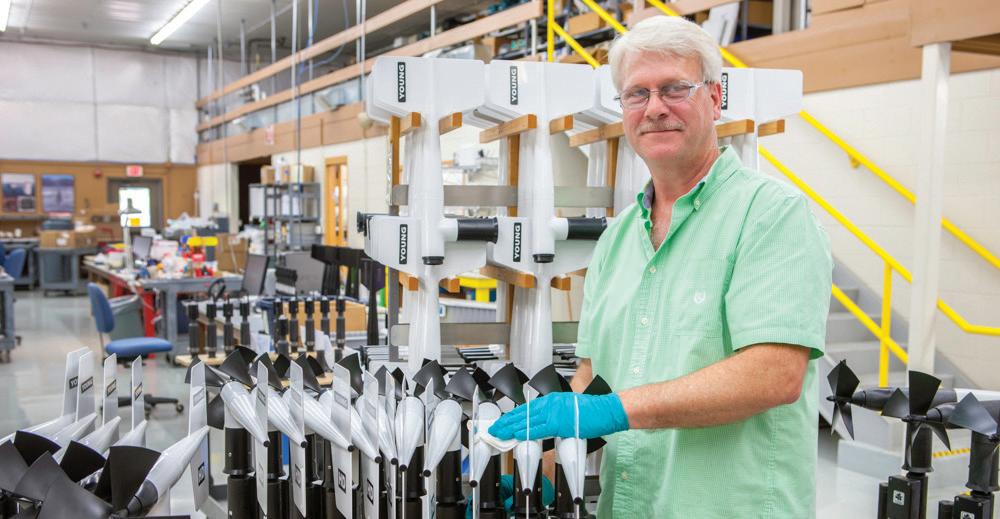
four of the region’s
By Art Bukowski
Tourism and cherries. Sometimes it’s all folks seem to talk about when it comes to traditional drivers of the region’s economy. But the greater Grand Traverse area also has a deep and productive history in manufacturing that dates back well over a century.
Whether tucked deep in the twists and turns of a local industrial park or hidden in relatively plain view, dozens of companies serve top-tier clients on a global scale and collectively employ thousands of workers.
“All too often, these manufacturers fly below the radar screen in Traverse City,” said Bill Myers, who heads the Grand Traverse Area Manufacturing Council, a committee of Traverse Connect. “People don’t realize the breadth of things that are made here, the kind of talent that it takes to make them, and where they’re sold all around the world.”
What follows is a look at a four of the region’s many manufacturers who are doing amazing things right in our backyard.
R.M. Young was one of the first tenants in the large industrial park that sits between Cherry Capital Airport and Parsons
Road on the east side of town. Robert “Bob” Young founded the company in 1964 in Ann Arbor and later relocated to Traverse City in 1971.
Over the decades, R.M. Young has become one of the country’s preeminent manufacturers of precision meteorological instruments, which are made entirely
While the National Weather Service is a client, it doesn’t end there. The armed forces, universities, agricultural entities, golf courses, ski areas and even the NFL all use or have used R.M. Young products. Some components are bought by other companies to incorporate into their stations or technologies (ski lift manufactur-
“People don’t realize the breadth of things that are made here, the kind of talent that it takes to make them, and where they’re sold all around the world.”
– Bill Myers, CEO, Promethient
at their facility in Traverse City. These instruments measure wind, humidity, temperature, pressure and more with a high degree of accuracy, and are built to handle the often brutal operating conditions encountered by such devices.
“We basically make all the instruments you would need on a fully instrumented forecasting tower, that the weather service would use for publishing their weather forecast,” said CEO Tom Young.
ers, for instance, use these instruments), whereas others go to the end user directly.
The company also boasts a substantial list of overseas clients. All told, they ship tens of thousands of units each year.
“The business of weather and meteorology is international, and from our very first instrument, we were always in demand from European customers,” Young said. “And that’s grown with us over the years. We’re now about 50-50 U.S. vs.
international customers.”
Though there are companies that make what R.M. Young makes on a much larger scale, the company continues to punch above its weight class.
“We have huge capabilities in our factory, and we do everything in-house,” he said. “That really helps us get through supply issues when we make everything here under our roof.”
The company employs 35 people in Traverse City. Young said he and his employees enjoy the “complete community” that Traverse City has become, along with its natural beauty. Founder Bob and wife Pauline are major supporters of the Grand Traverse Regional Land Conservancy.
Here’s a fun fact: The oil cap on every single General Motors vehicle is made right here by Grand Traverse Plastics. General Motors and Stellantis (the former Chrysler) are among the highest profile clients for this roughly 200-employee outfit in Williamsburg.
The company primarily produces injection-molded parts for a variety of applications in the automotive and indus-

trial sectors. They produce a staggering variety of parts that end up under the hood, in the interior or on the exterior and serve mechanical, functional or cosmetic purposes.
All told, north of 30 million units per year are made and shipped from GTP’s headquarters in Williamsburg. They have three facilities there and hope to break ground on one more in the coming months.
GTP prides itself on innovating new solutions for its clients, something leadership attributes to continued growth and success. This is especially true for solutions that might not technically be under GTP’s purview, but that they tackle anyway.
“We have very curious folks here,” said Christie Knable, marketing director. “We want to do things cheaper, we want to do things better. If it’s going to be a better customer experience, let’s fix it. Innovation is in our DNA; it’s part of our core values.”
The production capabilities are at the highest level, with six-axis robots at dozens of production stations.
“There’s automation all over the place, and 100 percent of it is designed in-house,” Knable said. “We have an entire team that looks at processes to see
if we can add automation and make it error-proof.”
Automation is attractive because manpower is a harder and harder resource to come by, Knable says. But a company is ultimately only as good as the actual people who work there, and Knable says a bevy of long-term employees has helped tremendously with continuity and institutional knowledge.
“We have people that have more than 40 years of service, and a ton of people that have 25 and 30 years of service,” she said. “All of our plant managers are local people that started at the bottom and worked their way up, taking advantage of every opportunity to learn and grow.”
Under the Century LLC (formerly Century Inc.) umbrella is Century Specialties, Century Sun Metal Treating and Clark Manufacturing, which Century bought in 2023. All three are located on 18 acres within the airport industrial park.
Century is a vertically integrated precision manufacturing company that serves customers worldwide. CEO Tim Healy says the company stands out through

“We’re
supporting industries like aerospace, nuclear energy, tooling for steel mills or copper mills, things that are under enormous pressure and sometimes at very high temperatures.
The room for error is extremely low.”
– Tim Healy, CEO, Century, LLC
its ability to make extremely durable, high-quality parts at a low volume.
“We’re talking about lower quantities, but extremely high precision and the very tight tolerances that go along with that,” he said. “We’re supporting industries like aerospace, nuclear energy, tooling for steel mills or copper mills, things that are under enormous pressure and sometimes at very high temperatures. The room for error is extremely low.”
As an example, Century makes helicopter rotor masts for Bell, a worldwide helicopter manufacturer. It’s one of the most critical components of the entire aircraft, and Century only makes a few hundred a year. Contrast that to the automotive world, in which even 10,000 units would
be a minuscule order.
“Some customers might have what amounts to nuisance volumes for a big, giant company,” Healy said. “Aggregating all of those smaller customers is kind of our niche.”
Also unique is that Century owns and operates its own entire heat-treating unit. This unit can treat a variety of metals to impart the tolerances needed for high-demand applications.
“One really critical characteristic of us is that we are vertically integrated. It is very rare that you would find machine shops that handle these low and medium volumes that also have their own heat-treating plant,” Healy said. “Normally, when you’re talking about volumes that






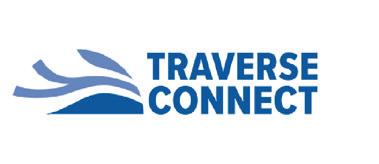


















Doug Murdick’s Fudge Sugar 2 Salt
The Concrete Service
Burkholder Construction
Two Men & a Truck
The Copy Shop
Beacon Recycling
MSU Financial Credit Union
Copy Central / Traverse Repro




Gosling Czubak Engineering Sciences, Inc.
Hand Surgery of Northern Michigan
Harbor Care Associates
Image 360 Montney Isles
Northern Mitten Suites
Oryana Community Co-op
Reynolds Jonkoff Funeral Home
State Savings Bank
Tri-Gas Distributing Co.
JKB Management LLC
Alpers Excavating

small, then a customer has to deal with both a machining entity (or maybe multiple machining entities) and a separate heat-treating entity.”
The company has about 250 full-time employees across all of its operations, which are producing components for global clients.
“We sell all across North America and several countries in South America, five or six countries in Europe and several countries in Asia,” Healy said. “And that’s generally for our very high quality tooling to support metal and steel industries.”
Acquisition of Clark Manufacturing, founded in 1975 by Gary Clark, made sense on many levels, Healy says. Clark was selling to different industries than Century, making it a complimentary addition.
“It was a very well-run business with a great leadership team, and that leadership team stayed. Brian Walter, who was the president and sole owner of Clark is still the president of Clark, and he’s now a part owner in Century,” Healy said. “It really is a coming together of two longstanding family-owned companies in Traverse City.”
Century was founded in 1966 by George Janis, and for many years it was owned and operated by his son, Bill Janis.
Local company Promethient bills its flagship product Thermavance as “human-scaled climate control” that uses breakthrough technology to directly heat or cool the body. This technology has hundreds of current and potential applications in a wide variety of vehicular and stationary seating.
The company launched its technology right as COVID hit, unfortunate timing that caused supply chain issues and set


them back considerably. Since ramping back up in the wake of the pandemic, they’ve begun to grow their business across the country.
Among other clients, they now supply Thermavance to recreational vehicle manufacturer Polaris, which uses it in its Bennington pontoon boat, Indian Motorcycle and Slingshot RV brands, among others. They’ve also provided the material to the Lindner Family Tennis Center, a Cincinnati-area stadium that hosts a variety of high-profile tennis events.
Other clients include high-end wake surf boat manufacturer Pavati and two golf cart manufacturers.
“We already have over 20,000 heating and cooling systems in the field,” CEO Bill Myers said.
They’re still aggressively working to get the word out, though. Myers describes Promethient as a “cold startup,” meaning it’s a novel concept that most customers aren’t yet aware of. Education, therefore, often needs to precede sales.
“We’ve got a great product to sell, but we have to create the market to sell it before we can sell it,” Myers said. “The reality is that people don’t go into a Kubota dealership asking for a cooled seat because they don’t even know it’s possible or available. It’s a different animal from other startups that are doing something that already exists.”
To be clear, heated and cooled seats already exist in some vehicles and other applications. Myers says Thermavance, which uses direct thermal conduction, is substantially more effective than current applications, which use convection. He says Thermavance is also considerably more durable and versatile, suitable for harsh outdoor and even underwater uses.
Promethient’s 10 employees make Thermavance in Traverse City at their Cass Road facility.

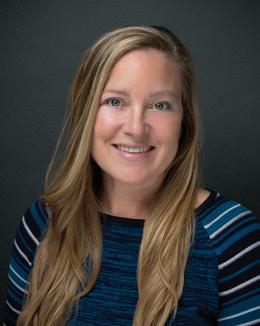












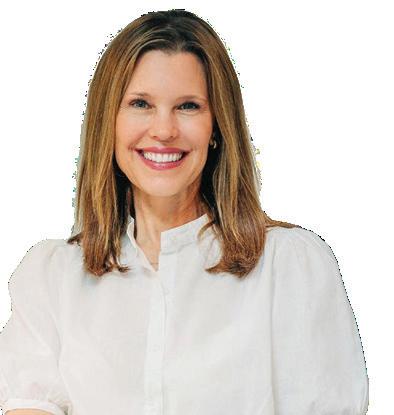



By Abagail McKiernan, columnist
“Nobody wants to work.” “I can’t find good help.” “We hire them and then they never show up for the first day.”
We’ve all heard phrases like these or have even said them ourselves, especially in recent years. But are these statements accurate? Is the worker shortage and rising absenteeism across industries nationwide truly a result of a declining work ethic? Or is there a missing piece to this puzzle?
Recent statistics from the Centers for Disease Control and Prevention reveal that productivity losses due to absenteeism cost employers $226 billion annually (approximately $1,685 per employee). Manufacturing companies are among the hardest hit, second only to the healthcare industry.
Here are some of the top causes of absenteeism in the workplace and what employers can do about it.
According to the Bureau of Labor Statistics (BLS), more than 2.8 million non-fatal workplace injuries and illnesses were reported in the private sector in 2022. It’s a significant increase from the previous year, with injuries rising by 4.5% to 2.3 million and illnesses surging by 26.1% to almost 461,000. These incidents include things like overexertion, contact with equipment, falls, slips/trips, and exposure to harmful substances or environments. These injuries not only result in lost workdays but also contribute to long-term health issues, decreased productivity, and ongoing medical problems. Additionally, musculoskeletal disorders are particularly prevalent in manufacturing as they are often caused by repetitive motion, heavy lifting and awkward postures.
The Solutions:
Implement and promote safety programs: Make safety a top priority with regular training sessions on protocols and equipment handling. Warning: If you feel like you’re just going through the motions in the safety programs, that is how your staff will see it, too, so take time to make the sessions engaging and hands-on. In addition, make reporting issues simpler by placing signs with QR codes or simple

report forms in areas with high incident rates. Also, to promote safety and boost morale, consider offering random incentives, such as $20 gift cards when you see employees making safe choices. Health monitoring and early intervention: Regular health check-ups and screenings can help in early identification of potential health issues for your team and can save you a lot of headaches down the road. Providing easy access to occupational health services can ensure that employees get necessary treatment and advice before problems escalate.
The Cause: Depression & Mental Health
A 2022 Gallup survey showed that nearly one-fifth of U.S. workers rate their mental health as fair/poor, leading to about four times more unplanned absences compared to those with good or excellent mental health. This absenteeism is costly and creates workplace issues like reduced performance, lower morale, and higher turnover rates. It’s crucial for companies to address mental health proactively by creating a supportive environment and providing resources since the stigma of mental health can deter employees from seeking help and exacerbate the problem.
The Solutions:
Implement a wellness program: Wellness initiatives – like fitness, nutrition, and mental health services – reduce healthcare and absenteeism costs, saving up to $2.73 for every $1 spent. Get creative with gym memberships, massage gift cards, and team-bonding budgets. Better yet, poll your staff to see what they prefer.
Employee Assistance Programs (EAPs): Most companies offer cookie-cutter EAP programs, but when did you last review yours critically? Effective EAPs must evolve with employee needs. With rising inflation, recent studies showed that 71% of Americans have less than $2,000 for emergencies and that employees increasingly cannot pay for everyday emergencies and expenses. Implementing programs that help remove barriers to work like past due bills, car repairs, or food insecurity can make all the difference.
Disengagement can be toxic and hard to detect. Gallup surveys show that disengaged employees have a 37% higher absenteeism rate, an 18% decrease in productivity, and a 15% drop in profitability. They lower team morale and are more likely to leave and encourage others to leave.
Growth-oriented work environment: Addressing disengagement is crucial for maintaining a stable, productive, and profitable workforce. Create a work environment that values employee contributions, fosters engagement, and prioritizes individual success alongside company goals. Offer development programs and succession planning to help employees feel valued and invested. Since most Americans spend the majority of their waking hours at work, ensure this time is enjoyable, engaging, and provides opportunities to bond. Encourage open communication: Most employers recognize the impor-
tance of regular check-ins and surveys to gauge employee satisfaction. However, it is crucial to give employees opportunities to communicate beyond their direct managers to help identify toxic management, one of the biggest contributors to low morale. Forbes notes that feeling “overlooked and ignored” is a top reason employees quit, and this also applies to chronic absenteeism. Employees won’t perform their best if their concerns go unacknowledged. Remember, your team members are more than just numbers and know when they aren’t valued.
Addressing absenteeism in the manufacturing industry requires a multifaceted and creative approach tailored to the needs of your staff, the economy, and the type of work your company does. Understanding root causes – injury and illness, mental health issues, and disengagement – is essential. Implement targeted, innovative solutions like customized safety programs, wellness initiatives, and an engaging work environment. These are not just strategies to reduce absenteeism but are crucial steps in building a resilient, thriving workplace. Proactively addressing these issues helps reduce absenteeism, boost morale, and improve overall productivity.
As co-founder of HelpLink, Abagail McKiernan helps companies remove employee barriers to work, reducing absenteeism and staff turnover while increasing productivity. Additionally, she founded Spark in the Dark, a nonprofit organization that has connected more than 100,000 needs to solutions since 2017 through its online peer-to-peer resource-sharing network. Contact her at abby@helplink.org.

By Art Bukowski
Simply put, Josh Traeger was getting tired of the grind.
It’s not that Traeger’s gig was all bad. As a prosecutor in the U.S. Air Force’s Senior Trial Counsel, Traeger was across the country and around the world handling cases. It was a thrill to see the world in this way, he says, with each experience teaching him something new.
“I’ve been to Korea, Japan, Hawaii, Alaska, Italy, Germany, England, you name it. I’ve prosecuted cases in 27 states. I’ve got stories for days about places I’ve been,” he said. “It was the most incredible professional experience of my life.”
But the work itself was heavy. He handled cases of child physical and sexual
abuse by service members (the military handles prosecution of these and other crimes), and the cases were almost always emotionally draining. Add in the fact that his job kept him away from his wife and two young children for more than 200 days a year, and something had to give.
“It wears on you,” he said. “I got to a point where I was really burnt out. I had to be done doing it.”
So when he hit 10 years of service not all that long ago, Traeger did not re-up for more time and instead dove into civilian life. The Erie, Pennsylvania native first moved his family to Colorado, where he had been stationed for a while, but it wasn’t the best fit for a variety of reasons.
“Colorado had changed so much,” he said. “It had become so sprawly and subur-
ban. There was no character to any of it.”
Traeger’s wife Maggie is from Battle Creek, and her mother had since moved to Manistee County. The couple had traveled to Traverse City several times while visiting Traeger’s mother-in-law, and eventually decided to move here full time in 2022.
From here, Traeger launched True North Legal Group, a general-purpose law firm aimed at helping (among other clients) small businesses and nonprofit organizations in northern Michigan and beyond. He also runs the Military Defense Firm, in which he provides defense counsel to active-duty service members around the world facing disciplinary action or criminal charges.
He started the latter while in Colorado,
and was initially unsure about opening a local legal practice dedicated to serving Grand Traverse area clients. A big part of that trepidation was the relative glut of attorneys already practicing in the area. And while he heard just that from most local attorneys he consulted with (some of whom had a “stay off my lawn” vibe, he says) one gave him advice that truly resonated.
“He said, ‘Yeah, there’s a ton of attorneys in this town. But there’s really none quite like you. So why not you?’ And I was like, wow,” Traeger said. “Honestly, that was like a game-changing piece of advice that I got when I was exploring all of this.”
A veteran’s mindset
While he offers a full suite of legal
services that have nothing to do with current or former military service, part of Traeger’s identity – both personally and professionally – was formed by his own years in uniform.
“I hate to be self-promoting around my military background. I hate it. It’s not in my nature. However, I do think that being in the military gives you a ton of skills that translate to being a better business owner and a better service provider,” he said. “Not the least of which is I feel and have always felt a tremendous sense of duty and responsibility of the people in my care.”
Aside from his defense work of active service members handled primarily through the Military Defense Firm, Traeger offers several services to veterans. One big service is providing discharge upgrades to service members who left the military on less than favorable terms.
“Sometimes you just truly screwed up and you’ve got to live with the consequences of that. You committed a crime, you went to court martial, and they kicked you out. Sorry, you’re stuck with that,” he said. “But there are cases where you’re a young 20-year-old kid, and you get wrapped up in the wrong crowd and use marijuana, and they kick you out and you lose your GI Bill.”
What’s commonly called the GI Bill helps veterans pay for education, and it’s
one of many substantial benefits veterans can lose depending on their discharge status. Though not everyone is deserving of a discharge upgrade, Traeger says there are plenty who can’t access much needed benefits due to relatively minor infractions.
“There’s enough of those applicants who left the military, got a job, had a family and started becoming contributing
board that aligns with those eligibility criteria,” he said. “And we’ve done it enough. We know the strategic buzz words, the things to say and the way to say them.”
Traeger doesn’t want to be type-cast or pigeon-holed. True North Legal Group

“We believe that if we can get involved with your business issues and become ingrained in your culture early, and you feel really comfortable calling us, then we can put out a lot of fires before they even start.”
–Josh Traeger, attorney
members of their community, and they just want to go back to school,” he said. “I believe that if I can just give them this single step up, then they’re going to do something on the back end of that that’s going to lift their community.”
Traeger says he knows the best path to success in these cases.
“Our expertise is in looking at your record and writing a submission to the
was formed to provide services to everyone, and veteran clients will likely be in the minority. But there are a few things he’ll borrow from his military work that everyone can appreciate.
One of those is a flat fee for certain services, something he picked up doing service member defense work (in which the events tied to a case are relatively defined and easy to plan around).
“The reason I like that is not because of return on investment or margin or anything like that, but it helps me just do the work without worrying about the time,” he said. “I just work as hard as I can on somebody’s case and not worry about what time I spent on it.”
He also offers cost-effective subscription services for business owners that cover basic legal services common to small business owners or nonprofits. Unlike with a retainer, Traeger isn’t sitting there watching the clock to keep track of billable hours. Yes, certain major issues will require extra pricing, but his goal is to take care of all of the basics with a monthly fee as low as $500.
“I would rather be in a world in which you’re a business owner who can text me when an issue comes up and say, ‘Hey, what’s your thoughts?’” he said. “I’m not going to sit there and track the time I use to respond to it. It’s built in. It’s part of the deal.”
By being “approachable, kind, reasonable and consistently engaged,” Traeger hopes his legal value goes far beyond the scope of what’s provided in a few phone calls.
“We believe that if we can get involved with your business issues and become ingrained in your culture early, and you feel really comfortable calling us, then we can put out a lot of fires before they even start,” he said.




FOR BEING RECOGNIZED IN THIS YEARS 40 UNDER 40!
Thank you to Jacqueline, and the entire Pit Spitters organization for their continued commitment to providing the best fan experience in the Northwoods League. You’ve made Traverse City an even better place to live, work and play!

By Kierstin Gunsberg
It’s been 20 years since Enrico Schaefer founded Traverse Legal in Traverse City. Since then, the firm has expanded to include offices in Detroit, Austin and Los Angeles, representing niche industry clients like influencers, crypto investors and Airbnb hosts.
When Schaefer founded Traverse Legal in 2004, however, it marked his return to an industry he’d once stepped away from.
After years of practicing law, Schaefer had grown disillusioned.
“I took almost 10 years off, lived up in the woods in Leelanau County for a good stretch of it, and lived a life of minimalism,” he recalled.
Though he’d intentionally distanced himself from the hustle and bustle, the early 2000s brought the internet to his remote corner of northern Michigan, thanks to word from some old college friends. They’d recently launched a company in Boulder, Colorado to leverage “this new thing called the internet.”
Reflecting on his friends’ potentially risky but intriguing endeavor, Schaefer realized that “instead of being born at the end of the industrial age…I was actually at
the forefront of the information age.”
He tapped into that revelation by reentering the legal industry with a new focus: catering specifically to the emerging internet and technology issues that were sure to grow as once-unfamiliar names like Google, Apple and Amazon established themselves.
“Changing the way law is practiced” became the firm’s slogan and, according to Schaefer, “that’s exactly what I set out to do, and the people who joined me along the way are committed to it every day.”
Early on, those changes included sharing legal knowledge through blogging, one of the more accessible technologies at the time. While his peers scoffed – warning of the potential legal pitfalls in publishing free law content for the masses – Schaefer remained undeterred, recognizing the value of being one of the first to add his voice to the search engine result pages.
Another change Traverse Legal embraced was going paperless.
“The efficiencies of that today are obvious,” Schaefer noted.
AI: Friend or foe?
Things have come a long way since the


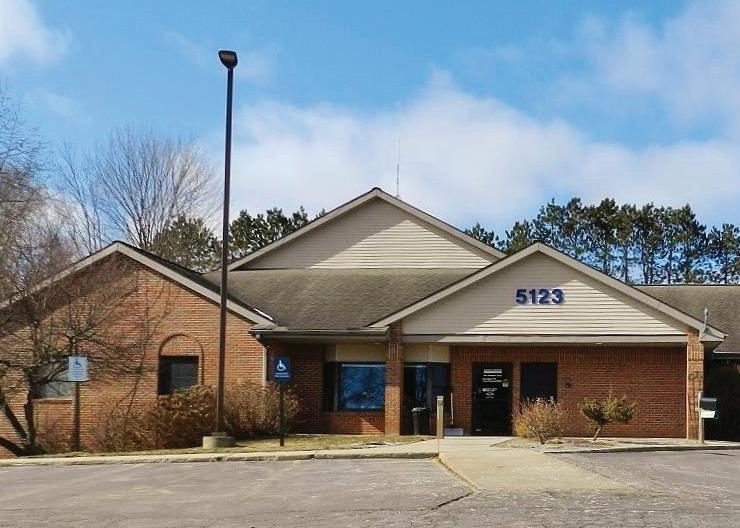
boxy computers and glitchy programs of the early 2000s, and even the most techaverse have accepted apps into their everyday lives. Traverse Legal is still tracking and studying tech innovation as part of its business model.
“There is no new and emerging technology that we do not jump in to learn,” he said.
That includes AI. For many, AI is seen as either a friend or foe – it’s either going to take over mundane processes no one wants to do, or replace humanity entirely. But Schaefer’s firm has a more nuanced perspective: It’s a tool, they say, like all of the other tech tools leading up to now. They’ve integrated it into their practice through a tool they developed called Traverse AI, which offers lawyer-informed responses to common client inquiries.
It works like this: Clients are given access to Traverse AI, which prompts them with various questions they might have about a certain topic, such as trademark laws. The client selects the question that best fits their curiosity and Traverse AI provides an answer. This continues until the client feels they have a solid understanding of the topic before sitting down with one of Traverse Legal’s attorneys.

By automating initial client education, Traverse AI allows lawyers to delve into more substantive discussions with their clients, adding greater value to their services, explains Schaefer.
“We like working with intelligent clients,” he said. “We don’t like working with clients who simply want to be told what to do. We want the client to have a horse in the race and enough information to make intelligent decisions. Traverse AI puts them in that position.”
Schaefer also emphasizes the importance of confidentiality, noting that interactions between clients and Traverse AI are so secure that not even the firm’s partners or staff can access the conversations because they aren’t stored.
“We made the decision in designing the tool that we would prioritize confidentiality over everything else,” he said. “None of the data is stored by us or the platform. None of the information is used to train any [AI] model, and clients can interact with the AI tool without any concern about privacy.”
Adopting new tech can reduce client-to-attorney face time, Schaefer points out, which might concern some attorneys because of the impact on traditional time billing. But he believes it’s all about the approach.


“We don’t like working with clients who simply want to be told what to do. We want the client to have a horse in the race and enough information to make intelligent decisions. Traverse AI puts them in that position.”
– Enrico Schaefer, Founder, Traverse Legal
“If you prefer to keep clients in the dark to control outcomes, you won’t like technology or AI,” he said. “But if you’re like us and want to help clients grow their businesses and succeed, you’ll embrace these tools.”
He adds that avoiding tech tools like AI might leave tech-averse attorneys in an ethical jam, “because the rules of ethics require you to provide competent legal services,” he said.

Whether a client has a $5,000 or $80,000 budget, Schaefer says the key is building strong relationships by under-




standing challenges, identifying opportunities, and solving problems – all within budget. The more technology attorneys use, the more they can offer their clients.
“Good attorneys value relationships with their clients, and nothing kills a relationship faster than a client spending $30,000 to get to the 50-yard line then running out of money,” Schaefer said. “If I can get clients into their end zone, achieving their goals at or below budget, guess what happens? That client comes back to me again and again, and I’m having a lot more fun helping these busi-
nesses grow than if I just woke up in the morning to bill hours.”
While AI’s capabilities are still developing, Schaefer believes it will shape the future of the legal industry. He predicts that the traditional hourly billing model might shift as clients become accustomed to faster service. Maximizing client budgets by streamlining through AI will increase the value of an attorney, he said.
“Clients never run out of legal problems,” he said. “They just run out of money to deal with them.”







With new ownership at Bay View Flooring & Design Center, the Woolfolks are committed to preserving the legacy of Tim and Kathy Hyland while continuing to deliver the same exceptional service in Traverse City
Margaret and Jonathan Woolfolk are ushering in a fresh chapter at Bay View Flooring & Design Center. With a new perspective on the industry, they’re excited to blend innovation with the longstanding traditions established by previous owners Tim and Kathy Hyland. The Hylands confidently passed the torch to Jon and Margaret, trusting them to continue Bay View’s legacy in Traverse City. Now three months in, the Woolfolks are fully committed to maintaining this reputation by enhancing the local flooring experience and honoring the roots of this acclaimed community business.
As the new owners of Bay View Flooring, Jon and Margaret bring a dynamic combination of leadership, design expertise, and community focus. Jon, a U.S. Naval Academy graduate and former Navy Flight Officer, recently completed his Michigan builder license. Margaret, a Traverse City native, attended Michigan State before continuing graduate school in Hawaii for interior design. The couple met and married while living and working on Oahu, never anticipating they would find themselves where they are today.
While working at the Pentagon and simultaneously finishing his MBA from Georgetown University, Jon spent a majority of 2023 searching for a busi-
ness on the East Coast to invest in. As fate would have it, there was a new opportunity in Margaret’s hometown of Traverse City that offered everything they wanted. Purchasing Bay View Flooring & Design Center made it all make sense.
“Everything’s changed, yet nothing has,” says Margaret, reflecting on their return to TC. “I was here for 22 years, and I was gone for 22 years. Now, we’re living on the very block where I grew up, working in the same industry as my dad, who began as a local flooring installer.” Coincidentally enough, Jon’s father also started his career as a flooring installer. “The irony isn’t lost on us,” adds Margaret with a side-eye towards Jon.
One thing that will change is an increased emphasis on design. After all, this is Margaret’s expertise, and it’s reflected in the second part of the business’s name: Bay View Flooring & Design Center. “There’s a lot of room for growth there,” she says. “We can step further into design trends and forecasting, allowing us the opportunity to educate and elevate the customer experience.”
Moving forward, customers can expect the same exceptional service along with an expanded range of selections. We buy in bulk from top-tier brands like Shaw, Virginia Tile, and COREtec, and are excited to introduce new names such as International Flooring Company and their latest line, Canopy,” says Jon. “This approach not
only gives us strong pricing power but also ensures you receive the best value and the largest selection of high-quality products available.”
Bay View Flooring’s commitment to excellence shines both locally and nationwide. “Our standing within the community is unmatched,” says Jon, “reflecting the trust we’ve built over the years.” Voted 2024’s Red Hot Best Winner for four consecutive years, their reputation for five-star service is both constant and growing. This dedication to quality has also gained national recognition, with Floor Covering Weekly naming Bay View as one of the Top US Specialty Flooring Retailers.
With nearly 40 full-time employees and a team of over a dozen subcontractors, Bay View Flooring’s success is driven by exceptional staff and teamwork. Jon notes, “My experience in the service field parallels our daily operations. We have sales staff, office staff, warehouse staff, and installers—much like aviation teams with pilots, operators, maintenance, and support; it’s quite the process.”
“It really is,” agrees Margaret, “and that’s because we offer comprehensive start-to-finish service. From personalized design consultations and product education to specifying tailored solutions for your project, our process covers every detail. We handle measurement, design, product selection, floor preparation, floor removal, product delivery, and installation, maintaining cleanliness throughout. Additionally, we
provide expert guidance on maintenance, post-installation support, and custom flooring solutions to ensure your complete satisfaction – it’s white glove service.”
You can expect to see the Bay View Flooring & Design team actively engaged in the community. “As we progress, we’re excited to strengthen our connections with organizations like Habitat for Humanity, the Homeowners Business Association, and Traverse Connect,” says Jon. “By collaborating with these and other like-minded groups, we aim to use our resources wisely and contribute to meaningful causes, fostering mutual growth and development in our region.”
Margaret adds, “We want to go beyond products and profits. Our goal is to find new ways to connect with local organizations, businesses, and the people represented throughout Northern Michigan.”
Together, the Woolfolks are merging tradition with innovation, enhancing the Design Center’s offerings and fueling Northern Michigan’s growth. Their deep commitment to the community ensures that Bay View Flooring & Design Center will not only maintain its standard of exceptional service but also elevate the customer experience with a superior selection and renewed energy.
Bay View Flooring & Design Center is open Monday-Saturday, located at 67 US 31 S. Stay social and follow them @bayviewflooring





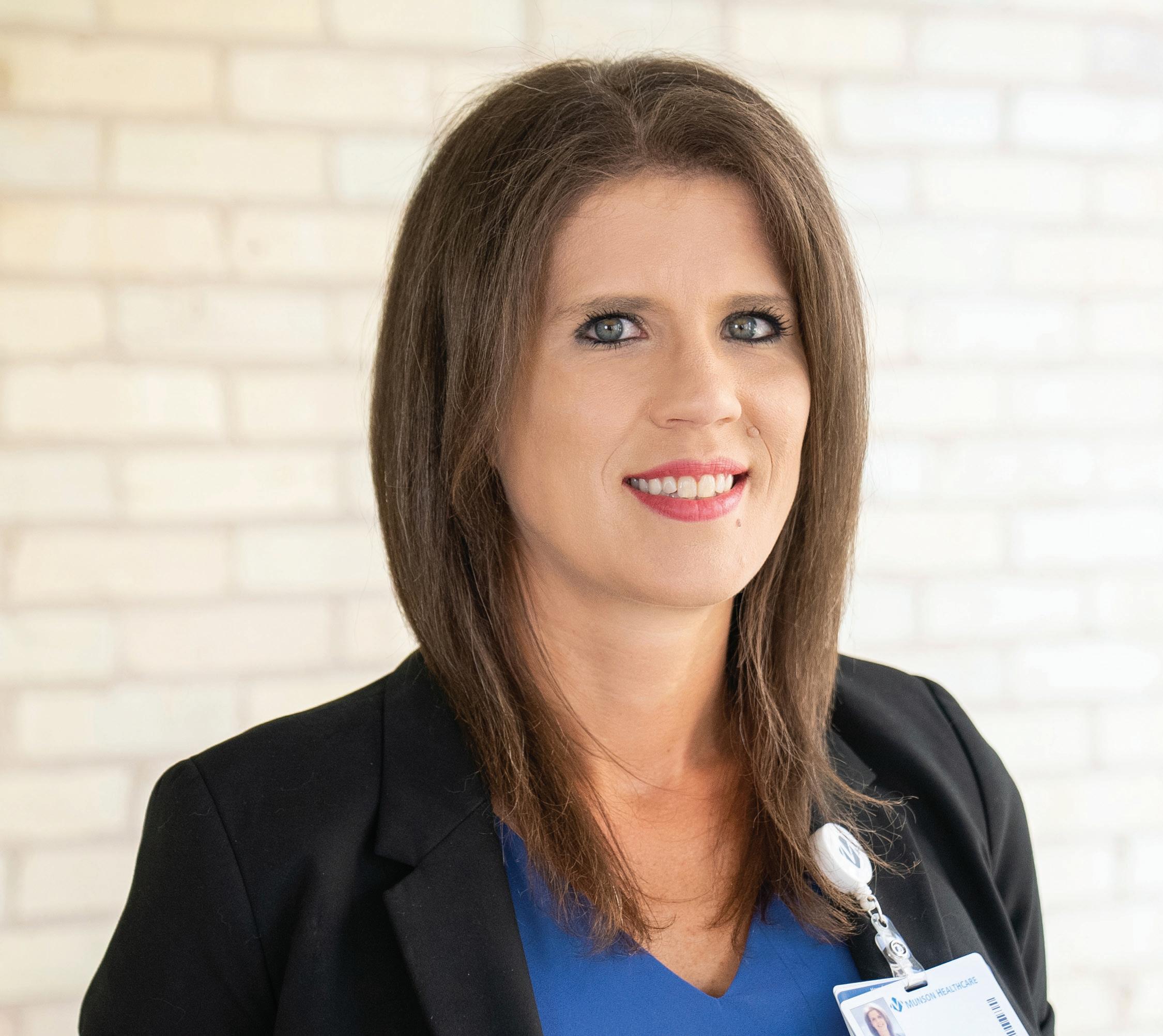


By Art Bukowski
A bombshell Michigan Supreme Court ruling stands to change compensation for Michigan workers, including an elimination of the “tip credit” that allows restaurants to pay tipped workers a very low hourly rate.
The Supreme Court in late July issued a ruling that will raise the minimum wage from $10.33 now to roughly $15 an hour over the next three years. It would also eliminate the state’s tip credit (which currently allows tipped workers to be paid $3.93 an hour) by 2029. Once it’s gone, employers would have to directly pay those workers at least the minimum wage. The ruling also allows workers to accumulate more paid sick leave than currently prescribed under state law and
removes the paid sick leave exemption for employers with less than 50 employees.
While some hail this ruling as a major victory for Michigan workers, others are concerned about the impact on businesses, particularly smaller businesses that are just getting back on their feet after the pandemic.
The July ruling all began with a pair of 2018 ballot initiatives – the Michigan Paid
“Our whole service industry is based on (the concept that)
if
you are very good at what you do and provide great service, you make more income. It’s going to be a really rough transition to getting paid an hourly rate for just showing up and putting
– Sam
your hours in, regardless of your performance.”
Barnwell, Chief Development Officer,
Hotel Investment
Services
Sick Leave Initiative and the Michigan Minimum Wage Increase Initiative – which outlined sweeping changes to Michigan employment laws and compensation.
Rather than have voters weigh in on the matter, the Republican-led legislature adopted both proposed ballot measures into law. But a few months later, the legislature substantially amended and watered down these measures, leading to a legal challenge.
After winding its way up to the Supreme Court, justices ruled that the state legislature’s “adopt-and-amend” modification of what was described in the ballot initiatives was unconstitutional, thereby reverting the laws back to the ballot initiative versions.
The rules now are set to take effect in February of 2025 unless the state legislature intervenes.
Various industry groups have blasted
the ruling. The Small Business Association of Michigan (SBAM) says it will “reduce future small business growth and put Michigan’s entrepreneurial climate at risk.”
“There is zero doubt among the small business owners we represent at SBAM that these new mandates will have an absolutely devastating effect: reducing planned growth, forcing layoffs and possibly even causing many to close their doors for good,” the association said in a statement.
Sam Barnwell is chief development officer at Hotel Investment Services, which counts the Stafford operations (Perry Hotel, Weathervane, Bay View Inn, and more) among the properties it manages. He and everyone else interviewed for this story say price hikes are likely if they have to pay servers more.
“The margins in the restaurant business are not significant enough that the money doesn’t have to come from somewhere,” Barnwell said. “It either comes from cutting staff or it comes from raising prices. That’s just the macroeconomics of it.”
Gary Jonas owns and runs the popular Little Fleet in Traverse City along with Farm Club in Leelanau County. He points out that state law already requires employers to make their servers whole in the rare instances that their tip wages don’t get them to the minimum
wage amount.
“So why not just raise the minimum wage in general? For restaurants that are not busy or the servers are not making a lot of money, then they’re covered,” he said. “For us, the servers are doing a great job and being compensated very well, so why put the burden on all restaurants?”
Could more be less?
Jeff Libman is the general manager of Amical, a fine dining staple on Front Street in Traverse City. He is concerned less about having to boost server pay than about what the changes could mean for the pool of available servers if customers are less incentivized to tip.
“The average tipped employee in the state of Michigan makes $29 an hour, and those at nicer restaurants like ours can make much more than that,” he said. “Who wants to make less money?”
Plus, Libman says, bringing everyone to a level playing field means that the best servers—the kind that Amical has pegged its reputation on—will be harder to come by. If working harder and providing better service no longer means better tips, those workers might take their skills to a different industry altogether.
“Amical is special at least in part because we’ve always had excellent ser-









“I know that we need to find ways to ensure our small businesses are sustainable and have a viable business model. They took a lot of hits over the past couple of years and they’re dealing with a lot of pressure. But our region is increasingly unaffordable… and workers need to make enough to live on, and they need to be able to take days off when they’re sick.”
– Betsy Coffia, State Representative
vice,” he said. “After this, your special occasion restaurants might become not so special anymore.”
Hard data about tipping behavior in the handful of states that do not have a tip credit (Alaska, California, Minnesota, Montana, Nevada, Oregon, and Washington) is difficult to come by, but some reports indicate it’s lower in those states.
Like Libman, Barnwell is concerned about what his nearly 200 tipped
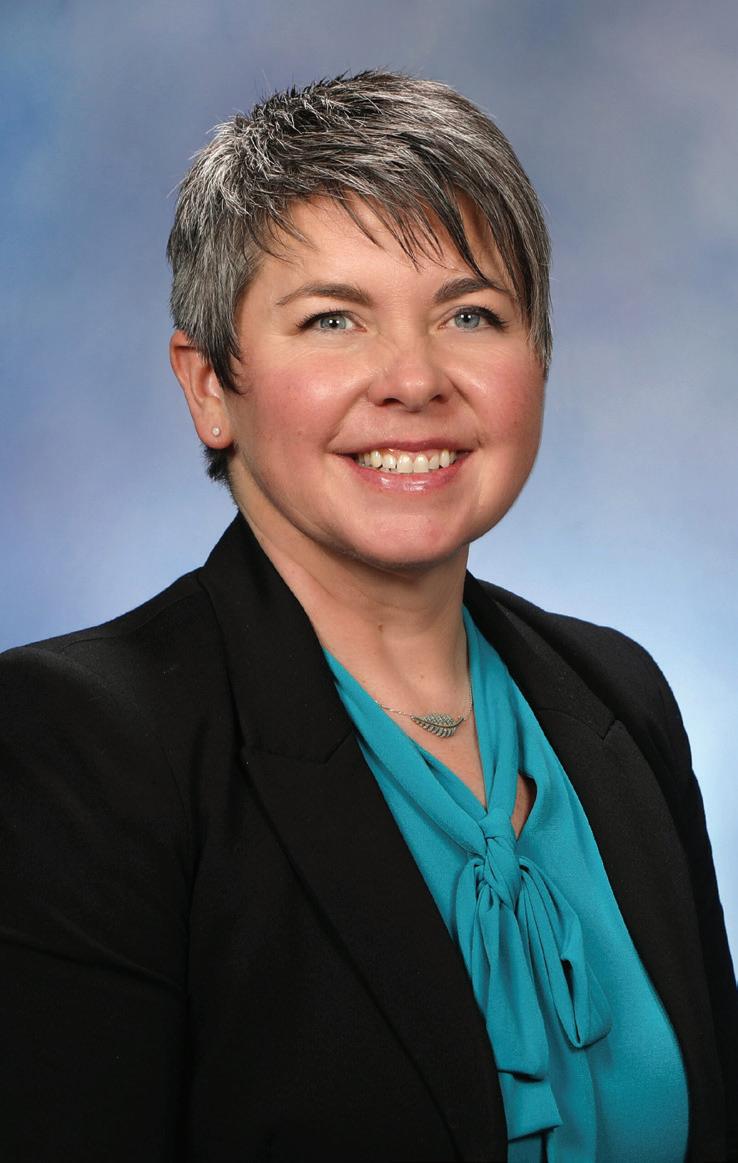
employees will do, particularly the best ones, if their income takes a hit.
“Our whole service industry is based on (the concept that) if you are very good at what you do and provide great service, you make more income,” he said. “It’s going to be a really rough transition to getting paid an hourly rate for just showing up and putting your hours in, regardless of your performance.”
This is particularly concerning in


northern Michigan, Barnwell says, where a combination of factors means good workers are already difficult to come by.
“Housing is a significant issue that’s been well reported,” he said. “But when you then take housing and combine it with the uncertainty in the stability of your income…we’re going to lose a lot of staff.”
Lawmakers prepare for next steps
State Rep. John Roth (R-Traverse City) recently attended a gathering of servers, restaurant owners and managers in Traverse City, and he says the general consensus from that group was to not fix something that isn’t broken.
“They really did not want this to occur, and they’re happy the way the situation is now,” he said.
Roth is particularly concerned about the impact on business that already endured the tumultuous run of the COVID pandemic.
“So many businesses—doesn’t matter if it’s a restaurant or just small business in general—are just now starting to get to where they feel like they’re more comfortable, and now we’ve thrown more things on their plate,” he said. “This is a really large change in a short period of time.”
Roth believes the legislature will likely try to reach some sort of compromise before the new rules are set to take effect in February.
“I think we’re going to do something,” he says. “My worry is it’s not going to happen until after the (November) election. But people are concerned…I hope there’s an appetite to look at all of it.”
State Representative Betsy Coffia (D-Traverse City) was also at the gathering of restaurant folk. She says a solution going forward can’t be an either/or. She wants something that will support workers while not endangering small businesses.
“I’ve been in very intentional conversations with my caucus about what actions we might be able to take to support both our small businesses and our business community while also supporting our workers,” she says. “We have many, many restaurants in my district along with a lot of workers, so I have been pretty vocal about it.”
Coffia says she’s talking to as many workers and employers as possible in order to gather information and encourages anyone with input to contact her or her office directly.
“I know that we need to find ways to ensure our small businesses are sustainable and have a viable business model. They took a lot of hits over the past couple of years, and they’re dealing with a lot of pressure,” she said. “But our region is increasingly unaffordable… and workers need to make enough to live on, and they need to be able to take
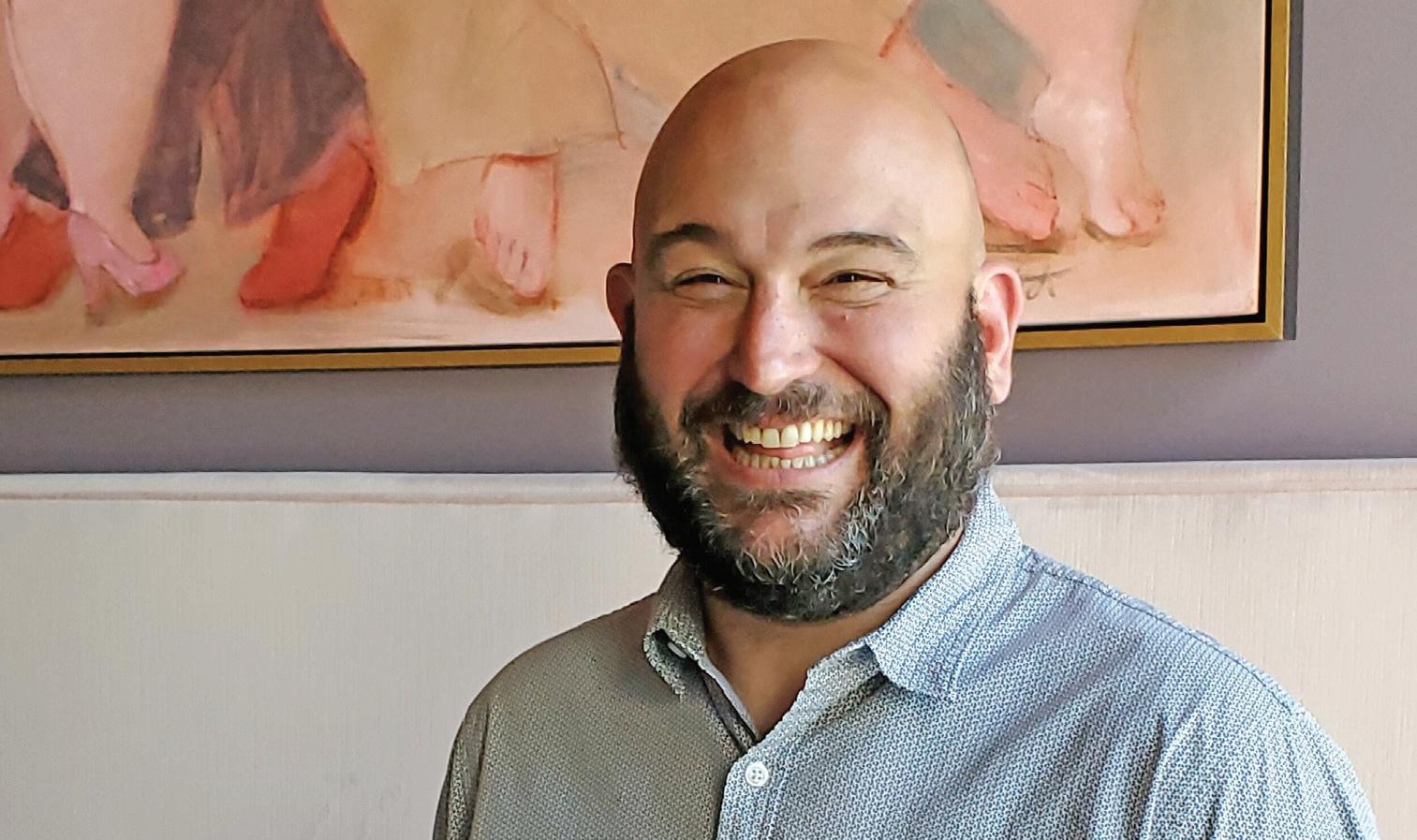
“Amical is special at least in part because we’ve always had excellent service. After this, your special occasion restaurants might become not so special anymore.”
–Jeff Libman, General Manager, Amical
days off when they’re sick.”
State Senator John Damoose (R-Harbor Springs) is the co-chair of the senate’s hospitality and tourism caucus. He called the ruling a “flat-out disaster” for the restaurant industry that could close as many as 20% of Michigan restaurants if the legislature doesn’t act.
“I’ve heard a number of different pro -
posed solutions, nothing really specific, but I think people are very concerned and realize something has to happen or this is going to be devastating for our businesses,” he said. “My guess is that there’s a real high likelihood that we’re going to have some sort of compromise by the end of the year, because the stakes are just too high.”
We are thrilled to announce that we have been ranked #1 in Member Satisfaction Among Commercial Health Plans in Michigan and swept all eight dimensions in the 2024 J.D. Power Study. This is a testament to our unwavering commitment to our members and the communities we serve.






ready to help serve our members.






in Member Satisfaction Among Commercial Health Plans in Michigan


Wow! We’re so excited to have two RE/MAX Bayshore standouts represented in this year’s 40 Under 40 list. We’re thrilled to see Betsy and Kyle’s hard work, dedication, and impact recognized by the community, and we couldn’t be prouder to be part of their team.
— RE/MAX Bayshore Team
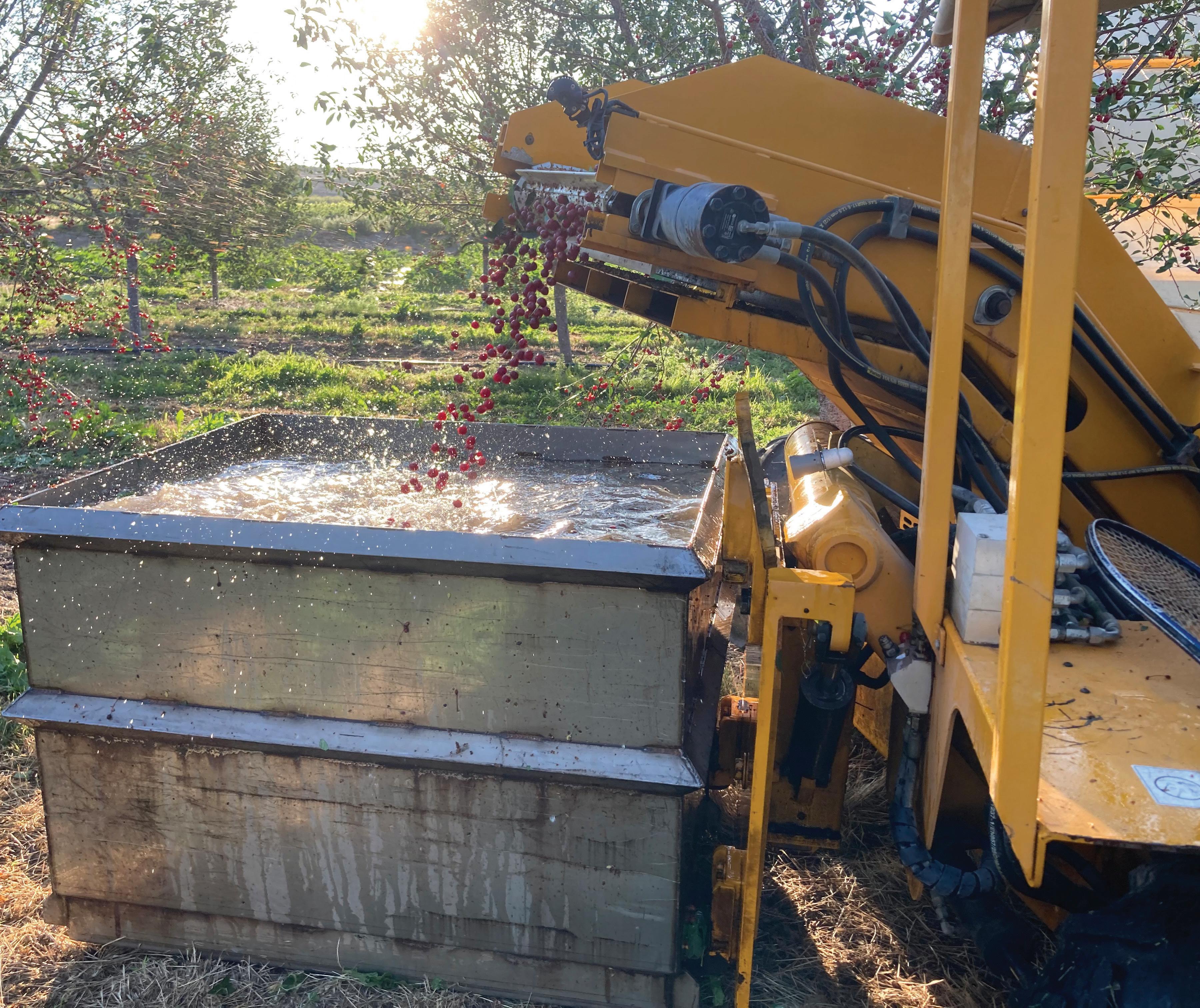
By Art Bukowski
For thousands of years, crop-based agriculture has operated under the same fundamental framework: Plant something, care for it and harvest its bounty. Over time, certain practices, innovations and implements have led to massive leaps in production. Almost all of these have involved getting more out of the land and doing it in less time. Improved output and efficiency mean more food for people who need it and more profitability for the people who work the land.
In the Grand Traverse region, researchers from Michigan State University are working on new technologies that might help cherry farmers get more out of their orchards and put more money in the bank. While that’s something any farmer would appreciate, it’s especially welcome in an industry that’s feeling tremendous strain due to foreign imports, low prices, high costs, development pressure and much more.
“Technology is everywhere, and it’s rapidly advancing. And I think the biggest challenge is getting those things implemented to a point where the farmer can say that they’re using this technology to improve the bottom line,” said Richard Price, an MSU researcher. “This is all about being profitable.”
MSU is partnering with Utah State University (Utah ranks second to Michigan in tart cherry production) to test technologies that can help farmers use data to cut costs and improve output. Their work is being funded in part by the USDA’s National Institute of Food and Agriculture.
The concept is to allow farmers to hone in on which areas of their orchards are more productive than others. Most farmers with multiple orchards or or-
chard blocks are aware that one might be better than the next for a variety of reasons (topography, soil quality, drainage and more) but not many are looking at productivity on a row-by-row basis.
By using yield monitors developed at USU in combination with aerial monitoring, farmers can have a much better idea of which areas of their orchards bring them the most money each year, and which ones are lagging behind. Both are elements of a technology-driven movement Price refers to as “digital agriculture.”
The yield monitors are attached to shakers and give direct, hard numbers of what trees produce. Quality images from drones or other high-resolution mapping sources can also yield surprisingly accurate data about productivity out in the field.
“So now, instead of saying the whole block gave me this much, farmers are now able visualize it by tree,” Price said.
“And when you isolate it on a much smaller scale, what looks like average across the board is actually areas that are doing really well and areas that are probably not doing really well, and you can focus your resources on those areas that are making money.”
Focusing resources means more inputs (fertilizer, water, hands-on management etc.) in the areas more likely to turn a profit and cutting back on areas that aren’t producing as well. That can mean considerable savings over a season, and could indeed boost the bottom line by directing resources where they are most likely to produce profits.
“What I hear from a lot of farmers is, ‘Well, I’m going over it anyway, and why would I not farm something if I’m going to go over it anyway?’ Price said. “Well, if we can show you that so many of these trees are actually losing you money, you can either rip them out and replace them with new trees, or you just rip
“Growers
are making decisions from the seat of their tractor with their cell phones. They’re looking at models. They’re looking at data. They are definitely more ready and able to adapt than they used to be.”
– Nikki Rothwell, Coordinator, Northwest Michigan Horticul-
tural Research Center
them for good and concentrate on less trees, and you can better manage your input costs overall.”
In situations in which trees are ripped out and not replanted, farmers can use the land for other value-added purposes like pollinator gardens.
Nikki Rothwell is the coordinator of MSU’s Northwest Michigan Horticultural Research Center in the heart of Leela-

nau County. She and her team have long been an invaluable resource for local farmers. She’s excited about MSU and USU’s ongoing research and says it can be coupled with other new developments for an even greater punch.

“We have other new technology like variable rate fertilizers that dispense certain amounts of fertilizer at certain times,” she said. “So if you (identify)… some kind of deficit, you know that you could potentially improve your yields by
putting on different amounts of fertiliz
Max
Anderson Vice President Commercial Lender
Office: 231.639.1703 Mobile: 231 645 0316 maxa@myhonorbank com





unless it’s adopted by farmers. Everyone involved is aware of that. The key will be in being able to demonstrate the value.
“None of the farmers are going to adapt to using any of these technologies unless they see the benefit from the economic side,” Price said. “There needs to be dollars and cents to it. They need to see that it’s going to save them X amount of dollars per acre.”
With that in mind, Price and other researchers hope to clearly show how these applied technologies can directly translate to decreased costs or increased yields. The yield monitors are relatively inexpensive and could be adopted across the region within the next few years, Price says.
It might seem like a bit much to envision a farmer flying a drone around their field. But despite farmers getting a “bum rap” as it relates to their willingness to adapt to technology or other advances, Rothwell says, those sentiments belong in the past. Farmers know they have to adapt to survive, and younger generations are happily gobbling up new technologies.
“I can remember emailing growers and having them say, ‘My granddaughter is coming over this weekend. If you send me an email, she can open it.’ But we’re so far past that,” Rothwell said. “Growers are making decisions from the seat of their tractor with their cell phones. They’re looking at models. They’re looking at data. They are defi -
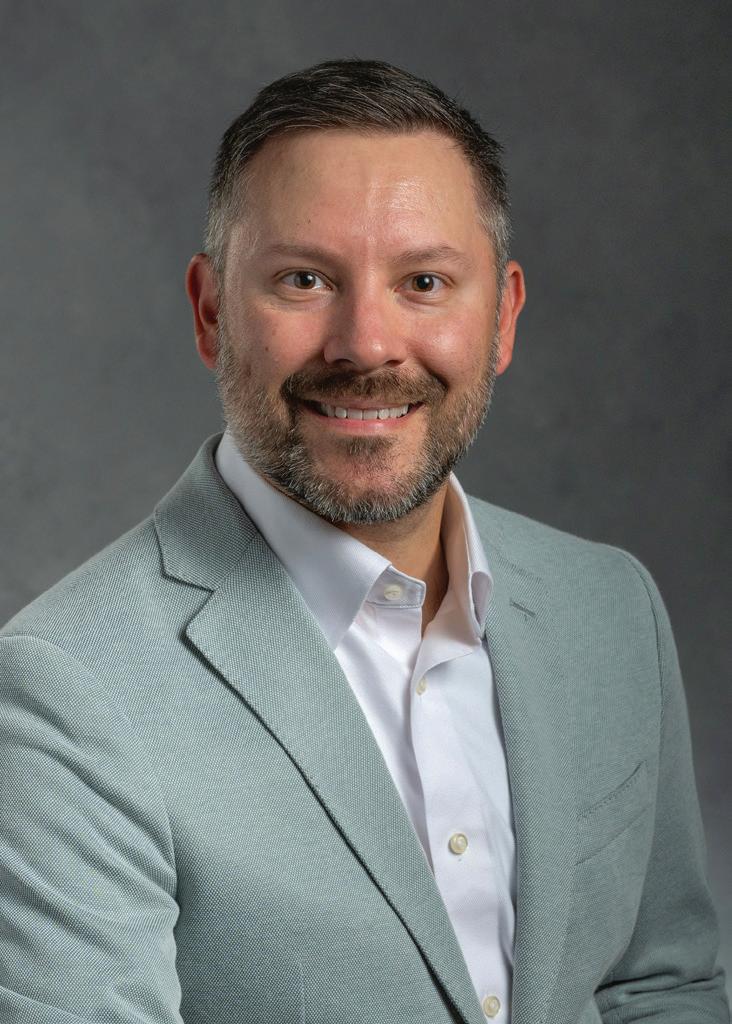
nitely more ready and able to adapt than they used to be.”
Rothwell and Price say drones, which are becoming both easier to use and less expensive, can provide considerable time (and therefore cost) savings.
“Instead of huffing it up and down the rows in all of these different orchards, you could just send a flyover drone and say, ‘Okay, here you have an infestation of this bug, or boy, this disease looks bad here,’” she said. “Instead of someone taking two to three hours to walk through an orchard, you could get the same information in a 20-minute drone flyover.”

with a conversation. Look to your local,
commercial banking team, who work and live here, and understand our local economy is

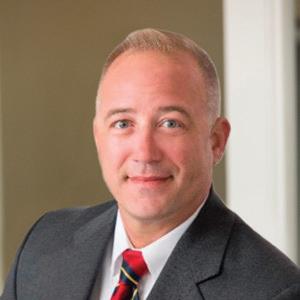
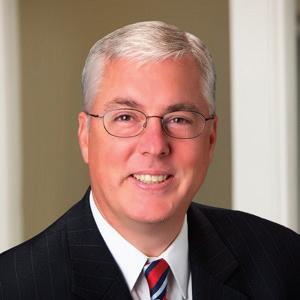
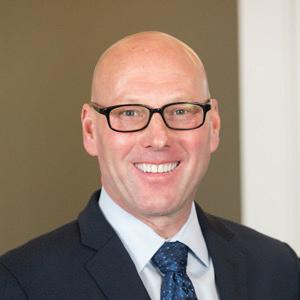
Michael Caruso
SVP Commercial Banking
231.941.6303
mcaruso@nicoletbank.com
John Galbraith
VP Commercial Banking
231.632.9331
jgalbraith@nicoletbank.com
Jeremy Harnish
SVP Commercial Banking Manager
231.941.6306
jharnish@nicoletbank.com
Andrew Sabatine
SVP Commercial Banking
231.941.6301
asabatine@nicoletbank.com












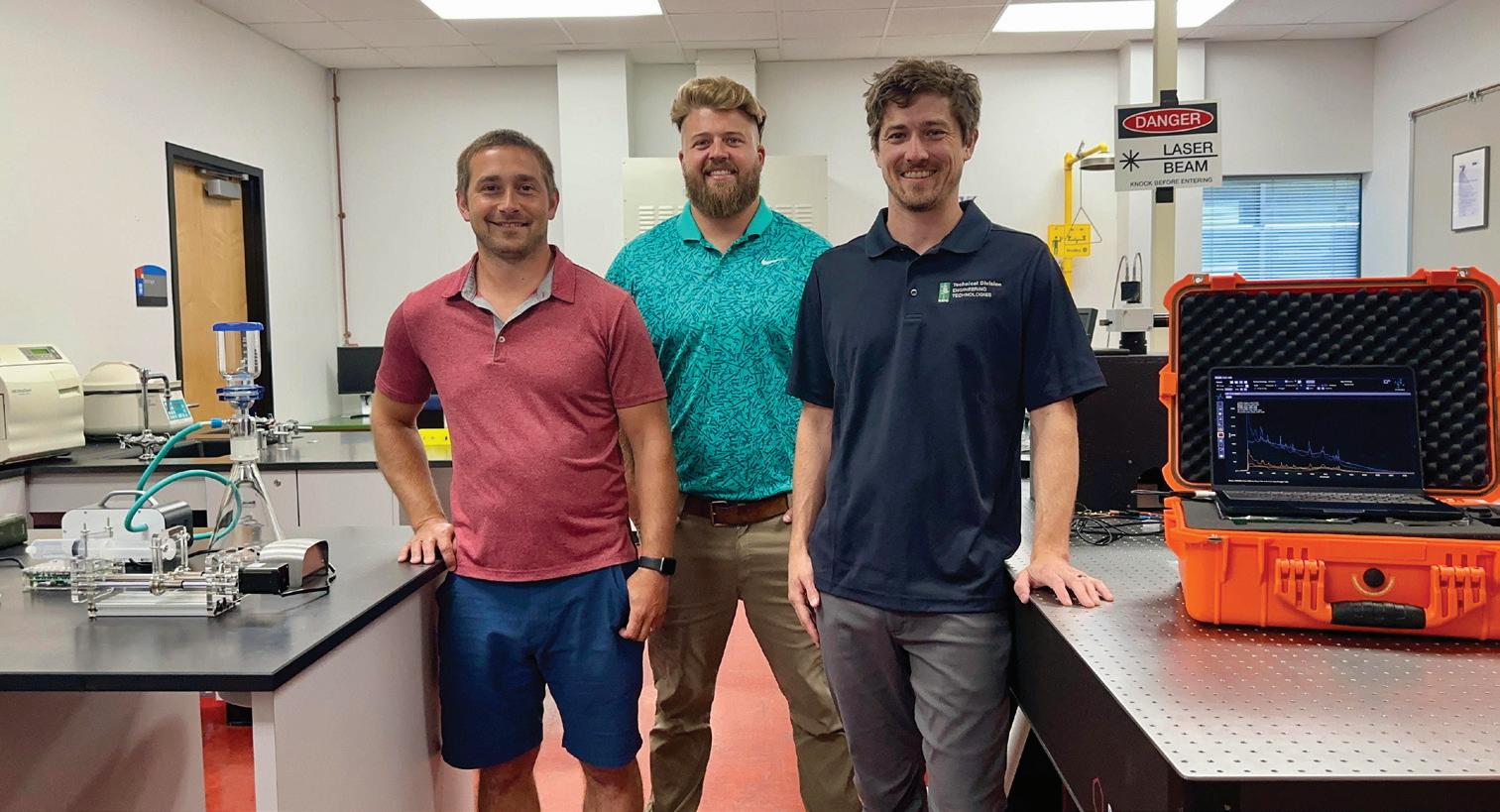
By Kierstin Gunsberg
PFAS, man-made chemicals known as toxic “forever chemicals,” have contaminated the Great Lakes. This is alarming news for the more than 30 million people in the U.S. and Canada who rely on these lakes for drinking water.
Wave Lumina, a new tech startup in Traverse City, hopes to make testing for PFAS quicker and easier, speeding up their removal. The company’s tight-knit team of three is developing a contaminant field screening device (CFSD) – a portable system that can test water for the presence of PFAS on-site.
Vernon LaLone, Wave Lumina’s managing director and co-founder, says that remediation of PFAS is critical since consuming contaminated water can cause a buildup of toxins in the bloodstream, increasing the risk of thyroid disorders, cancer and other health issues in humans.
“The first step in addressing this problem is figuring out where these chemicals are,” said LaLone.
It’s not a simple task. Targeting exactly where PFAS might be present is like playing Pin the Tail on the Donkey. While certain places are high-potential contamination sites, like airports where PFAS-laden firefighting foam is used, other areas can be trickier to pinpoint. Detecting how far the chemicals have leached into the environment adds another layer of complexity. Waiting on test results further complicates the process.
“That’s what we’re focused on creating a solution for. There’s a big problem and there’s a need for testing right now,” LaLone explained.
It can take environmental engineers anywhere from two to 12 weeks to get results, which not only increases project costs but also slows down remediation.
“It’s a bottleneck in actually cleaning up the environment, which is closely linked to our water supply,” he said.
Once finished, Wave Lumina’s CFSD,
which uses advanced signal processing and AI to detect PFAS levels in water samples, could quickly pull and test samples from all over a suspected contamination site instead of focusing on, and waiting for results from, a limited section. While the United States Environmental Protection Agency will still require positive samples to be confirmed by an official lab test, the CFSD would drastically reduce the time needed to determine where cleanup is required.
The environmental and health impact of this kind of device would be high, but so is the cost and the level of time and research required to bring it from concept to reality. That explains why the technology isn’t already available, though other companies and researchers around the globe are also working to bring their own portable PFAS testing devices to market. Wave Lumina’s current goal is to get the CFSD into pilot programs and studies.
LaLone said as they work toward that, community support and partnerships with Northwestern Michigan College and its Office of Possibilities, among other local organizations and groups, have been instrumental in helping the team build a viable business model.
“Up here, there’s a lot of interest in freshwater research innovation right now,” he noted.
Looking ahead, LaLone envisions a future where Wave Lumina’s technology is key to protecting the environment.
“In five years, I imagine that somebody will have a commercial solution to this problem,” he said. “We are racing to be one of the first to actually have something out there.”
20Fathoms sponsors this column. Designated by the Michigan Economic Development Corporation as the Small Business Support Hub for Northwest Michigan, 20Fathoms is a nonprofit organization providing critical services for the region’s entrepreneurs. It specializes in accelerating the growth of innovative and scalable startups. Learn more at 20Fathoms.org.


CLIENT: Fresh Coast Market
PROJECT: Speciality Market & Deli
SERVICES: Selling Broker - Commercial Property & Retail Business






By Chris Wendel
My search for a business book to review can go in many directions. One source is the New York Times Business Best Seller list, which tends to have the same books listed for months in a row. A new entry piqued my interest when it recently appeared on this list.
The book “Love & Whiskey” began when its author Fawn Weaver read a New York Times article mentioning a former slave named Nearest Green, who taught the distiller Jack Daniel how to make whiskey. Weaver, traveling in Singapore at the time, took immediate note of the story and eventually traveled to Lynchburg, Tennessee, the home of Jack Daniel. She was interested in both Green’s exact role with Daniel’s whiskey-making process and how the present-day company was presenting Green’s contributions to its origin story. When Weaver, a businesswoman and entrepreneur based in Los Angeles, made it to Lynchburg, she began by researching what she could find about Nearest Green’s family tree. She found more questions than answers, including several different names and birthdays for Green.
Working with incomplete census records that lacked information on former slave families prior to and after the Civil War, Weaver scoured library and church archives and then interviewed many of Nearest Green’s relatives. With the family’s help she pieced together a congruent history and clarified Green’s role with directing Jack Daniel with his whiskey-making. With many slaves bringing their own traditions of distilling alcohol from Africa, going back many generations, it made sense that Green introduced to Daniel a charcoal distilling process that became part of the popular Jack Daniel’s brand.
During subsequent trips to Lynchburg, Weaver realized her affinity to the area, its history and people. Tracing the Green family’s roots, she also uncovered a strong community built around the distillery, where white and black people worked together more closely than in other parts of the South. What she first thought was a book project became more complicated when Weaver and her husband, Keith, purchased the farm property where Nearest Green and Jack Daniel whiskey began their distilling production.
Weaver brought Nearest Green’s relatives together several times before one celebratory meeting when she unveiled a well-developed family tree. At that point she asked the family what they wanted to do next. Many of the fifth-generation Green relatives worked for Jack Daniel’s, and most wanted Nearest Green’s story to be truly recognized as a pivotal part of the Jack Daniel’s public-facing history. Others mentioned that there should be a separate Nearest branded whiskey made, either


The Remarkable Story of Jack Daniel, His Master Distiller, Nearest Green, and the Improbable Rise of Uncle Nearest
By Fawn Weaver
as part of the Jack Daniel’s corporation or independently by someone else.
The complicated relationship with Brown-Forman, the holding company for Jack Daniel’s, is a big part of Weaver’s narrative. Over time Brown-Forman minimized the role of Nearest Green, where he was barely a footnote in the story the company portrayed to the public. Fawn and Keith Weaver worked together to negotiate with Brown-Forman for recognition of Green’s prominent role but the company was slow to respond in a substantial way. Things got interesting when Fawn and Keith Weaver decided to move forward with gathered investors on the family’s idea of building a separate “Uncle Nearest” brand and facility in nearby Shelbyville.
“Love & Whiskey” is a history book, a marketing book, and a business primer, rolled up into one incredibly enjoyable experience. It’s also an entertaining case study for starting a business, navigating through a perilous competitive situation, and mass marketing a product that has no previous track record. It’s hard for readers not to be drawn into “Love & Whiskey” as it unfolds. Weaver’s assertive, positive attitude is infectious. Most of all, she demonstrates why being successful often starts with being able to tell a good story.
Chris Wendel works for Northern Initiatives, a mission-based lending organization based in Marquette, Michigan. Northern Initiatives provides funding to businesses throughout Michigan and online business resources through its Initiate program to small business owners throughout the United States. Wendel lives and works in Traverse City.










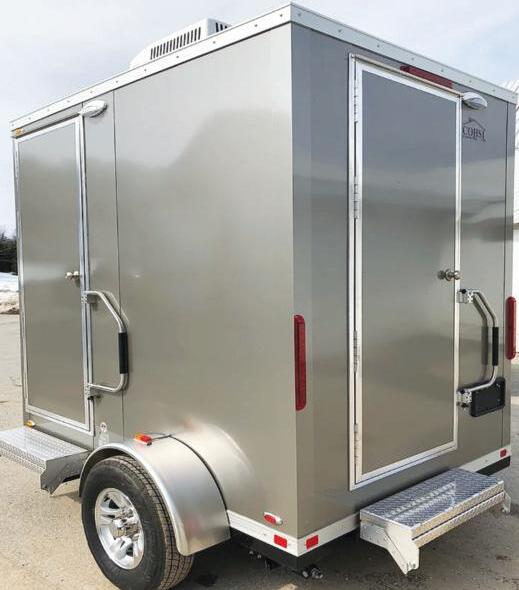


Crisis Intervention Services
• 24/7 Crisis Line 833-295-0616
• Crisis Welcoming Center, 105 Hall Street, Traverse City, 8A-5P, M-F
• Mobile Crisis Teams for Adults and Children
• Coming later in 2024: Grand Traverse Center for Mental Wellness
Kandu Island Drop-In Center – a safe place to be, on S. Garfield.
• Psychiatry
• Therapy
• Counseling
• Case Management
• Autism Applied Behavioral Analysis
• Specialized Residential Services
• Long-term Services and Support
• Traverse House & Club Cadillac Clubhouses






A dividend is a portion of a company’s profit that’s paid to shareholders. That means dividend-paying stocks may provide a source of income. But they can also carry some degree of risk.
Transitioning your family business to your heirs may sound simple enough, but in fact, doing it successfully can prove difficult. To help improve your transition’s chances for success, consider family business governance.
So, what do investors need to consider when it comes to dividend-paying stocks? In this Q&A, Austin Pickle, senior wealth investment solutions analyst with Wells Fargo Investment Institute, provides important information for investors to keep in mind.
This is a system of correlated tools and actions to support the next generation with controlling, owning, and operating the business. It also puts in place a framework that contains business protocols, describes how future ownership changes occur, and establishes a precedent for making business decisions.
1. What are the potential benefits of dividend-paying stocks?
Frequently used tools
“One of the big benefits is that these stocks may provide a more reliable income stream compared to some other investment options,” Pickle says.
There are several tools that can be employed as part of a family business governance system, including:
Companies tend to issue dividends on a routine basis, such as quarterly or semi-annually, which may create a dependable income stream. Another benefit? The stocks can yield some favorable tax treatment.
A buy-sell agreement is a legally binding contract that stipulates how an owner’s share of a business may be reassigned if triggering events occur, the price that will be paid, and the payment structure.
A family employment policy document can be kept within the family for private use or incorporated into the business’s human resource documentation. It sets expectations for heirs, spouses, and extended family members about such issues as how they can obtain employment in the business, the requirements to attain key positions, the compensation standards to be used, and incentive language for family members.
“It’s going to depend on your tax situation,” Pickle says, “but in general, you may have a relatively lower tax rate for dividends compared to income gained by selling investments.” As long as the dividend-paying stock meets IRS requirements for a qualified dividend, the dividend is taxed at the lower long-term capital gains tax rate instead of being taxed as regular capital gains income. “So an investor could receive income from a dividend-paying stock without selling the stock and have a lower tax bill compared to that of a non-dividend-paying stock, which must be sold to receive income,” he says.
A distribution or dividend policy is key in setting expectations with family members regarding what distributions they should expect to receive from the business. Business owners must balance the need for cash to maintain or grow the business with the desire to receive distributions.
2. Who should include dividend-paying stocks in their portfolio?
Many types of investors have the potential to benefit from dividend-paying stocks. “But these stocks may be more valuable for investors who are a bit older — maybe those in retirement or close to retirement who really value a more reliable income stream,” Pickle says. “I think they’re typically beneficial from a diversification perspective, especially when interest rates are low. Dividend-paying stocks tend to have an inverse relationship with interest rates: When interest rates go down, you may see some of these dividend-paying stocks perform better.”
A professional board of directors is a governing body that helps oversee the business and makes major decisions. A board generally comprises three, five, or seven professionals from various industries that have the subject matter expertise to assist the company strategically.
A family board or council is a group within the family — or may include the entire family — that comes together to make decisions about the business on the family’s behalf.
A company mission statement can be valuable to your employees and your family as it addresses the business’s purpose and vision and can help guide future company leaders.
3. What are the risks associated with dividend-paying stocks?
“Firms can reduce or cancel their dividends — especially during times of economic uncertainty and times of crisis,” says Pickle. “And there’s still the risk that dividends could be cut periodically, even without the trigger of a crisis event. And if tax rates change, it could mean you’d pay more, as well.”
Your estate plan can address ownership, control, distributions, and several other factors.
The business’s governing documents should be reviewed at the same time the family business governance system and tools are put in place. Revisions to these documents or corporate resolutions stored in the corporate minutes may be needed to align these documents with the company’s governance system.
Helping ensure a successful transition
Explore your options with professional advisors
Transitioning the family business to the next generation is much more than transitioning shares. A well-thought-out and documented plan that addresses ownership, control, and operations helps build a strong governance system for your business. This system, combined with communication with the next generation, can be key to helping ensure your transition’s success.
Pickle stresses that investors should discuss the pros and cons of dividend-paying stocks with a financial advisor to help make sure they fill a need within an individual investment portfolio and make sense for a specific financial situation.
“You should also talk to your CPA or tax professional to make sure that you understand what the tax consequences are for your particular situation,” he advises.
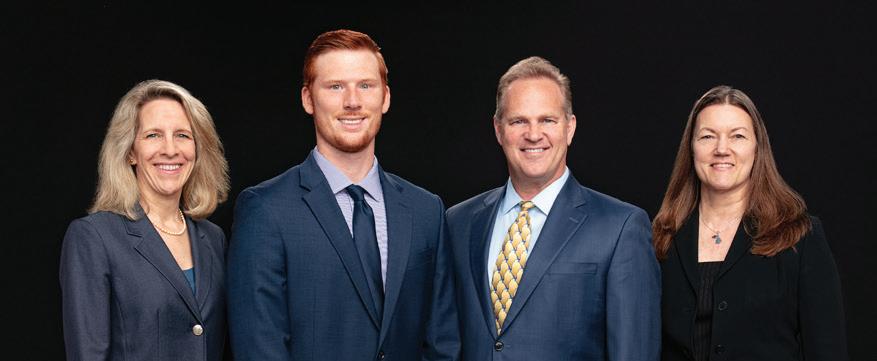
JULIAN | BLACK Wealth Management Group of Wells Fargo Advisors


Whether it’s more comfort, more features, more wave options, or just more performance . . . MasterCraft is pushing the boundaries to deliver moments that make life extraordinary.
Find your dream MasterCraft at Action Water Sports of Traverse City or online at actionwater.com.

By Tessa Lighty, columnist
There’s nothing more frustrating than walking into a store knowing exactly what you need and being bombarded by salespeople trying to push their agenda on you. On the other hand … when you’re struggling to find the right product and a salesperson truly helps you, there’s no better feeling.
When marketing a business in 2025, you’re expected to anticipate and meet your customer’s needs seamlessly to increase sales. To do this well, and to keep customers coming back, your marketing should not only promote your business or organization but also deliver value.
While marketers navigate perpetually morphing algorithms, trends and platforms, you can rest easy knowing that building your marketing strategy around delivering value to your audience will always help build brand loyalty and generate leads – whatever the trend du jour.
Because of privacy concerns and laws that impact how websites collect user information, Google announced years ago that in 2024 it would remove third-party data collection (website cookies that track a user’s behavior for better ad targeting). In July of this year, they reversed course, saying users can select how they want their data collected (or not) at the browser level.
However, marketers had already adjusted their strategy to prioritize first-party data in preparation of the change, and it has benefits that can’t be ignored.
Regardless of where your business operates (online, in-store or a home service), your website is your digital storefront, and it needs to speak to a wide audience and be usable by everyone. Having an accessible, user-friendly website opens the door to new customers, making it easy to gather first-party customer data.
If you’re interested in getting started collecting user data for your marketing efforts, email marketing is a beginner-friendly, first-party data strategy. To build an email list, offer digital content to your website visitors – whether that’s a regular newsletter, sales or useful downloads like a checklist.
Once you’ve collected email addresses, you can send helpful information directly to your target customers’ inboxes. That’s

the value of first-party data – and how first-party data can help you offer value to your customers.
Regardless of the habits you’ve formed for finding information online, many users’ search habits are changing. With AI overviews, more interactive elements keeping users on Google, and TikTok’s surging popularity, marketers are adapting to a new normal of online information-finding.
This year, two-thirds of Gen Z and nearly 40% of people online are using TikTok to discover information, with its popularity growing every day. Recent research from Reddit shows that many users are following their TikTok discovery with a traditional Google search. If your business is still absent from TikTok, I hope you’re at least creating short-form videos to feed that audience’s desire.
And, like TikTok, when it comes to AI overviews on search engine results pages (SERP), AI is impacting customer behavior – and businesses need to adapt or they will get left behind.
At Oneupweb, we often field questions about optimization techniques for AI overviews on the SERP. Ultimately it comes down to the same thing we always recommend: creating good content (for
social and your website) based on human experience that meets a user’s needs. This concept works for creating engagement-worthy TikTok videos, too.
Find out and focus on what works, stop what doesn’t, outsource when you can and optimize everything.
By now you’ve hopefully noticed the common theme in these: Putting the customer’s wants and needs at the front of your marketing will set you up for success.
Providing users with what they’re looking for also builds brand loyalty and a sense of community. And, prioritizing the user experience and accessibility throughout all your digital content means an easy path to purchase for everyone.
At Oneupweb, we’re big champions of an accessible, user-friendly web. Putting
the user first only leads to more sales. The only downside to a more accessible or user-friendly website is the cost it takes to overhaul your current system.
If you’re not ready for a new website experience, start prioritizing the user’s needs by creating new personas, digging deep into what makes them purchase (or not), and adjusting your marketing to speak to their pain points. You won’t regret it.
While it may seem like these 2025 marketing strategies rely on capitalizing on new trends, good marketing has always been about delivering value to a customer and encouraging brand loyalty and repeat purchases.
Despite changes to the SERP, advancements in AI and the impact of short-form video on user behavior, the key takeaway is to focus on delivering value.
As for the individual strategies, just remember there are a million routes to take. Find out and focus on what works, stop what doesn’t, outsource when you can and optimize everything. You’ll be there to meet your target customer’s needs when they’re ready.
Tessa Lighty is the brand manager at Oneupweb in Traverse City.



















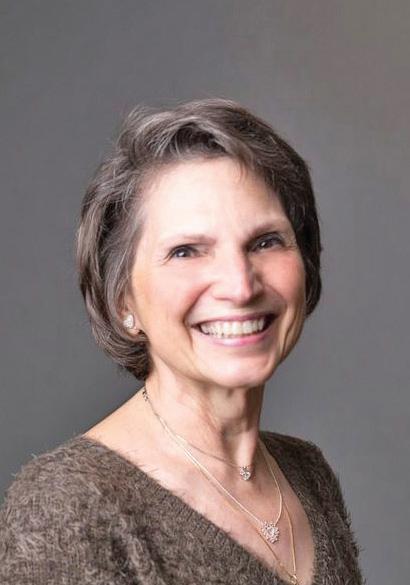
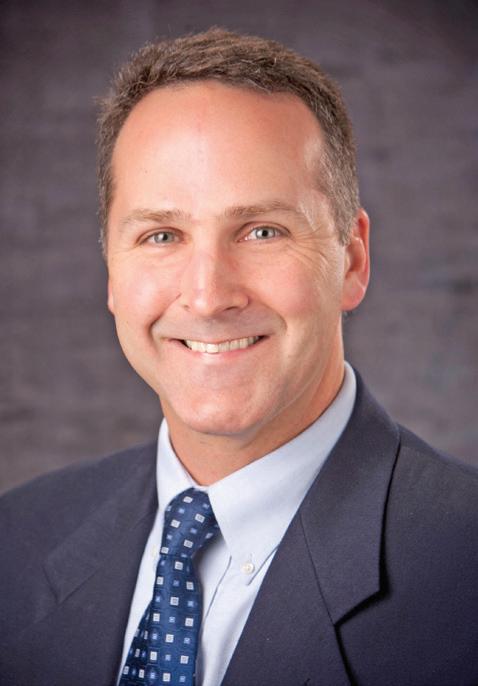
Bank announces the following personnel news:
1 - Com mercial lender Max Anderson has been promoted to vice president. Anderson joined the bank in 2018 as a banking center manager in Traverse City. He was promoted to assistant vice president in 2019 and moved into a commercial lending role in early 2020.
2 - Shannon Jordan, senior vice president and CFO, has graduated from the American Bankers Association Stonier Graduate School of Banking, earning both a Stonier diploma and a Wharton Leadership Certificate.
3 - Commercial lender Cindy Ockert has been promoted to vice president. Ockert joined the bank in 2006 as a teller. She was later promoted to assistant branch manager and then assistant vice president, branch manager. She moved into a commercial lending role in 2018.
4 - Pracilla Venhuizen , assistant vice president and human resources manager, has attained the Society for Human Resource Management Certified Professional certification.
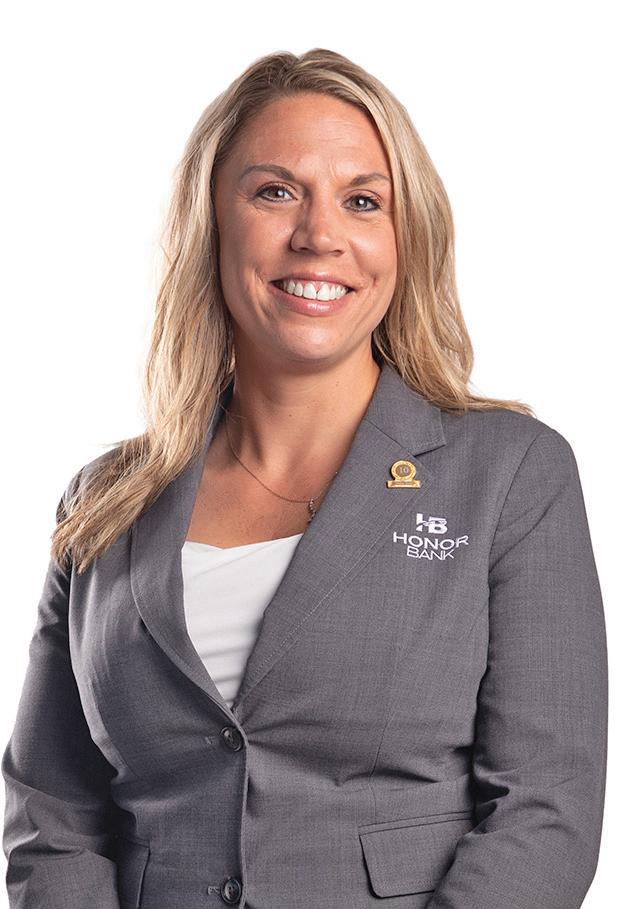







5 - Jamie Barnwell, D.O ., has joined Munson Healthcare Foster Family Primary Care in Traverse City. Barnwell’s special interests include lifestyle medicine, women’s health and pediatrics.
6 - Neil Klinger, M.D. , has joined Munson Neurosurgery in Traverse City. Dr. Klinger brings a specific interest in treating disorders of the spine with minimally invasive techniques.
7 - Anne Pawlak, D.O. , has joined Munson Healthcare Neurology in Traverse City. Dr. Pawlak brings a deep passion for empowering patients with education about their health to her practice.
8 - Thomas Schermerhorn, M.D ., a neurosurgeon at Munson Healthcare, has been named chief medical officer of Munson Medical Center (MMC). Schermerhorn brings more than 26 years of expertise to the role, most recently as attending neurosurgeon and section chief at MMC. He replaces Walt Noble, M.D., who recently retired after 35 years at MMC and served as chief medical officer since 2020.
9 - David Simpson, D.O. , has joined Munson Health Neurology in Traverse City, specializing in neurology and neuromuscular disease.
>> NONPROFIT
10 - Laura Mains has joined National Alliance on Mental Illness-Grand Traverse (NAMI) as resource navigator. Prior to joining NAMI, she worked as a caseworker for the Grand Traverse Band of Ottawa and Chippewa Indians.
11 - Kayla Stiglich has been named communications and Ending the Silence (ETS) coordinator at NAMIGrand Traverse. Stiglich joined the organization in early 2024.
12 - Theresa Wangeman has joined Big Brothers Big Sisters of Northwestern Michigan as a mentoring specialist. Wangeman brings more than 30 years of experience in education to her new role and is also a Big Sister with the organization.
20Fathoms in Traverse City announces the following personnel news:
13 - Ellen Miller is the new manager of marketing and communications. Miller brings a background in nonprofit communications, and most recently led communications and strategy for a church and its affiliated community outreach organization.




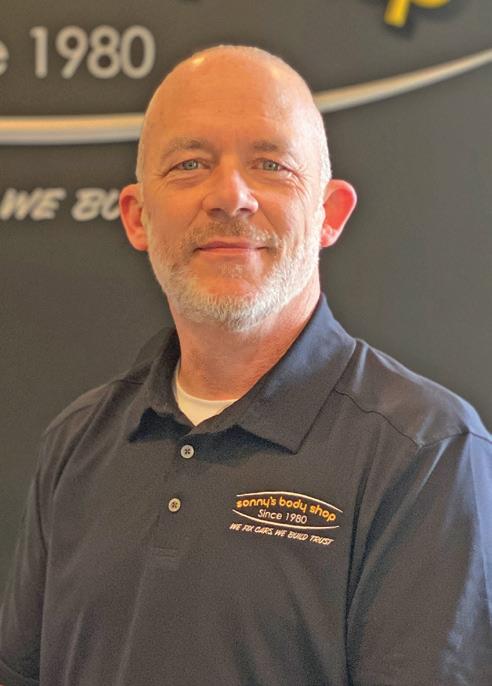
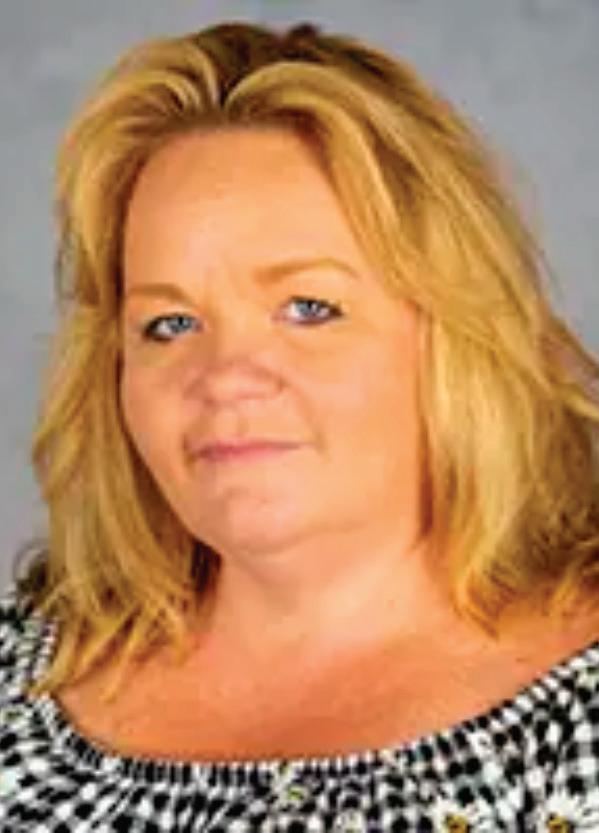
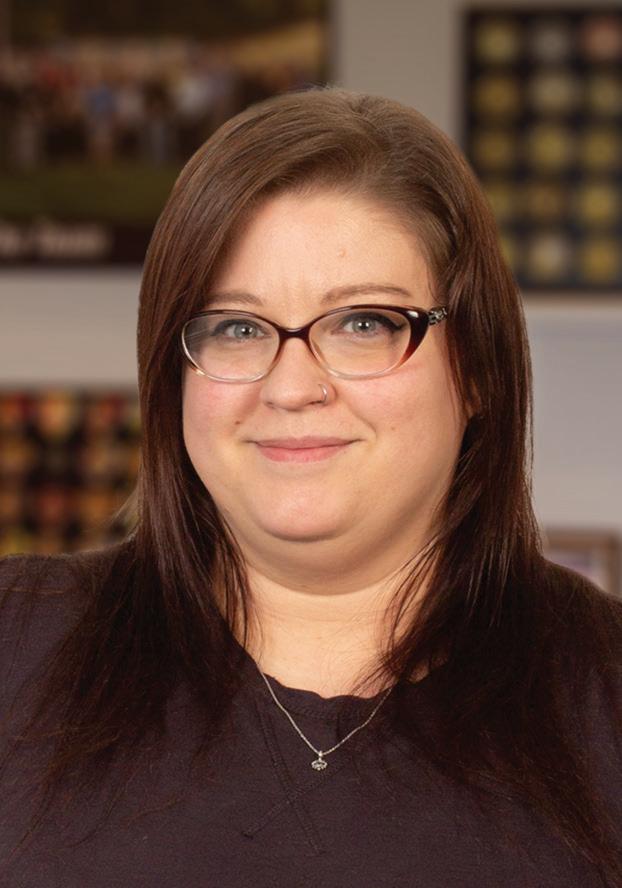

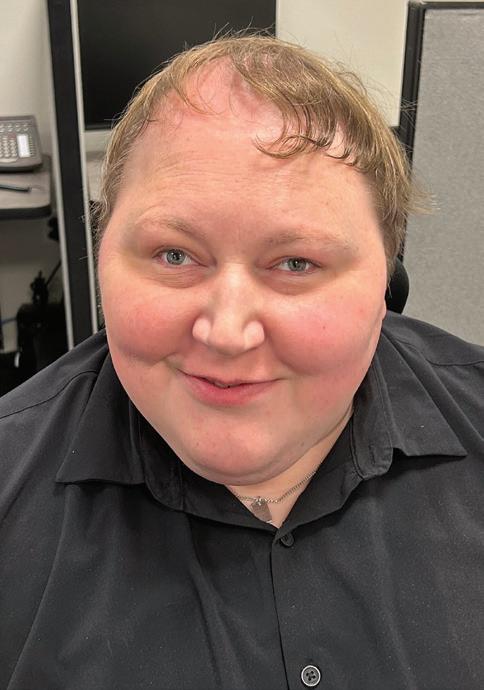

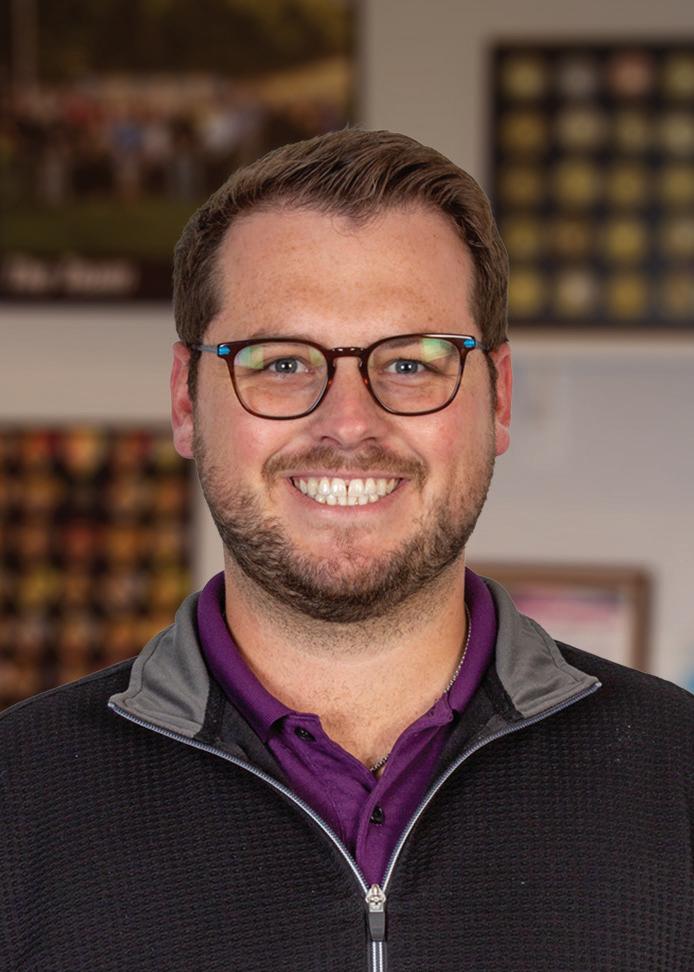
14 - Wes Sovis has joined the organization as manager of development. Sovis has a background in nonprofit development and communications. Prior to joining 20Fathoms, he served as director of development and communications for Traverse City’s Norte Youth Cycling.
15 - Erin Srebinski is manager of startup education. Srebinski has spent her career in the startup world. Most recently, she was an experience strategist at City Innovations, where she supported startups with growth strategy, UX research and strategy, and content strategy.
>> OTHER
16 - Chad Borodychuk has joined Northwoods Hardware, Home, Garden + Nursery in Glen Arbor as general manager, assuming the leadership role from owner Jeff Gietzen. Most recently, Borodychuk was a director with Lansing Community College’s Business & Community Institute, a workforce development organization.
17 - Nate Crosslin has joined Sonny’s Body Shop in Traverse City as an estimator, bringing more than 12 years of experience working with insurance companies.
18 - Shannone Dunlap , director of business development for Traverse City-based Black Diamond Broadcast Group in northern and central Michigan, was recently elected chair of the Michigan Association of Broadcasters board of directors. The association is one of the largest state broadcast associations in the nation, representing more than 300 radio and television stations and more than 3,000 individual broadcasting industry employees.
19 - Meredith Keeler recently joined the sales team at Maxwell Medals & Awards in Traverse City, working in the re-order department.
20 - Todd McMillen , owner of McMillen’s Custom Framing in Traverse City, has earned the Certified Picture Framer designation from the Professional Picture Framers Association. The designation recognizes framers who demonstrate broad knowledge and skills of established professional criteria. McMillen has
operated the store since 1988 and specializes in preservation and decorative framing.
21 - Mike Sincic has joined the team at Williams Chevrolet/Honda/Kia in Traverse City as a business development agent. Sincic comes to Williams with more than 20 years of experience with retail customers and a wide background of experience in telemarketing and customer relationship management.
22 - Renee Sovis , vice president and program officer of Neithercut Philanthropy in Traverse City, recently received advanced training to work with multi-generational family foundations. The new certification comes from 21/64, an organization for philanthropy professionals devoted to incorporating members of the next generation into board service.
23 - Kyle Steffey has joined the sales team at Maxwell Medals & Awards in Traverse City. Steffey specializes in new account acquisition.
Please send Newsmakers by the 10th of the month to news@tcbusinessnews.com
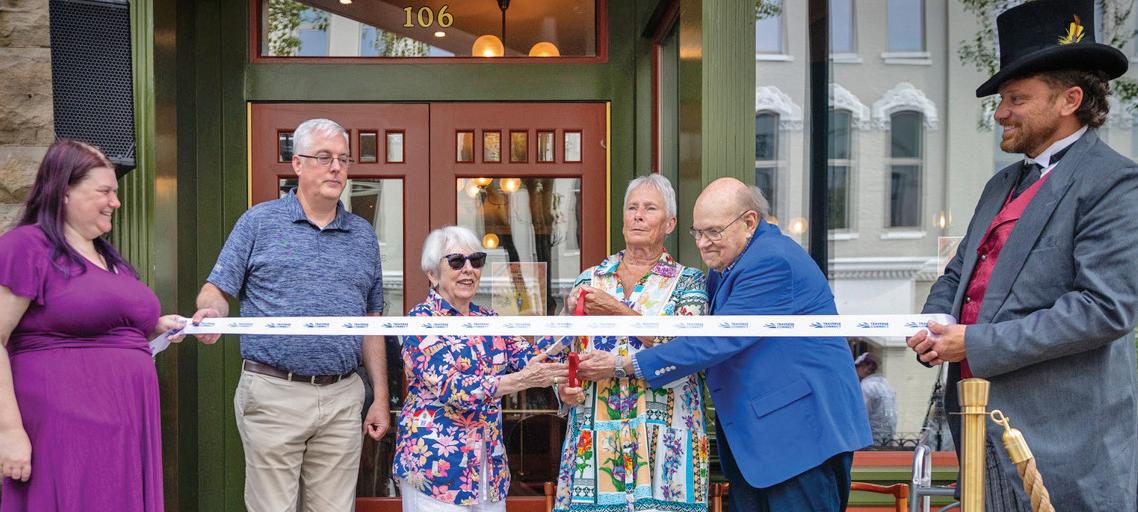

Century 21 Real Estate Agent Meg Zammit, Great Start Collaborative Coordinator Robin Hornkohl, and Great Start Collaborative Family Liaison Lauren Dake at Earthern Ales during Grand Traverse Regional Community Foundation’s Community Happy Hour.


Traverse City Pit Spitters’ “Spit on Cancer Night” presented by Munson Healthcare raised $2,500 for the Munson Healthcare Foundations Cancer Patient Needs fund, which provides financial support for urgent non-medical needs of cancer patients during treatment. Pictured l-r: Monty, the Pit Spitters Mascot; Kathy LaRaia, VP, Oncology and Professional Services, Munson Healthcare; Christi Nowak, System Director, Community Health, Munson Healthcare; Sam Connell, Director of Sales and Promotions, Assistant GM of Traverse City Pit Spitters and Turtle Creek Stadium.
Northern Michigan icon, Terri Ray, has rocked the airwaves since 1984 on KLT The Rock Station As Program Director and creator of the ultra-popular Lunch at the Leetsville Cafe, Terri has built KLT into one of the market’s highest rated radio stations and has kept it there for decades Her passion for radio and commitment to our community are big reasons why
You can see Terri in person this summer as she takes her show on the road with Lunch At The Leetsville LIVE - A look back at four decades of rock & roll in Northern Michigan

















